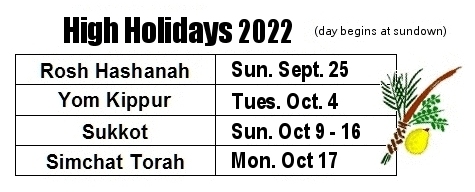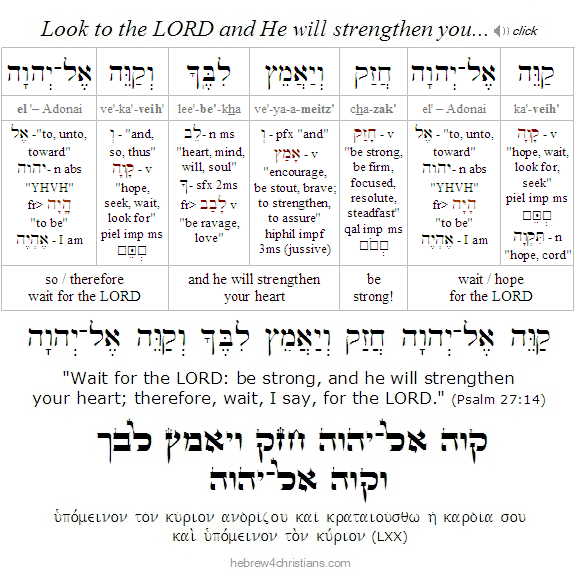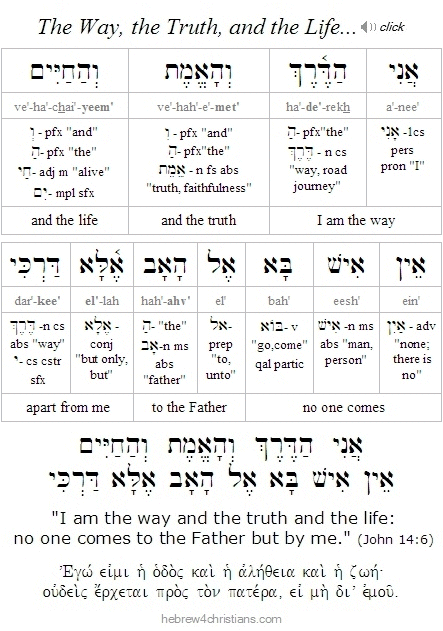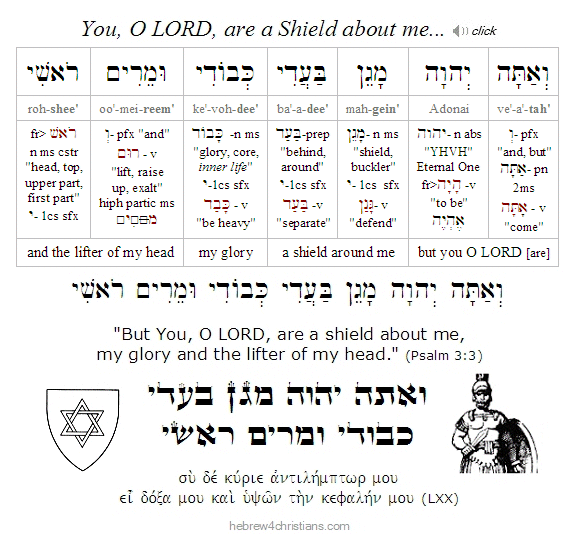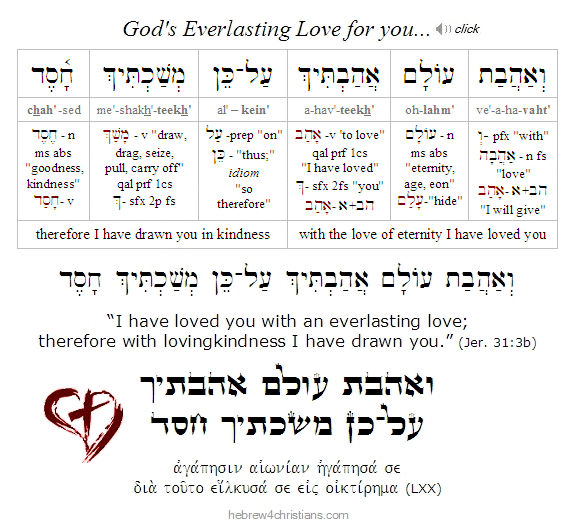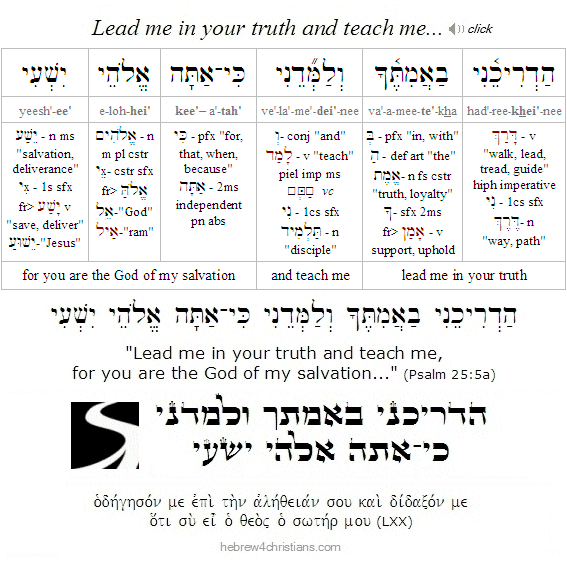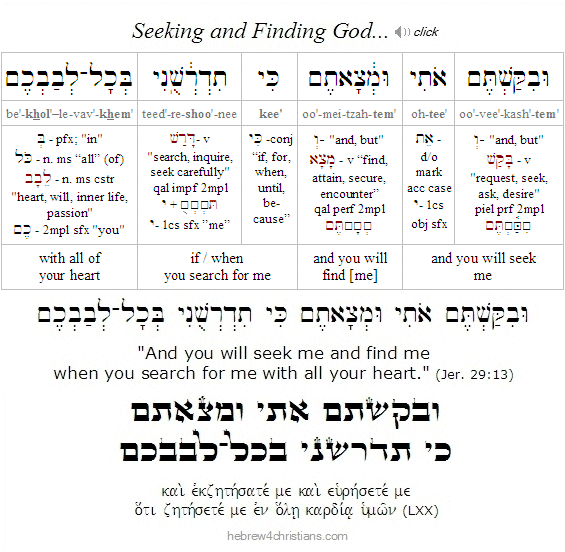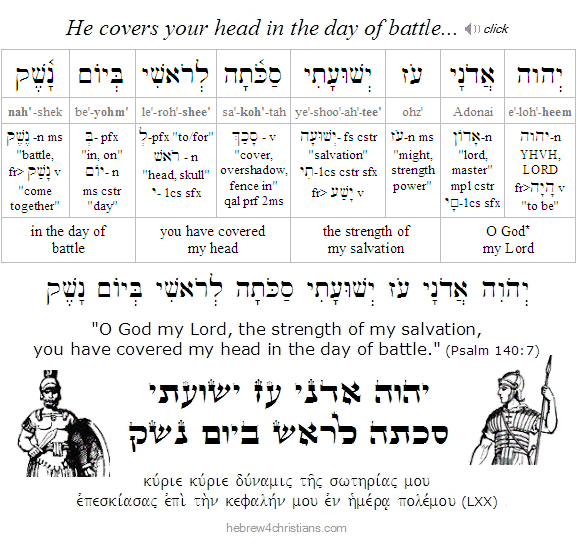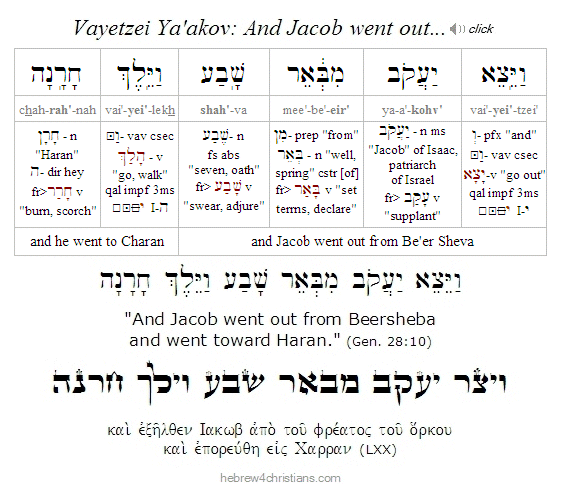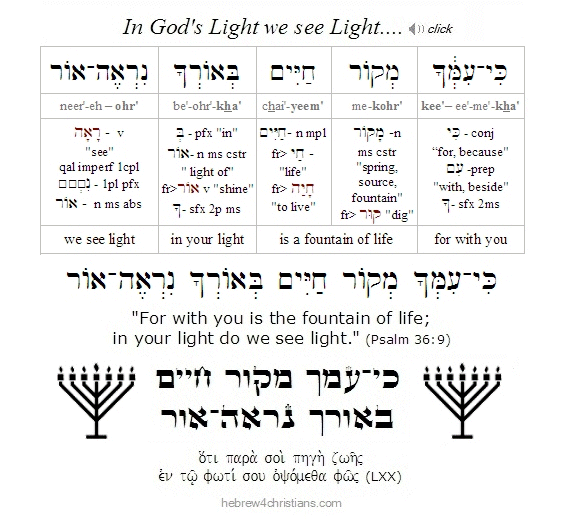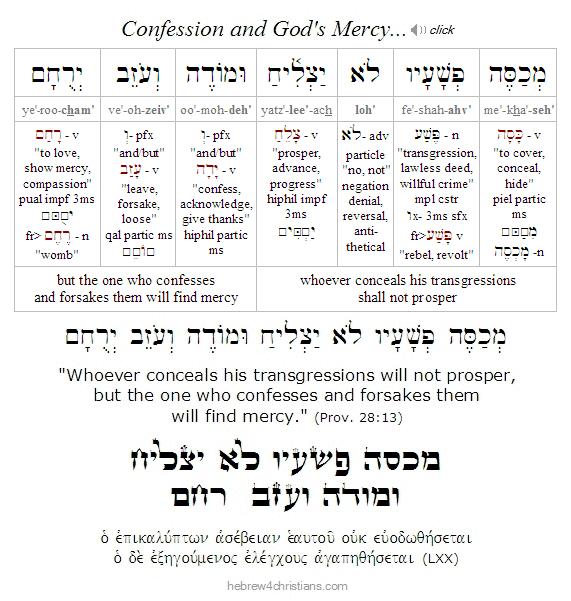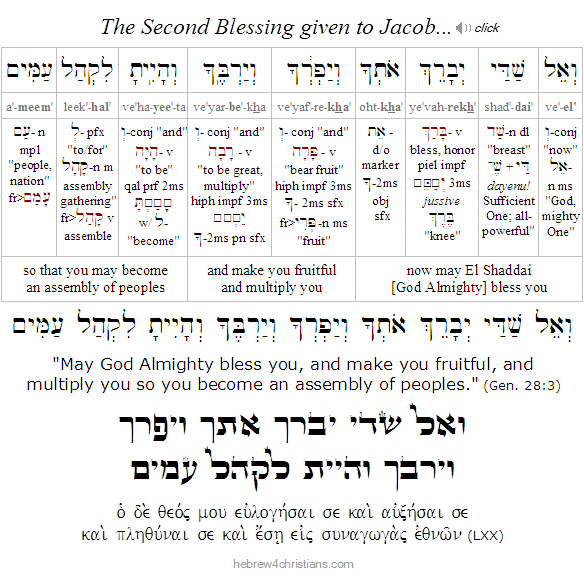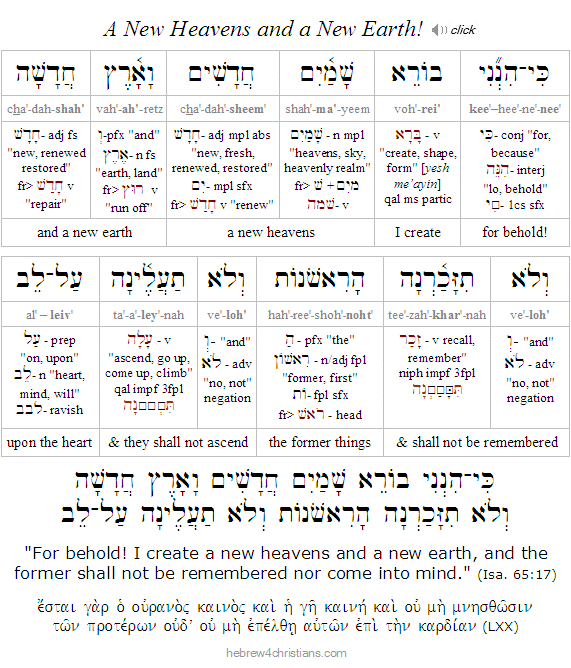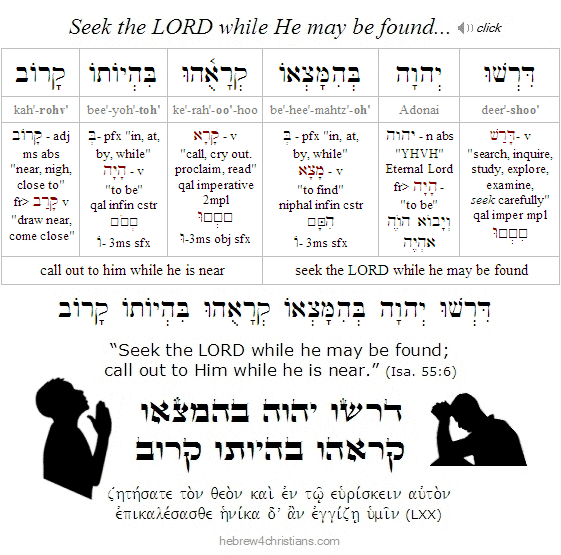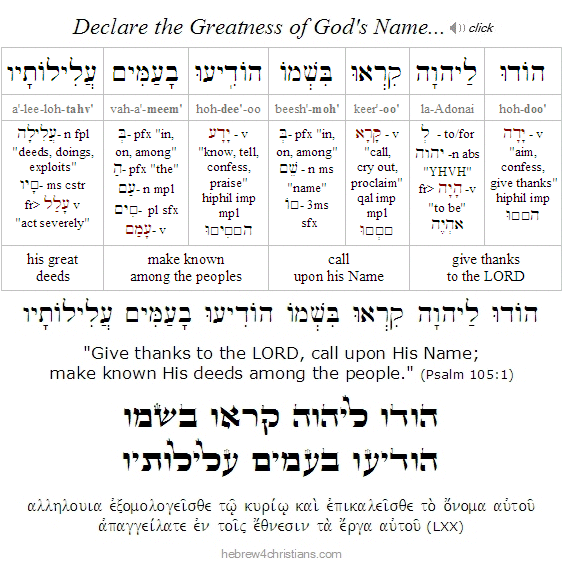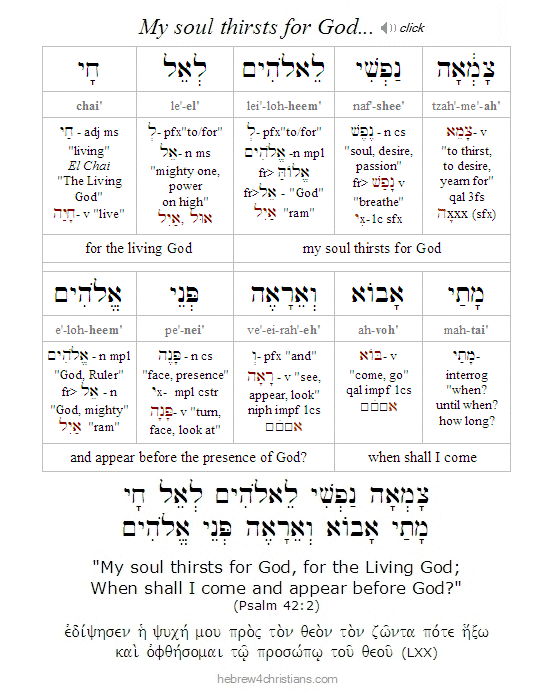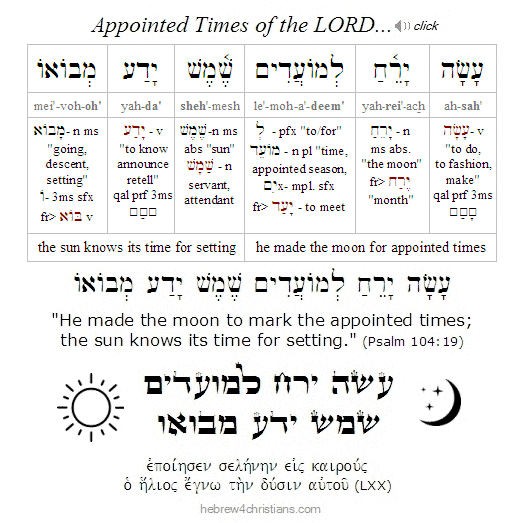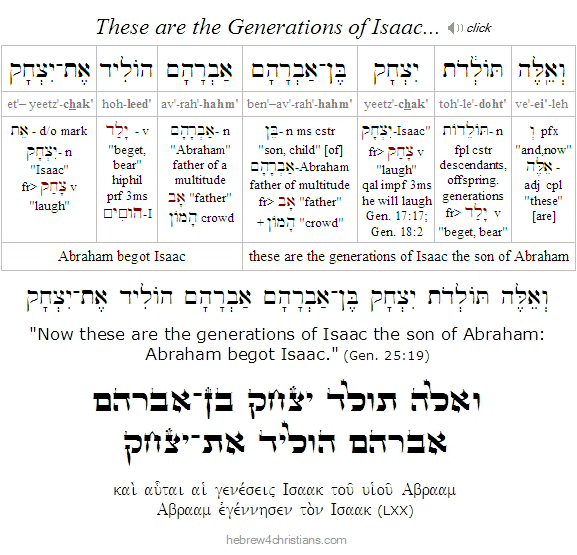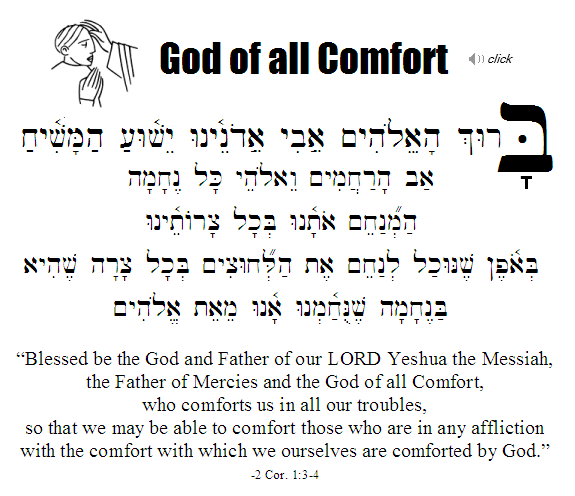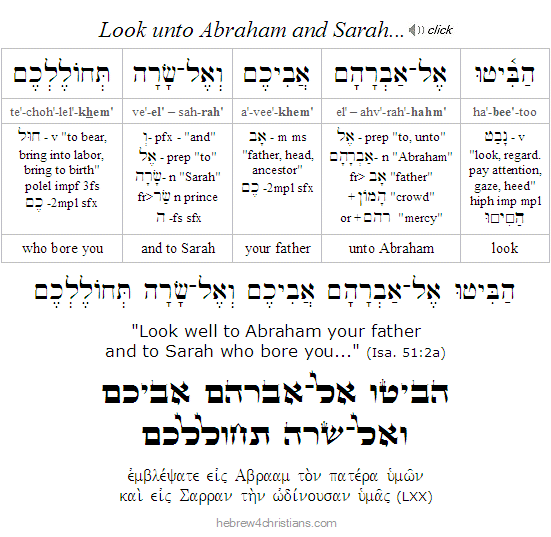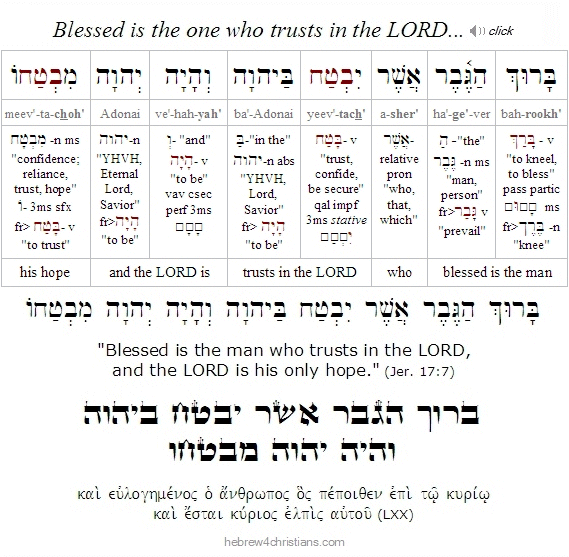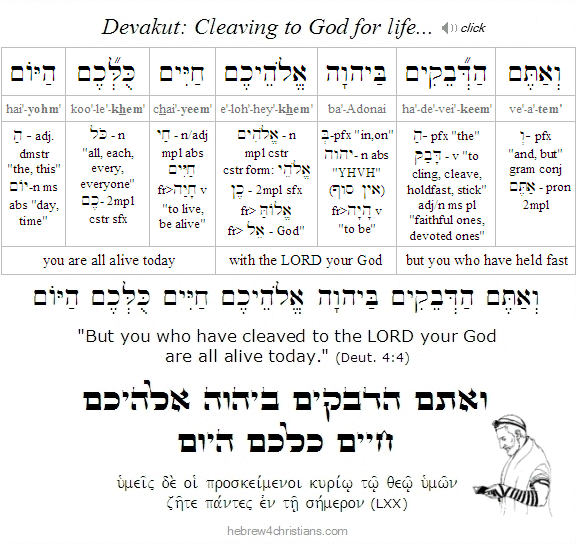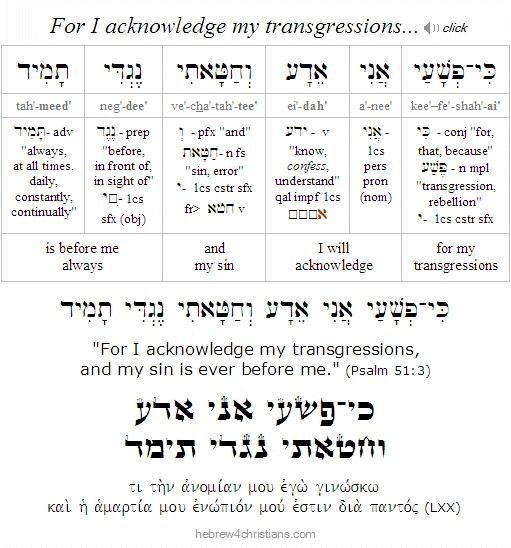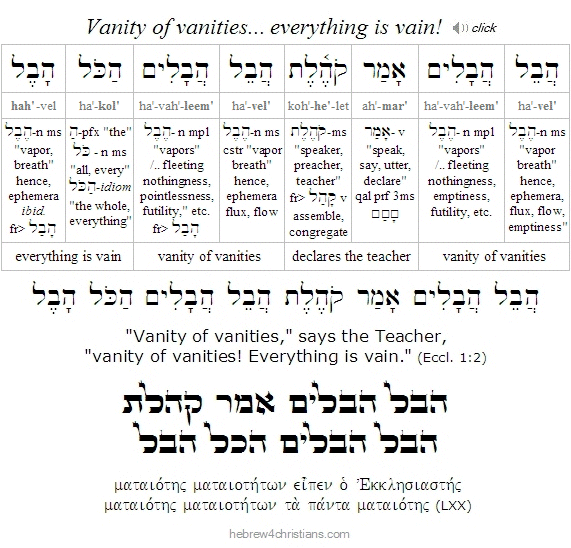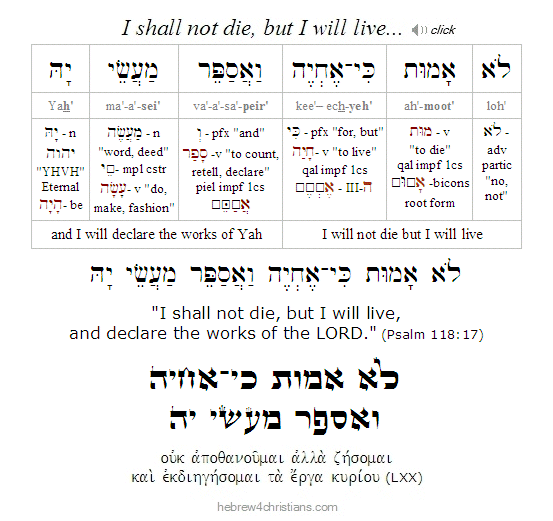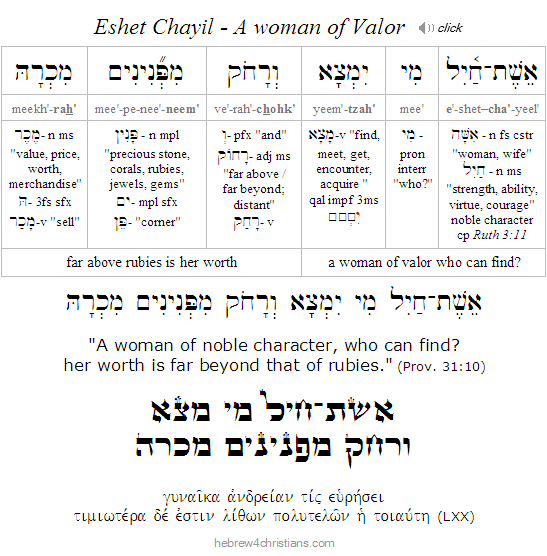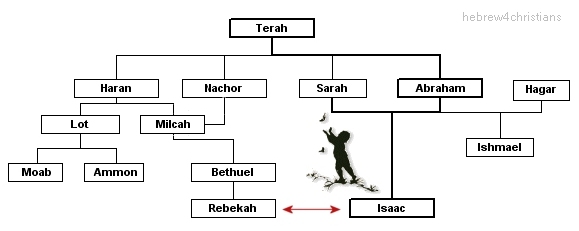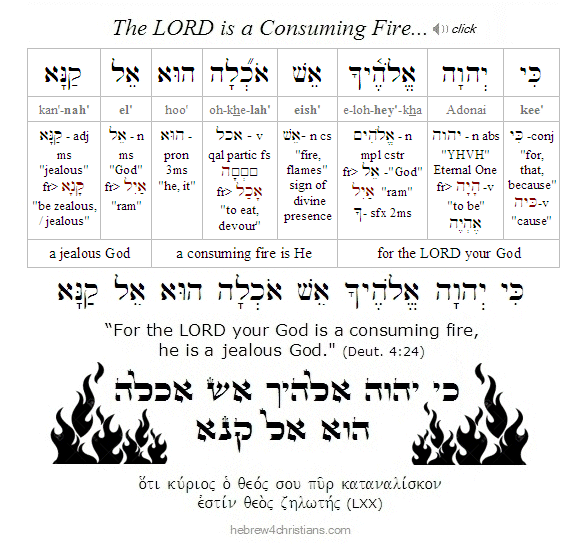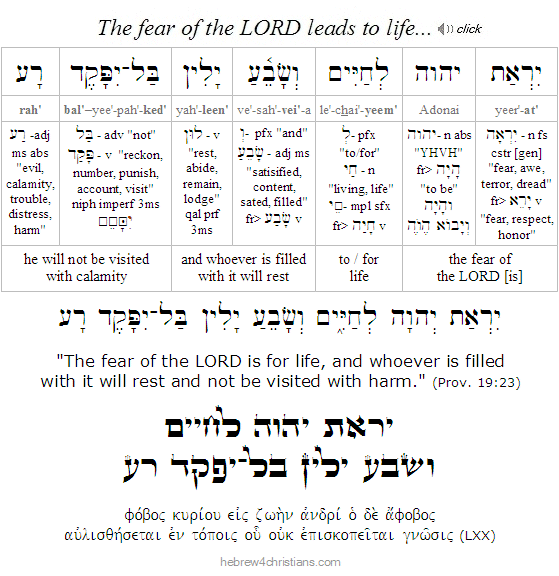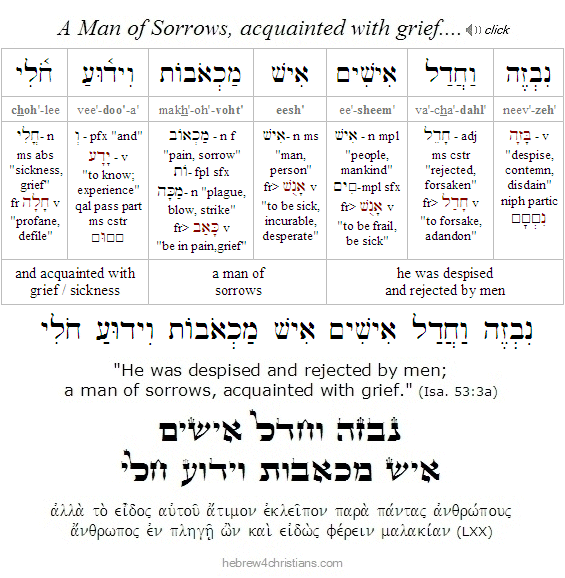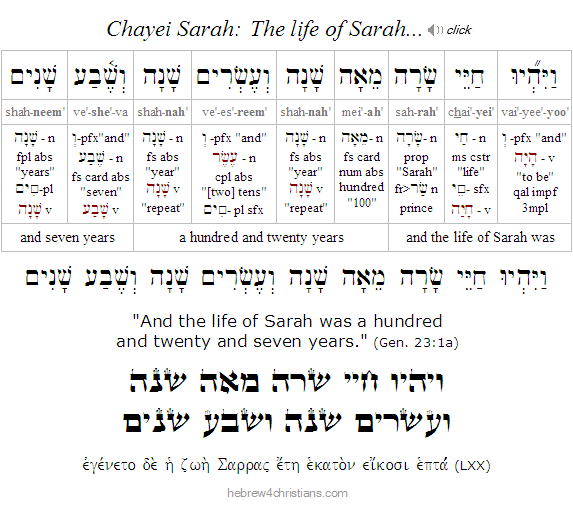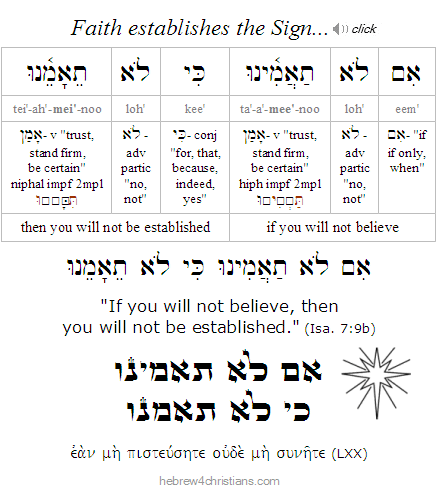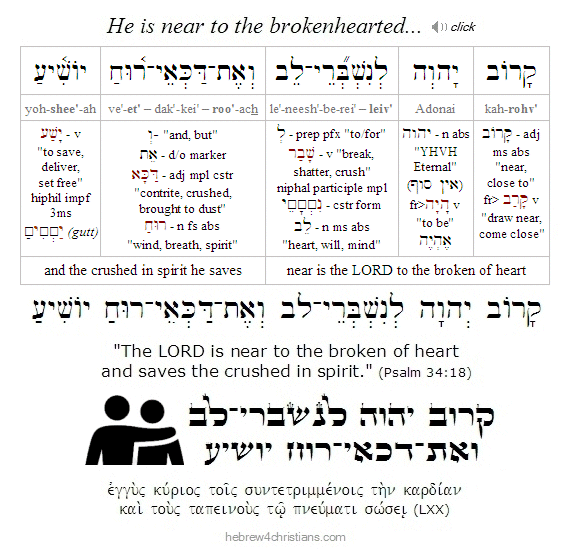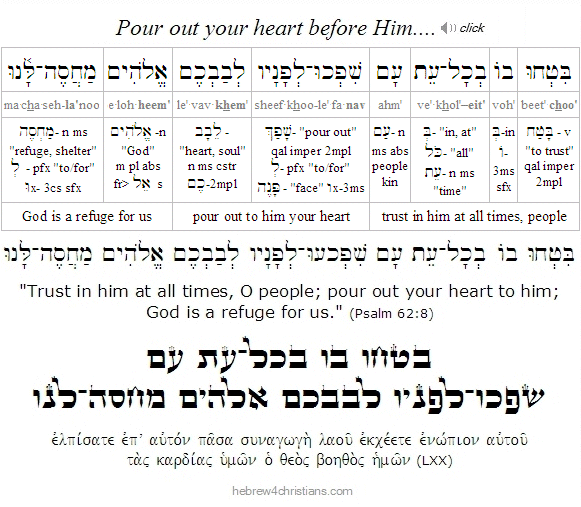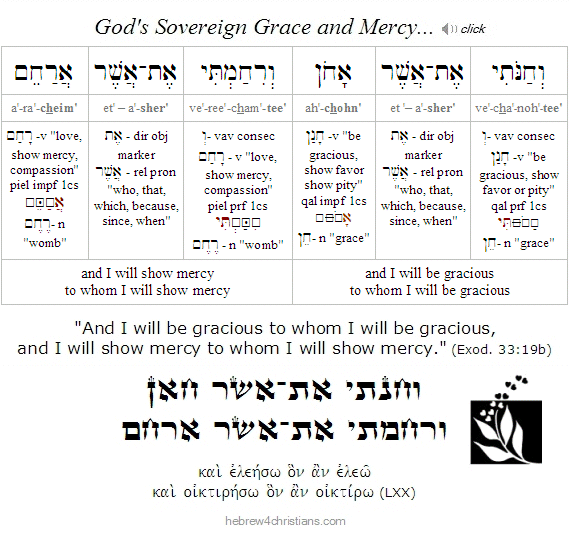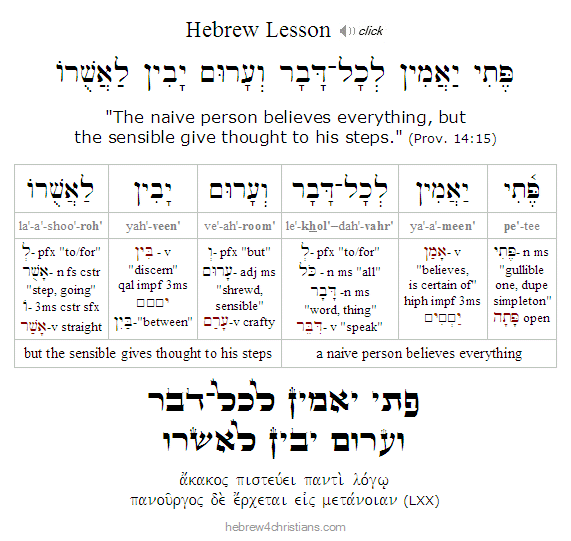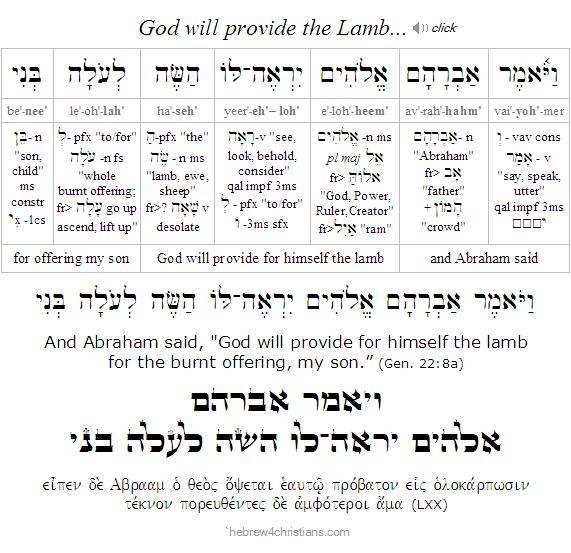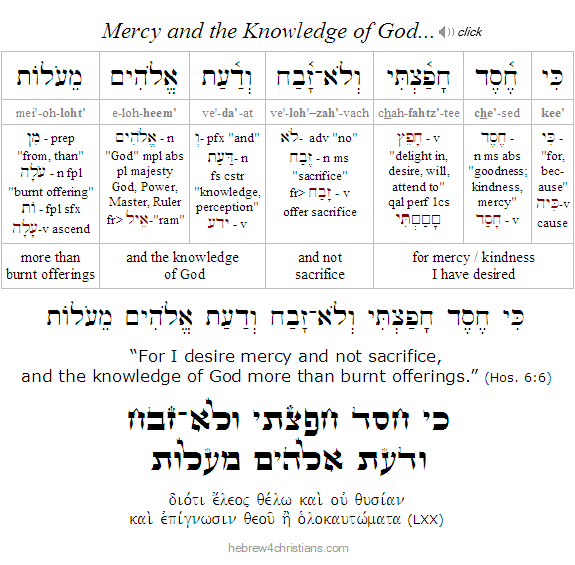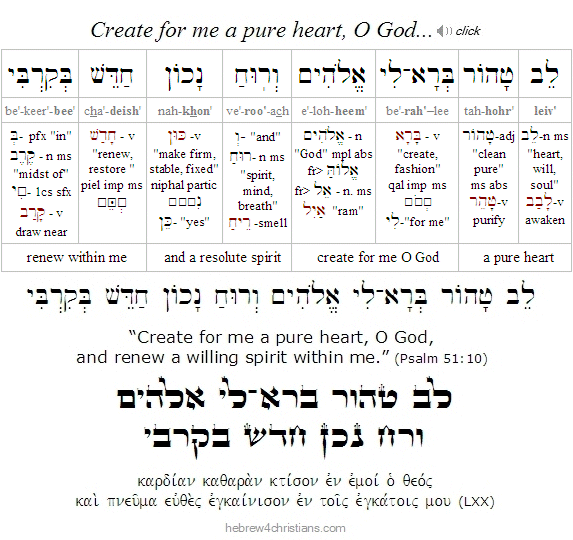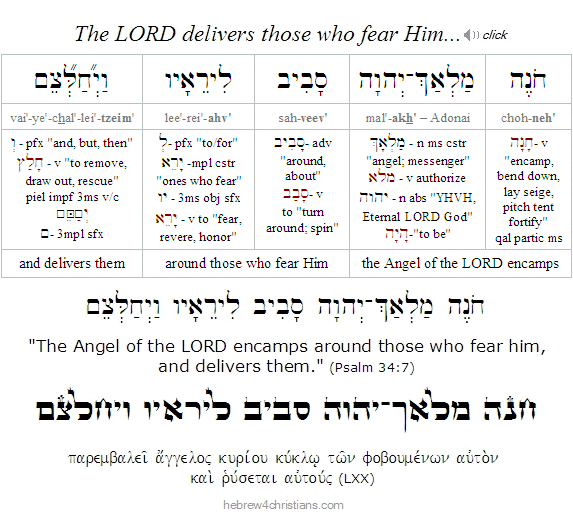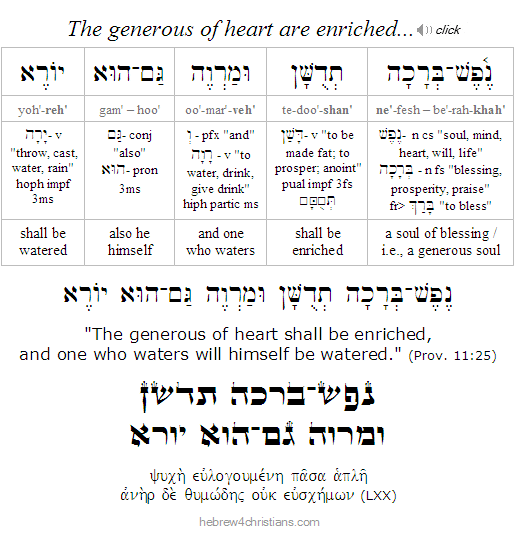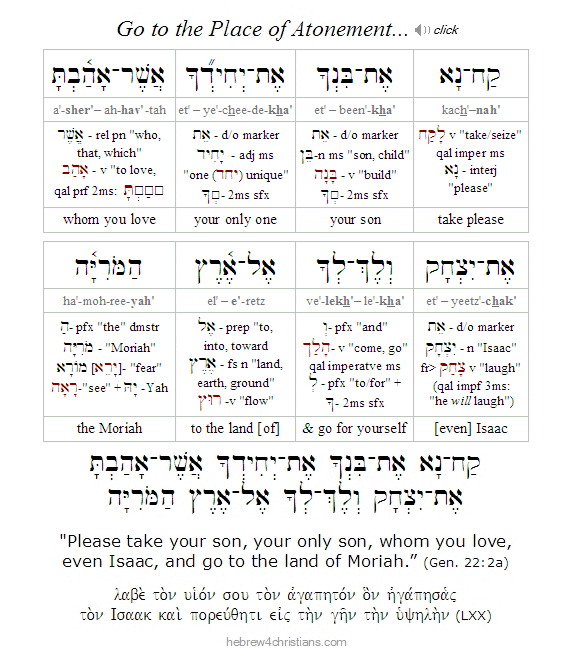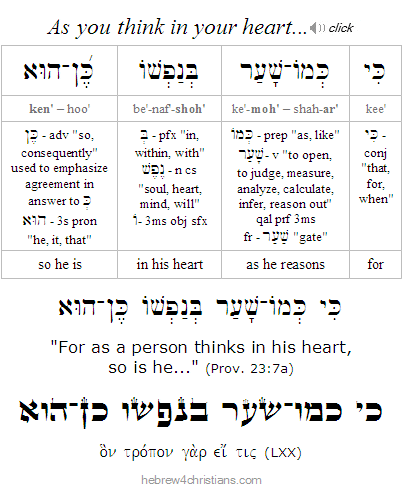|
Jewish Holiday Calendar
For November 2022 site updates, please scroll past this entry....
The Torah divides the calendar into two symmetrical halves: the Spring and the Fall, indicating the two advents of Messiah. The Biblical year officially begins during the month of the Passover from Egypt (called Rosh Chodashim, see Exod. 12:2), and the spring holidays of Passover, Unleavened Bread, and Firstfruits both recall our deliverance from Egypt and also our greater deliverance given by means of the death, burial, and resurrection of the Messiah, the great Passover Lamb of God. Yeshua was crucified on erev Pesach, buried during Unleavened Bread, and was resurrected on Yom Habikkurim (Firstfruits). The holiday of Shavuot (i.e., "Pentecost") both commemorates the revelation of the Torah at Sinai as well as the revelation of the Ruach HaKodesh (Holy Spirit) at Zion, in fulfillment of the promise given by our Lord....
The intermediate months of summer end with the advent of the sixth month of the calendar, called the month of Elul, which recalls the time Moses interceded on behalf of Israel after the sin of the Golden Calf. To commemorate this time of our history, we likewise focus on teshuvah (repentance) in anticipation of Rosh Hashanah and especially in anticipation of Yom Kippur, the great "Day of Atonement." In Jewish tradition the 30 days of Elul are combined with the first ten days of the seventh month (called the "Days of Awe") to set apart "Forty Days of Teshuvah" leading up to the Day of Forgiveness for Israel. Immediately following Yom Kippur, the mood changes as we begin preparing for a joyous week-long celebration called Sukkot (i.e., "Tabernacles") that concludes with the holiday of Simchat Torah.
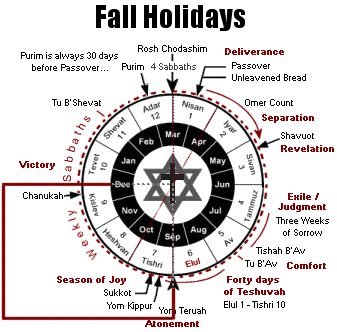 |
The Fall Holidays:

The fall festivals prophetically indicate the Day of the LORD, the second coming of Yeshua, the great national turning of the Jewish people, and the establishment of the reign of the Messiah upon the earth during the Millennial Kingdom in the world to come.
Note that in accordance with tradition, holiday dates begin at sundown. Moreover, some holidays may be postponed one day if they happen to fall on the weekly Sabbath:
1. Month of Elul (Fri. Aug. 26th [eve] - Sun. Sept. 25th [day])
2. Month of Tishri (Sun. Sept. 25th [eve] - Mon. Oct. 24th [day])
3. Month of Cheshvan (Mon. Oct. 24th [eve] - Wed. Nov. 23rd [day])
- Four Sabbaths: Noach, Lekh-Lekha, Vayera, Chayei Sarah
- Yom Ha'Aliyah - Honoring Israel's immigrants (Tues. Nov. 1st; Cheshvan 7)
- Sigd - 50th day after Yom Kippur; Ethiopian Jewish holiday (Tues. Nov. 22nd)
4. Month of Kislev (Wed. Nov. 23rd [eve] - Fri. Dec. 27th [day])
- Four Sabbaths: Toldot, Vayetzei, Vayishlach, Vayeshev
- Winter Solstice: Wed. Dec. 21st (Kislev 27)
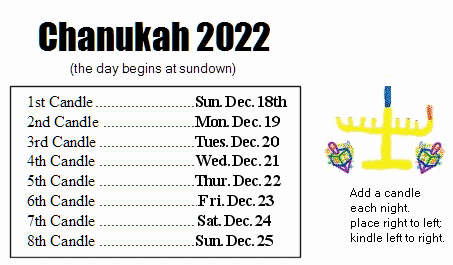
- Dates for Chanukah 2022 (5783):
- 1st Chanukah candle - Sun. Dec. 18th [i.e., Kislev 25]
- 2nd Chanukah candle - Mon. Dec. 19th [i.e., Kislev 26]
- 3rd Chanukah candle: Teus. Dec. 20th [i.e., Kislev 27]
- 4th Chanukah candle: Wed. Dec. 21st [i.e., Kislev 28]
- 5th Chanukah candle: Thurs. Dec. 22nd [i.e., Kislev 29]
5. Month of Tevet (Fri., Dec. 23rd [eve] - Sun. Jan. 26th [day])
- Four Sabbaths: Miketz, Vayigash, Vayechi, Shemot
- Dates for Chanukah (continued):
- 6th Chanukah candle: Fri. Dec. 23rd [i.e., Kislev 30]
- 7th Chanukah candle: Sat. Dec. 24th [i.e., Tevet 1]
- 8th Chanukah candle: Sun. Dec. 25th [Tevet 2] Zot Chanukah
- Christmas - Sat. Dec. 25th (Tevet 2, 5783)
- Asarah B'Tevet - Tues. Jan. 3rd (dawn), 2023; fast over the seige of Jerusalem
- Secular New Year: Sun. Jan. 1st, 2023 (Tevet 8, 5783)
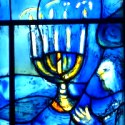 |
Note: For more about the dates of these holidays see the Calendar pages....
November 2022 Updates
Comfort from the Shepherd...

[ "The greatest honor we can give Almighty God is to live gladly because of the knowledge of his love." - Julian of Norwich ]
11.30.22 (Kislev 6, 5783) The Spirit of the Lord comforts and reassures those who trust in Him: "My sheep hear my voice, and I know them, and they follow me. And I give them eternal life (i.e., chayei olam: חַיֵּי עוֹלָם), and they will never perish - no, never! - and no one will snatch them out of my hand" (John 10:27-28). Note that the Greek grammar in this verse uses a "double negation," which is the strongest way to deny something. In other words, if the question were asked, "Will one of these sheep perish?" the answer is emphatic: "No, no, it will never happen! It is unthinkable!" Indeed all those who belong to Messiah "shall never, ever perish - not into eternity (εἰς τὸν αἰῶνα)." It is an eternal certainty that you who are trusting in Yeshua will never perish, and no power in heaven or earth will be able to take you out of God's hand... "Surely goodness and mercy shall pursue you all the days of your life, and you shall dwell in the Presence of the Lord forever (Psalm 23:6).
Regarding the certainty of salvation Yeshua said: "I tell you the solemn truth, the one who hears my message and believes in the One who sent me has (i.e., ἔχει, present active indicative) eternal life and will not be condemned, but has passed over (i.e., μετά + βαίνω, lit., "crossed over" [עָבַר]) from death to life" (John 5:24). Note that the verb translated "has passed over" (μεταβέβηκεν) is a perfect active that expresses completed action: "this one has already passed over from death to life." In other words, it is an accomplished spiritual reality though it is only experienced as we surrender to the love and grace of God. As the apostle Paul later summarized: "For it is by grace you have been saved (i.e., σεσῳσμένοι, a perfect passive participle that denotes completed action done on your behalf with effects that continue to the present) through faith, and this not from yourselves, it is the gift of God, not a result of works, so that no one may boast" (Eph. 2:9-10). Ultimately, salvation is a question about who you really are, not about what you do....
God does not want us uncertain or unsure of His great love for us. A fearful believer explained that he was anxious about his acceptance before heaven. When he was asked to define "salvation," he answered, "freedom, deliverance, rest, peace." So you think fear will help you do away with your fear? You are fearful of the idea of freedom from fear? "Face the facts of being what you are, for that is what changes what you are" (Kierkegaard).
"Be strong and of good courage" - chazak ve'ematz (חֲזַק וֶאֱמָץ). The LORD God promises "never to leave you nor forsake you," and to be with you wherever you go (Josh. 1:5,9; Heb. 13:15, Psalm 139; Matt. 28:20). In the Greek New Testament the wording of Hebrews 13:15 is highly emphatic: "Not ever will I give up on you (οὐ μή σε ἀνῶ); no, not ever will I leave you behind (οὐδ᾽ οὐ μή σε ἐγκαταλίπω)." May you hear the voice of the Good Shepherd calling you, and may He forever keep you under His watchful care. Amen.
Hebrew Lesson:
Joshua 1:9 reading (click):
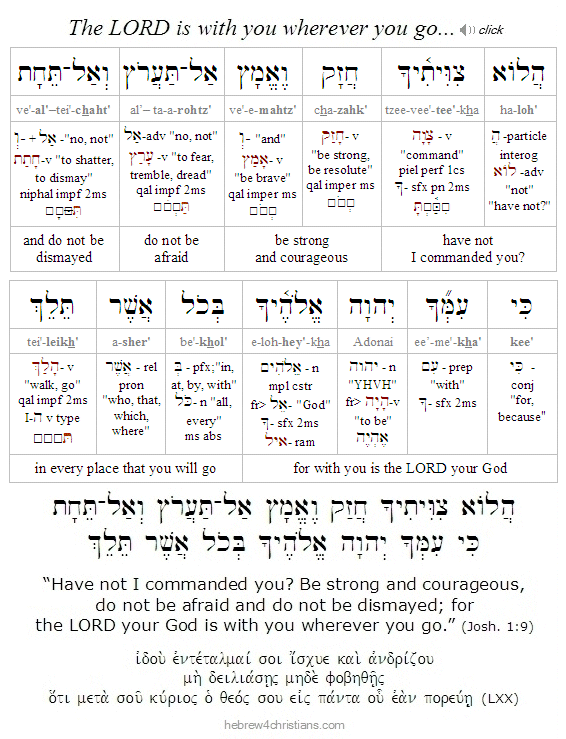 |
Seeing the Unseen...

[ "Turn around and believe that the good news that we are loved is better than we ever dared hope, and that to believe in that good news, to live out of it and toward it, to be in love with that good news, is of all glad things in this world the gladdest thing of all." - Frederick Buechner ]
11.30.22 (Kislev 6, 5783) Yeshua told us: "Blessed are those who have not seen and yet have believed" (John 20:29). Despite the struggle of this life - our sorrows, pains, and even death itself - we believe in God's love and promise for us, even if we do not presently see the fulfillment of our hope, just as Abraham believed the promise that he would be the father of an innumerable multitude long before he saw any sign of its fulfillment. Abraham "believed the impossible" and "hoped against hope" (παρ᾽ ἐλπίδα ἐπ᾽ ἐλπίδι), meaning that hope moved within him even though there was nothing to see in the realm of the natural -- he believed in an unseen good; he trusted in the One who gives life to the dead and who "calls into existence the things that do not exist" (Rom. 4:17). The Scripture comments: "He did not weaken in faith when he considered his own body, which was as good as dead (since he was about a hundred years old), or when he considered the deadness of Sarah's womb. He did not stumble over the promise of God through unbelief but was strong in faith, and gave glory to God, fully persuaded that God was able to do what he had promised, and that is why his faith was counted to him as righteousness" (Rom. 4:19-22).
Likewise we are called to believe in an unseen good, an unimaginably wonderful destiny for our lives, as it says, "Things no eye has seen, nor ear heard, nor mind imagined, are the things God has prepared for those who love him" (1 Cor. 2:9). Faith does not use natural reason or the evidence of the senses to see the unseen, but it "believes to see" through "eyes of the heart" to know the hope of God's calling and to attain the blessing (Eph. 1:18). Faith in God's love comes from a different source and has a different means of apprehension than human wisdom, so that no matter how things might appear in this fallen world, the LORD God may be known and trusted to work all things for our ultimate good. "Blessed are those who have not seen and yet have believed." Amen.
Hebrew Lesson:
Psalm 27:14 reading (click):
The Ladder to Heaven...

[ Our Torah reading this week (Vayetzei) includes the famous vision of Jacob wherein he saw the angels of God ascending and descending a ladder that reached from earth toward heaven... ]
11.30.22 (Kislev 6, 5783) Recall that after Jacob had received the (second) blessing from his father Isaac, he fled for his life to escape the wrath of his brother Esau. He then came upon a certain place (וַיִּפְגַּע בַּמָּקוֹם) and stayed there for the night because the sun had set. Jacob then "took one of the stones of the place, and put it under his head, and lay down in that place to sleep" (Gen. 28:11). And so began Jacob's journey from his homeland to attain the promise of God, and such is the way for us as well, as we first receive our Father's blessing but soon are consigned to desolate places to await things yet unseen. For the way of blessing comes not from the "fatness of the earth" but from the more rarefied "dew from heaven," which descends in mystery, after the sun has set (Gen. 27:28, cp. Gen. 27:39).
The faithful "descend in order to ascend," which means they first suffer and then they are glorified. This is the pattern of Yeshua, who emptied himself and suffered before he was raised up in everlasting glory. "Unless a seed of wheat falls into the earth and dies, it remains alone; but if it dies, it bears much fruit" (John 12:24; 1 Cor. 15:36). God humbles and tests those whom he loves so they may learn to trust in his promise - his word - and to demonstrate his faithfulness in the end (Deut. 8:3; Rom. 11:36).
Note, then, that after being driven from his homeland Jacob dreamed of the ladder with the angels ascending and descending as the LORD himself announced his blessing over his seed (Gen. 28:12-14). Yeshua, as we learn from the gospel (John 1:51) explained that the vision ultimately referred to him - about how the angels followed him during his ascent and descent as the ladder or "bridge" between God and man. The descent refers to Yeshua's incarnation wherein he entered the realm of this world, clothed in human flesh as the Promised Seed, the "Son of Man" who would restore the lost dominion of Adam; whereas the ascent refers to Yeshua's resurrection - the redemption and return of fallen humanity by means of ascension and glorification as LORD over all. Luther understands the angelic host descending and ascending to reveal how the angels love and follow after their Lord -- whose face they do always behold -- eager to witness His advent as our Savior and Redeemer (see Matt. 18:10; 1 Pet. 1:12; 1 Tim. 3:16). Yeshua is Emanuel (עמנו אל), the Heralded Seed through whom all the families of the earth be blessed (Luke 2:8-15).
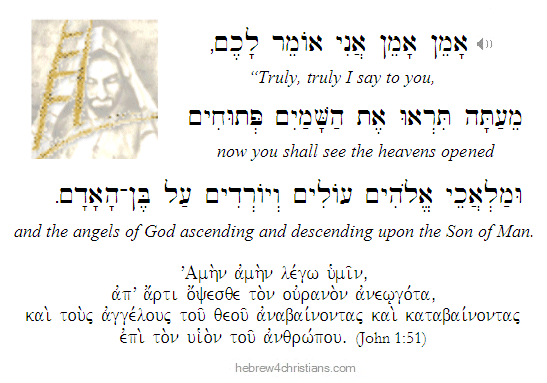 |
Returning to the account of the Torah, after Jacob received this dramatic vision, he awoke from his sleep and exclaimed: "Surely God is in this place, but I did not know!" And he was afraid, and said, "How dreadful is this place! this is none other but the house of God (בֵּית אֱלֹהִים), and this is the gate of heaven" (וְזֶה שַׁעַר הַשָּׁמָיִם, Gen. 28:16-17). Amen, Yeshua is ha'makom (המקום), the appointed "Place" of God, the very "House" of His presence; he alone is the way that leads us back to the Father (John 14:6). Yeshua is the Bridge to the Father, the narrow way of passage that leads to life. He has healed us from the sting of death. He calls out to us in the storm saying, "Take heart. It is I; be not afraid" (Matt. 14:27). Amen.
Hebrew Lesson:
John 14:6 reading (click):
Dealing with the Demonic...

11.29.22 (Kislev 5, 5783) Though the Scriptures teach that the realm of the demonic exists, we encounter its presence most usually in thoughts and feelings that entice the soul to act selfishly and to entertain doing evil. That is where the battle begins. In the mind. The monster that tempted Eve in the Garden got into her head long before she bit into the fruit from the forbidden tree. And unless we are on guard against the variegated insinuations of godless insanity, we are liable to be under its influence as well...
You might think that demonic oppression is something flamboyant or that requires the ministrations of an exorcist, but long before such intervention may be necessary, the mind has been captivated by evil and deranged thinking. Such thinking may have its origins with a demons named "worry," or "shame," or "unworthiness" or "anger." But a common strategy of the devil is to supply plausible ideas that are designed to deceive us and lead us astray.
Everyone is a theologian of sorts. The difference, however, is whether you are a good theologian or one who is swamped with muddled thinking about what is real. As C.S. Lewis once said, "Good philosophy must exist, if for no other reason, because bad philosophy needs to be answered. The cool intellect must work not only against cool intellect on the other side, but against the muddy heathen mysticisms which deny intellect altogether. Most of all, perhaps we need intimate knowledge of the past."
The devil doesn't care if it is a "holier-than-thou" theology, or a murky mysticism of "absolute tolerance," or a smarmy disavowal of faith in God altogether --- he is equally pleased with the sensualist as well as the atheist, indeed, he is content with any distortion of the truth, for this enables him to "feed" his deluded ego as the "Prince of Darkness."
In a way, dealing with evil thinking is unremarkable. After all, the airwaves of mass media continually disseminate lies, disinformation, and godless thinking in countless formats and by various diabolical stratagems. Whenever we encounter the demonic affecting us, then, we should not panic or be scandalized, but must instead reaffirm the truth of God and resolutely submit to his will (James 4:7). Sometimes this means contradicting the lie by quoting Scripture, offering praise to the Lord, and asking our Heavenly Father for deliverance. In extreme cases, it may be necessary to command the evil spirits to silence their blasphemies and to cease their intrusions. If we find ourselves going out of control emotionally, we are giving ground to the devil. The best tactic is to stay calm and re-center our focus on the Lord who is always present. There is shalom - that is, healing, wholeness, and soundness of mind - as we regain awareness of the greatness and the beauty and the glory of our God.
Hebrew Lesson
Psalm 3:3 Hebrew reading (click):
Knowing God's Heart...
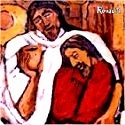
[ "When you read God's Word ... continually to say to yourself: It is I to whom it is speaking - this is earnestness, precisely this is earnestness. This is most crucial, as unconditionally the condition if you are to come to see yourself in the mirror." - Kierkegaard ]
11.29.22 (Kislev 5, 5783) "Our Lord Jesus oftentimes said, 'This I am. This I am. I am what you love. I am what you enjoy. I am what you serve. I am what you long for. I am what you desire. I am what you intend. I am all that is'" (Julian of Norwich). Amen to such beautiful words. And we should attend to stirring of our hearts, our deepest desires, since they ultimately find their end in God. As C.S. Lewis noted, our longing for a love which no experience in this world can fully satisfy is a sign that were made for God's eternal love.
You seek beauty, peace, love, and life, but the Lord says that he is the substance and heart of all these things... The lilies of the field do not toil but are arrayed in God's pleasure and design; the birds do not store up their food in barns but are sustained to take wing in the winds of God's hovering presence. Every hair on your head is numbered; there is not a word on your tongue unheard by your Heavenly Father.
Imagine, if you will, Yeshua saying the following words, all of which are attested in the holy Scriptures: "I am the bread of life. I am the substance of what satisfies your hunger. I am essential for life. I am the manna that comes down from heaven to feed you and make you forever alive. I give you sustenance and strength; I will give you living water that will be like an oasis for your heart - the Spirit of Life that will comfort you. Blessed are those who hunger and thirst for righteousness, for they shall be satisfied. I alone can satisfy your deepest needs and longings. I am Life itself, the source and blessing of all that is good and worthy and true.
I am the light of the world. I give to you the light of life. My presence will guide your way. I will turn your darkness into light. In me is the fountain of life; in my light you shall receive light... I will give you a heart to know me. I am the Word of God: the Voice and revelation of the LORD, the Source of all truth. I am the LORD who brings you out of the darkness of your bondage; I am the one who redeems you, the one who atones for you, the one who suffers and dies for you to remove what separates you from God's Presence. I am the Father who receives you with open arms; I sacrifice the fattened calf to celebrate the blessing of your life... I am the LORD your healer; I sanctify you in my love.
I am the gateway to life. I am the door that opens to the Kingdom of Heaven. I am the way to the Father's heart; I express the truth of God in who I am; I am the resurrection of God: No one can enter the kingdom apart from me. I am the LORD and there is no Savior apart from me. Do not be afraid: I will hold your right hand; it is I who say to you, "Fear not, I am the one who helps you." I am the Good Shepherd who faithfully guards each one of his flock.
I am your way to connect with God. I am the true Vine. Live in me and I will live in you. I will never leave nor forsake you. Draw near to me: lean upon my bosom. I will teach you what love means. Find comfort in my love for you. Then you will be able to love others and glorify the truth of my heart's passion for all people."
Yeshua is the way, the truth, and the love for which our heart cries out. In Him we "live and move and have our being." He is the Alef and Tav, the First and the Last, the Beginning and the End, and the Sacred Center of all that exists. His heart is our "all in all," the fullness of all that will ever mean anything at any time. "I am my beloved's and my beloved is mine; he grazes among the lilies." May we open our hearts and draw near to him today. Amen.
Hebrew Lesson
Jeremiah 31:3 Hebrew reading (click):
The Ladder of Truth...

[ "It is not the truth that needs people, but people who need the Truth." - Kierkegaard ]
11.29.22 (Kislev 5, 5783) The Hebrew idea of "truth" (i.e., emet: אֱמֶת) is richer than factual description or "correspondence" between language and reality, since it contains moral implications and possibilities: what is true is also right, good, reliable (honest), beautiful, and sacred. The Hebrew word comes from a verb (aman) that means to "confirm" or establish, and the noun form (i.e, emunah: אֱמוּנָה, "faithfulness" or "trustworthiness") expresses the will to live by what is ratified, the "amen" of decision. The Hebrew concept is therefore existential: truth that is not lived is not really truth. Speaking the truth (dibbur emet) and abhoring dishonesty are considered foundational to moral life, as it says: "Speak the truth (דַּבְּרוּ אֱמֶת) to one another; render true and perfect justice in your gates" (Zech. 8:16). Yeshua said, "Amen, amen I say to you...." throughout his ministry to stress the reliability and certainty of God's truth (Matt. 5:18, 26, etc.). Indeed, Yeshua is called "the Amen, the faithful and true witness" (Rev. 3:14). In that sense truth is not a "what" of correspondence but rather a "who," since reality turns on the magnetism of the divine presence (Col. 1:16).
The ancient Greek word translated "truth" is aletheia (ἀλήθεια), a compound formed from an alpha prefix (α-) meaning "not," and lethei (λήθη), meaning "forgetfulness." Greek scholars say the word lethei itself derives from the verb lanthano (λανθάνω), which means "to be hidden," so the general idea is that a-letheia (i.e., truth) is non-concealment, non-hiddenness, or (put positively) revelation or disclosure. Thus the word of Yeshua - His message, logos (λόγος), revelation, and presence - is both "unforgettable" and "irrepressible." Yeshua is the Unforgettable One that is manifest as the express Word of God (דְּבַר הָאֱלהִים). He is the Light of the world (אוֹר הָעוֹלָם) who imparts the "light of life" (John 8:12). Though God's message can be supressed by evil and darkened thinking, the truth is regarded as self-evident and full of intuitive validation (see Rom. 1:18-21).
Note that the LXX (i.e., the ancient Greek translation of the Jewish Scriptures commonly called the Septuagint) dates from the time of the philosopher Plato, though of course the Hebrew text dates back to the time of Moses (13th century BC) and even earlier. About 300 BC, "Theophrastus," a student of Aristotle, wrote of the Jews that 'being philosophers by race, they converse with each other about the Divine." Abraham, who dates from about 2,000 BC, was the first avowed monotheist who openly repudiated the polytheism and idolatry of ancient Ugaritic culture (Abraham also long predates the rise of Hinduism and the animistic hymns of the Vedas and their priestly commentary found in the Upanishads by a thousand years, just as ancient Judaism predates "Islam" by thousands of years). Similarly, both David and his son Solomon (10th century BC) wrote "existential" works of philosophy, predating the modern world by nearly 3,000 years...
Hebrew Lesson:
Psalm 25:5 Hebrew Reading:
The Reward of Faith...

11.29.22 (Kislev 5, 5783) "Without faith it is impossible to please God, for whoever would draw near to God must believe that he exists and that he rewards those who seek him" (Heb. 11:6). Note that the word translated "impossible" in this verse (ἀδύνατος) means powerless, incapable, and so on, which implies that faith is the key that opens the door to God's presence. It is not possible to relate to God, after all, if you do not trust in his Reality and concern for your life. Indeed confidence in God's promises is the foundation of everything; it is the source of your inner life connection and the answer to your prayer for healing. As our LORD Yeshua said: "Take heart; your faith has made you whole" (Matt. 9:22).
God rewards those who earnestly seek him. This hearkens to the promise made to our father Abraham: אל־תִּירָא אַבְרָם - "Fear not, Abram," אָנכִי מָגֵן לָךְ – "I am your Shield," שְׂכָרְךָ הַרְבֵּה מְאד - your reward shall be very great" (Gen. 15:1). "For the LORD God is a sun and shield; the LORD bestows favor and honor. No good thing does he withhold from those who walk in trust" (Psalm 84:11). God imparts favor to those who honestly seek Him, as it is written: "and you will seek me, and find me, when you shall search for me bekhol levavkha - with all your heart" (Jer. 29:13). "With all your heart" -- with both your "good" heart and with your "evil" heart -- that is, with all that is within you shall you seek... You don't wait until you are "cleaned up" to reach out to God, but come "just as you are" -- in the midst of the messiness and sin of your life. That is the teshuvah (answer) to God's haunting question regarding your life; you find "all your heart" as you seek God's presence in all your ways (Prov. 3:6). Faith is its own reward since it imparts the blessing of Reality. The Greek word used to translate "those who seek" is a present active participle (ἐκζητοῦσιν) that refers to those who continue to search for God's Presence and truth - even in the midst of the struggle of life. Like the prophet Enoch, this is the way to "walk with God." So do not lose heart or throw away your confidence, dear friend, because it has great reward (Heb. 10:35).
וּבִקַּשְׁתֶּם אתִי וּמְצָאתֶם
כִּי תִדְרְשֻׁנִי בְּכָל־לְבַבְכֶם
oo'vee·kash·tem · oh·tee · oo'mei·tzah·tem
kee · teed·re·shoo'·nee · be'khol - le'vav·khem

"You will seek me and find me
when you search for me with all your heart."
(Jer. 29:13)

Truth sets us free...
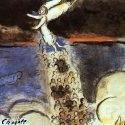
11.28.22 (Kislev 4, 5783) When Yeshua said that the truth would "set us free" (ἐλευθερώσει), he was referring to the acceptance of the Witness of Divine Reality (i.e., the Word, Breath, Spirit, Voice, Message, Meaning, and Love of God) that delivers us from the lies we habitually tell ourselves (or that we receive from others). If you "persevere in my word" (μείνητε ἐν τῷ λόγῳ τῷ ἐμῷ) he said, "then you are my disciples indeed, and you will know the truth, and the truth will set you free" (ἡ ἀλήθεια ἐλευθερώσει ὑμᾶς, John 8:31-32). In other words, as we identify with his vision and redemptive mission, we will "be free indeed" from the tohu va'vohu (Gen. 1:2) – the "chaos and unreality" – that inescapably besets the way of the lie... We will be delivered from vanity and delusions of this world and its diseased affections; we will be set free from the need to justify ourselves by religion (perfectionism); we will no longer crave other people's approval; we will not be moved by the crowd and its pressures; we will find courage to face our challenges without resorting to escapism; and we will learn how to experience peace even when we encounter frustrations.
Despite our daily struggles and tests, we will be released from bondage to anger and resentment as we yield our will in trust that God is working all things together for our ultimate good (Rom. 8:28). Genuine freedom is not an "accidental property" of the heart, depending on "luck" or "fortune," but instead is a decision to believe in the Reality of the salvation of God given in Yeshua our LORD, even if we may feel "weltschmerz," or the sorrow of despair.
Hebrew Lesson
Psalm 119:142 reading (click):
Note: Tellingly, Merriam Webster has selected "gaslighting" as the Word of the Year, perhaps because of the constant blame-shifting, disinformation, and psychological terrorism propagated by the world's governments since the advent of Covid.. Deception designed to manipulate others is gaslighting. We ask the LORD for the truth that sets us free, even from the calculated deceptions engineered by the workers of lawlessness and evil in this world. Amen. "Greater is He that is in you than the one that is in the world" (1 John 4:4).
Helmet of Salvation...

11.28.22 (Kislev 4, 5783) "O GOD the Lord, the strength of my salvation, you have covered my head in the day of battle" (Psalm 140:7). We are in the midst of a great war for the sanctity of our souls, and the enemy is always fear. Fear amplifies our anxieties and magnifies our problems, since it heeds messages of unbelief and justifies despair. We must understand that fear is a false witness - an emissary that gainsays the truth and denies the power of God. In your struggle with fearful thoughts, take every thought captive and resolutely put your trust in the Lord. He will "cover your head" in the midst of the battle. Amen. "Confidence is the present tense of hope."
Hebrew Lesson:
Psalm 140:7 reading (click):
Parashat Vayetzei - וַיֵּצֵא

11.27.22 (Kislev 3, 5783) Our Torah for this week (i.e., parashat Vayetzei) includes Jacob's dream of a ladder (i.e., sullam: סֻלָּם) extending from earth to heaven, with the angels of God ascending and descending, and the LORD Himself standing above assuring Jacob of his safe return to the land he had fled. Jacob awoke and responded to the dream with awe: "Surely the LORD is in this place (בַּמָּקוֹם הַזֶּה), and I did not know it." And he was afraid and said, "How awesome is this place! This is none other than the house of God, and this is the gate of heaven." And he called the name of that place Bethel (בֵּית־אֵל) i.e., "the house of God."
The sages interpret ha-makom (הַמָּקוֹם), literally "the place" that Jacob saw, as Mount Moriah, the exact location where Jacob's father Isaac was bound as the "sacrificed seed" and which later became the site of the Holy Temple. Indeed the word makom comes from a verb (קוּם) meaning "to arise," suggesting resurrection and ascension. In later Rabbinical thought Ha-Makom became synonymous with the Name or Presence of God Himself ("God is the place of the world, but the world is not God's only place").
Yeshua referred to Jacob's dream when he said, "Truly, truly, I say to you, you will see heaven opened, and the angels of God ascending and descending on the Son of Man" (John 1:51). Just as Jacob saw the ladder ascending to heaven with the angels of God ascending and descending upon it, so Yeshua told Nathanael that He was the Ladder to God, the sha'ar ha-shamayim (שַׁעַר הַשָּׁמָיִם) - the way into heaven (John 14:6). Indeed, Yeshua is the true Place or "house of God" and its Chief Cornerstone (Rosh Pinnah, Matt. 21:42). The LORD is the resurrection and life, the One who prepares a place for you (John 11:25; 14:2).
Revelation of God...

11.25.22 (Kislev 1, 5783) Philip said to him, "Show us the Father and we will be satisfied." Yeshua replied, "Have I been with you so long, and you still do not know me, Philip? Whoever has seen me has seen the Father. How then can you ask, 'Show us the Father'? (John 14:8-9). Yeshua – and Yeshua alone – reveals the heart and truth of God to us, and looking for God "beyond" Him – up in heaven, across the sea, or in the mysteries of unfathomable forces that pervade reality – is ultimately a sign of unbelief and a denial of God Himself. The Father and the Son are of one essence and trying to separate them vitiates the message of Yeshua and makes it appear unfinished... On the contrary, the work of salvation is finished, and "Whoever has the Son has the life (החיים); but whoever does not have the Son of God does not have the life" (1 John 5:12). There is no other way to access the heart of the Father than through Yeshua, and his is the Name above all other names for salvation (John 14:6; Acts 4:12; Phil. 2:9-11; John 17:3). Every knee shall bow to Him; there is no other Savior (Isa. 45:21-23).
Those who honor the Son honor the Father and understand the heart of reality To know God is to know the revelation given in the Son, for the Son is God clothed in human skin, reaching out in compassion to heal the trusting sinner from eternal alienation. Just as the Angel of the LORD is the "King of Angels," the manifestation of God in angelic form, so the Son of Man is the manifestation of the LORD in human form. There is no other Savior; there is no further place to ascend or to seek: Yeshua is the Beginning and End of the Truth of the Compassion of the Eternal God. Let us resolve, then, that with all our heart and with all that is within us, we shall express the truth of God's kingdom and the truth of His salvation. Amen.
Hebrew Lesson:
John 14:6 reading (click):
Beans for Blessings...

[ "How can you expect to dwell with God forever, if you so neglect and forsake him here?" - Jonathan Edwards ]
11.25.22 (Kislev 1, 5783) From our Torah this week (i.e., parashat Toldot) we read: "Then Jacob gave Esau bread and lentil stew (לֶחֶם וּנְזִיד), and he ate and drank and rose and went his way. Thus Esau despised (בָּזָה) his birthright (בְּכרָה)" (Gen. 25:34). Esau esteemed the honor of being the firstborn son (i.e, bechor: בְּכוֹר) – the high priest of the family – as worth a "bowl of beans" when compared with the drive of his lower nature, and so he tragically forfeited the blessing of God... Far from regarding service to God as a divine privilege and wonderful opportunity to benefit his family, Esau wanted to be free of such responsibilities and therefore discredited the meaning and promise of faith. Note that the Hebrew word for "lentil stew" (or pottage) is nazid (נָזִיד), which comes from a Hebrew word that means "to boil up" in pride (i.e., zid: זִיד). Sadly, Esau was consumed with his own interests and regarded them as more important than the things of God.
Note further that most English translations of the Hebrew text (i.e., Gen. 25:34) suggest that because he bartered his birthright, Esau therefore had disparaged it, but the text implies continuity: in other words, after he ate, drank, and went his way, then Esau rationalized his bad decision by disparaging its importance...
Hebrew Lesson
Jonah 2:8 reading (click):
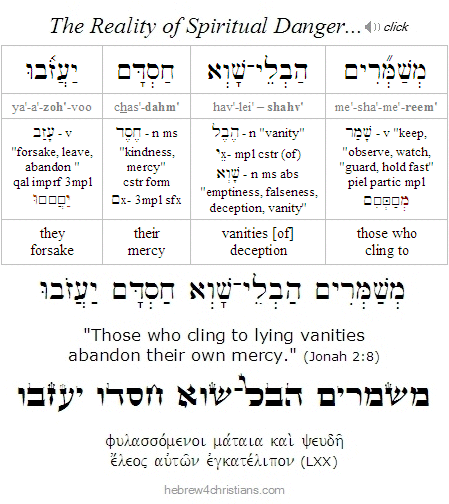 |
Keep on Trusting...

[ "Confidence is the present tense of hope." - Soren Kierkegaard ]
11.25.22 (Kislev 1, 5783) When Yeshua said, "Let not your heart be troubled... I go to prepare a place for you," he was assuring his friends that he had matters well under his control, and therefore they did not need to worry, since his passion rendered their salvation completely secure... The future is a "prepared place" for you, even if life in this world is often marked by testing and various refining fires. God has not promised to rescue us according to our own schedule, however, so if it appears that your prayers are not immediately answered, keep waiting in faith: "Rejoice, even if you have been grieved by various trials, because the tested genuineness of your faith -- more precious than gold that perishes though it is tested by fire -- may result in praise and glory and honor at the revelation of Yeshua the Messiah" (1 Pet. 1:6-7). God works "all things together for good," and since the exercise of faith is your good, he engineers all things to build your faith. "For my thoughts are not your thoughts, neither are your ways my ways, says the LORD" (Isa. 55:8).
Recall the words: "Let him who walks in darkness and has no light trust in the name of the LORD and rely on his God" (Isa. 50:10). Trusting in God (i.e., bittachon - בִּטָּחוֹן) doesn't mean that we are obligated to say this is "the best of all possible worlds," though it does mean we believe that eventually God will wipe away every tear and make all things right... Bittachon is a word for this world, which says, "Though he slay me, I will trust in him..." Those who call upon the LORD can trust not only in concealed good behind ambiguous appearances ("all things work together for good") but also in a future, real, substantive good that will one day be clearly manifest for us all... We fight the "good fight" of faith, which is a worthy struggle that eventually is realized for blessing.
The very last promise of Scripture is "I come quickly" (אֲנִי בָא מַהֵר) and the last prayer is, "Amen, come, Lord Yeshua" (אָמֵן בּאָה־נָּא הָאָדוֹן יֵשׁוּעַ) [Rev. 22:20]. Meanwhile we "inwardly groan" for the fulfillment of our redemption; since presently we are suspended between worlds, walking in hope yet subject to the vanities that befall all flesh. And though God may tarry, He declares, "I am the LORD; in its time I will hasten it" (Isa. 60:22). So we are made "captives to hope," clinging to the promise of our ultimate healing and redemption. Our hearts therefore affirm that God is faithful "to keep you from falling, and to present you faultless before the presence of his glory with exceeding joy" (Jude 1:24). Amen. God will help us before He will help us, and may He come speedily, and in our day....
Hebrew Lesson
Psalm 23:3 Hebrew reading:
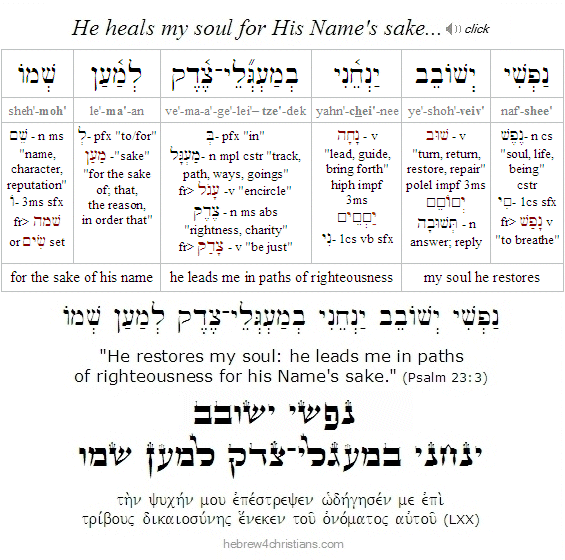 |
Broken and Remade...

[ I want to express my heartfelt thanks to all my supporters at this time. Hebrew for Christians could not be here apart from your help, and I want you to know how grateful to God I am for you. שלום וברכה לכולם - shalom uvracha le'kulam - peace and blessings, chaverim! - John ]
11.24.22 (Cheshvan 30, 5783) "See to it that no one fails to obtain the grace of God; that no root of bitterness (שׁרֶשׁ פּרֶה) springs up and causes trouble, and by it many become defiled; that no one is immoral or profane like Esau, who sold his birthright for a single meal. For you know that afterward, when he desired to inherit the blessing, he was rejected, for he found no chance to repent, though he sought it (the blessing) with tears" (Heb. 12:15-17; Gen. 27:38). The LORD says, "my people have committed two evils: they have forsaken Me, the fountain of living waters (מְקוֹר מַיִם חַיִּים), and hewed out cisterns for themselves, broken cisterns that can hold no water" (Jer. 2:13). Spiritually speaking, there are two basic sorts of breaking. One is to be broken by the inevitable sin and ruin of this world, and the other is to be made lev-nishbar (לֵב־נִשְׁבָּר), a broken heart, before the LORD. The former breaking comes from the vain attempt to find life in the broken vessels of this world, and "repentance" is expressed as remorse over perceived temporal loss. This sorrow eventually leads the soul to death (2 Cor. 7:10). To be inwardly broken, on the other hand, requires mourning over your life and returning to God for deliverance (Matt. 5:4). In hunger and thirst for God's righteousness the soul finds eternal satisfaction, since God alone provides the vessel of "living water" we need to live (John 4:14; 7:38). We all must drink from God's fountain of life (מְקוֹר חַיִּים), lest we suffer spiritual dehydration and death....
Are you haunted by an inner ache for love, joy, peace, and life? "Blessed are those who hunger and thirst for righteousness, for they shall be satisfied" (Matt. 5:6). Our inner poverty and need is a disguised grace; our desire for healing reveals the Spirit's invitation. Faith begins with the recognition of our need, since only then will we come to Yeshua for the "Bread of Life" (לֶחֶם הַחַיִּים) and the "Living Water" (מַיִם חַיִּים). Everything we need is found in him, though we must reach out in faith: "For without faith (אֱמוּנָה) it is impossible to please him, for whoever would draw near to God must believe that he exists, and that he rewards those who seek him" (Heb. 11:6). God rewards those who seek him; he answers the heart's cry; he responds to all who trust in his love and salvation. Therefore "ask, and it will be given to you; seek, and you will find; knock, and it will be opened to you. For everyone who asks receives, and the one who seeks finds, and to the one who knocks it will be opened" (Matt. 7:7-8). We are not saved by faith in our own faith, but in the Reality and Power of the LORD God who alone can raise the dead to new life...
Hebrew Lesson:
Psalm 36:9 Hebrew Reading (click):
Blessing of Confession...
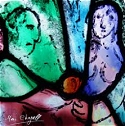
[ "Nothing sets a Christian so much out of the devil's reach than humility." - Jonathan Edwards ]
11.24.22 (Cheshvan 30, 5783) "If we confess our sins, he is faithful and just to forgive us our sins and to cleanse us from all unrighteousness" (1 John 1:9). Not just this or that particular sin, mind you, but rather the whole constellation of attitudes, assumptions, and wayward thinking that brought us into exile in the first place. The Greek word "confession" (i.e., homologia: ὁμολογία) means bringing yourself naked before the Divine Light to agree with the truth about who you are. Indeed, the verb form "homologeo" (ὁμολογέω) means "saying the same thing" - from ὁμός (same) and λόγος (word). In biblical Hebrew teshuvah (תְשׁוּבָה) means turning back to God by turning away from what makes you lost in unreality and painful exile. God's love for us is the question, and our teshuvah – our turning of the heart toward Him – is the answer. Teshuvah is one of the great gifts God gives each of us – the ability to turn back to Him and seek healing for our brokenness.
Hebrew Lesson
Proverbs 28:13 reading (click):
Two Blessings for Jacob...
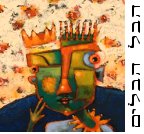
[ The following is related to this week's Torah reading, parashat Toldot... ]
11.23.22 (Cheshvan 29, 5783) When we think of Jacob as a young man, we tend to recall the dramatic episode when he disguised himself as Esau to "steal" the blessing from his father Isaac. In our Torah reading for this week, however, we note that Jacob actually received two blessings from his father. The first blessing was given to a disguised Jacob and it focused on material blessings: the "dew of heaven," the "fatness of the earth," "plenty of grain and wine," political power and hegemony (Gen. 27:28-29), whereas the second blessing was given to an undisguised Jacob and it focused on his role as God's chosen patriarch of the people of Israel (Gen. 28:3-4). The difference between these blessings turned on Isaac's restored vision. His first blessing was addressed to the character of Esau as his "natural choice," whereas his second blessing looked beyond mere appearances to behold the vision that was originally given to his father Abraham:
וְאֵל שַׁדַּי יְבָרֵךְ אתְךָ
וְיַפְרְךָ וְיַרְבֶּךָ וְהָיִיתָ לִקְהַל עַמִּים
וְיִתֶּן־לְךָ אֶת־בִּרְכַּת אַבְרָהָם
לְךָ וּלְזַרְעֲךָ אִתָּךְ
ve·el · Shad·dai · ye·vah·rekh · oht·kha
ve·yaf'·re·kha · ve·yar·be'·kha · ve·ha·yee'·ta · leek·hal · a·meem
ve·yee·ten · le·kha · et · beer·kaht · av·rah·hahm
le·kha · ool·zar·a·kha · ee·takh

"May El Shaddai bless you,
make you fruitful and multiply you so you become an assembly of peoples.
And may He grant the blessing of Abraham
to you and your offspring"
(Gen. 28:3-4)

- Isaac's second blessing to Jacob
In a sense, the self-effacing, disciplined, and strong-willed Isaac abandoned his "natural vision" that spught to install Esau as the next patriarch -- despite the objection from his faithful wife Rebekah -- by finally surrendering to the vision of his father Abraham. Isaac's entire life was a sort of overreaction to his father - an "antithesis to Abraham's thesis." By choosing to bless Jacob a second time -- this time with his eyes wide open -- Isaac revealed that he had finally accepted the grace of God that was revealed to his father Abraham.
Recall also that after Esau had discovered that the blessing was given to Jacob, he lamented and pleaded with his father to bestow upon him a blessing as well. It is interesting to note that the "residual" blessing that Isaac gave to Esau was the exact inverse of that given to Jacob: the "fatness of the earth" was put before the "dew of heaven" (compare Gen. 27:39 with Gen. 27:28), inicating that receiving sustenance from heaven is of greater value than finding earthly prosperity. And indeed, Jacob was "blessed with earthly trouble" his whole life, which caused him to rely on the "dew from heaven," whereas Esau was "blessed" with prosperity (and trouble) that came from trafficking in this world. Regarding Esau it may aptly be said: "Be careful what you wish for -- you just might get it!" (Heb. 12:17).
Hebrew Lesson:
Genesis 28:3b reading (click):
Note: Isaac was 60 years old when his two sons were born (Gen. 25:24-26), and according to Jewish tradition, Jacob and Esau were 63 years old at the time of the blessings (Yevamot 6a), making Isaac 123 years old at the time. He later died at the age of 180 (Gen. 35:28-29), making him the longest living of the three patriarchs. The Talmud further states that Jacob first fled to the School of Shem (i.e., Malki-Tzedek) before proceeding to Padan Aram, so that he actually arrived at Laban's home when he was 77 years old.
Gratitude and Healing...

11.23.22 (Cheshvan 29, 5783) It is good to praise and trust the LORD despite our afflictions, and indeed, suffering itself presents an invitation to come before God in prayer (James 5:13). Suffering offers us a nisayon (נִסָּיוֹן), a test, for our hearts to be exercised in ways otherwise rendered impossible should the path of our lives be attended without real struggle...
In this connection I am reminded of a quote from Sadhu Sundar Singh, "Should pain and suffering, sorrow, and grief, rise up like clouds and overshadow for a time the Sun of Righteousness and hide Him from your view, do not be dismayed, for in the end this cloud of woe will descend in showers of blessing on your head, and the Sun of Righteousness rise upon you to set no more for ever" (Wisdom of the Sadhu).
It's been said that both the devil and God want your soul, but their approaches are diametrically opposite to one another.... God offers you a bitter cup that, after it has been duly tasted, will be turned sweet, whereas the devil offers you an artificially sweetened cup that, after it has been duly tasted, will be found bitter to the last of its dregs... When you accept your suffering as ordained by God - by the LORD of Glory who could easily deliver you from all trace of its presence in but the twinkling of an eye – your heartache is sanctified, and your praise becomes more dear to Him. Only the wise and loving LORD knows how bitter waters may be made sweet; only the great Refiner of our souls knows how to bring eternal beauty up from ashes... So heal me, O LORD (even if that means suffering and pain for my life), and I shall be healed; save me, O LORD (do whatever it takes to bring me to the end of myself), and I shall be saved – for you are my praise.
If you are afflicted, troubled, or in any kind of pain, you have a great opportunity to glorify your Father in Heaven by offering Him your praise.... Praising God is the appropriate response to all of reality; the affirmation of God's glory transforms everything. "Is anyone among you feeling bad? Let him pray. Is anyone feeling good? Let him sing praise" (James 5:13). Remember that regardless of how you presently feel, your emotional life is centered in the truth of the Presence of God... As George Mueller once affirmed, "Be assured – if you walk with Him and look to Him, and expect help from Him, He will never fail you."
Hebrew Lesson
Jeremiah 17:14 Hebrew reading (click):
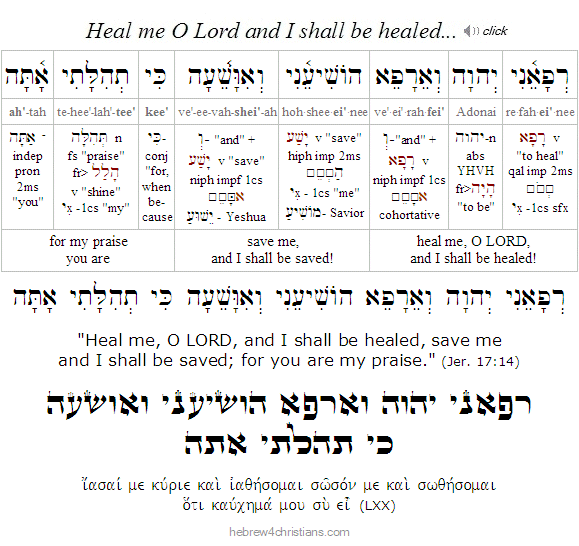 |
Gratitude and Seeing...
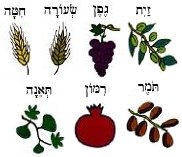
[ The following entry is related to the Thanksgiving holiday, friends. We are grateful for you... ]
11.23.22 (Cheshvan 29, 5783) Gratitude is essential to the life of faith... We read in the Torah: "And you shall bless the LORD your God for the good" (Deut. 8:10). Whenever we derive benefit or enjoyment from something we are to bless (i.e., thank) God for his goodness. Indeed the Hebrew term for gratitude is hakarat tovah (הַכָּרַת טוֹבָה), a phrase that means "recognizing the good." The heart looks through the eye, and therefore how we see is ultimately a spiritual decision: "If your eye is "single" (i.e., ἁπλοῦς, sincere, focused)," Yeshua said, "your whole body will be filled with light" (Matt. 6:22). When we see rightly, we are awakened to God's Presence in the little things of life, those small miracles and "signs and wonders" that constantly surround us. The good eye of faith sees hundreds of reasons to bless God for the precious gift of life (1 Cor. 10:31) - even in times of testing...
"Give thanks to the LORD for He is good; his love endures forever" (Psalm 136:1); "give thanks to the LORD always" (Col. 3:17; Eph. 5:20; 1 Thess. 5:18)... Gratitude is foundational to our lives as followers of Yeshua. Indeed there are really only two prayers we ever offer to God, namely "Help, LORD!" and "Thank you, LORD." Meister Eckhart once remarked that if the only prayer you said in your entire life was, "thank you," that would suffice... Genuine prayer ultimately resolves to an expression of thanks. We are to "praise the Bridge that carries us over" into the Presence and Love of God, and that Bridge is Yeshua our Lord.
The "thank offering" mentioned in the Torah (i.e., zevach ha-todah: זֶבַח הַתּוֹדָד) is also mentioned in the New Testament. In the Book of Hebrews were are instructed to "continually offer up a sacrifice of thanks (זֶבַח תּוֹדָה) to God, that is, the fruit of lips that acknowledge his Name" (Heb. 13:15). It is interesting to note that the Greek verb used to "offer up" (i.e., ἀναφέρω) is used to translate the Hebrew verb "to draw near" (karov) in Leviticus. In other words, the "offering up of thanks" for the sacrifice of Yeshua functions as "korban" and draws us near to God. Thanking God for personal deliverance constitutes "right sacrifices" (זִבְחֵי־צֶדֶק) as we draw near to God in the hope of His love (Psalm 4:5; Heb. 7:19).
Hebrew Lesson:
Psalm 103:1 Hebrew Reading:
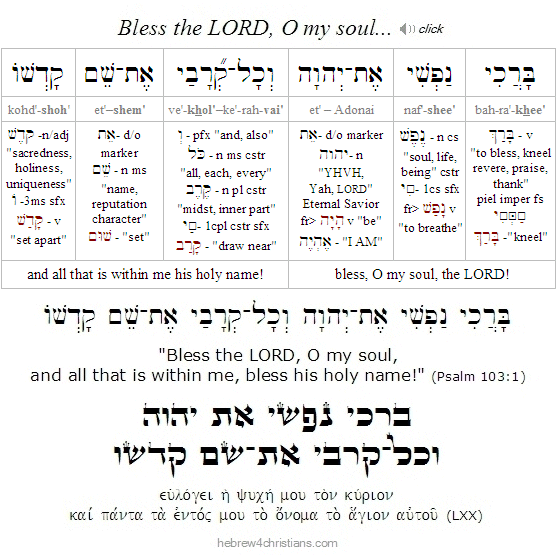 |
Trust in Dark Hours...

11.23.22 (Cheshvan 29, 5783) We are living in dark times, perilous days (2 Tim. 3:1-5; 2 Pet. 3:3). The world has become more and more lawless and violent. Many live in dread, sensing that difficult times are ahead. Indeed, with the advent of the Covid pandemic, things are likely never to return to "normal" as the world economy and the global political situation are deliberately being restructured... These are truly unprecedented times.
Though we might not understand why God allows these things to happen, we nevertheless hold fast to our conviction that the Lord is our Good Shepherd who is restoring our souls. He speaks to us in the midst of uncertainty: "Who among you fears the LORD and obeys the voice of his Servant? Let him who walks in darkness and has no light trust in the Name of the LORD and lean upon on his God" (Isa. 50:10).
Hebrew Lesson
Isaiah 50:10 Hebrew reading (click):
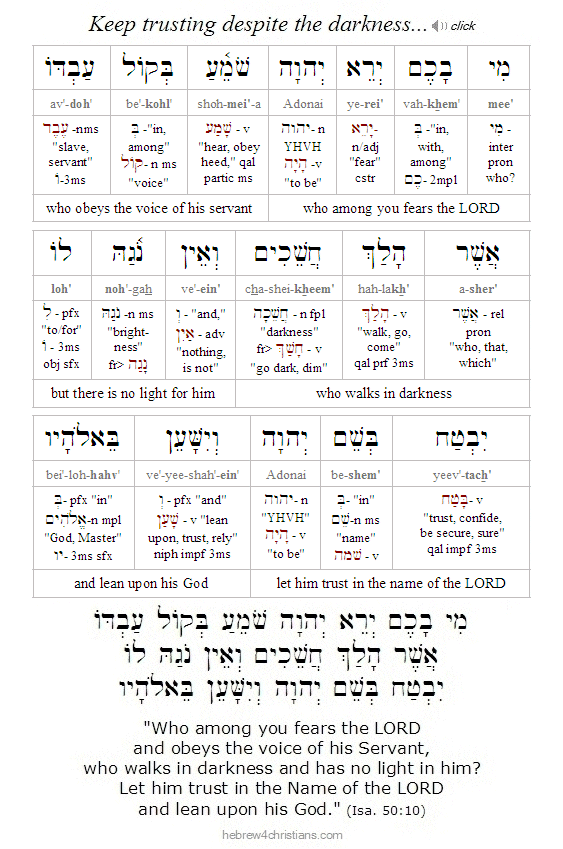 |
Friend, the Lord allows the dark cloud of unknowing for his own sovereign purposes, perhaps as a means to teach us to abandon ourselves to his care. Surely God understands our powerlessness; "he remembers our frame, that we are dust" (Psalm 103:14); surely He knows that we cannot see and therefore he calls us to "lean upon Him" for guidance. As we walk through the valley of the shadow of death we find that he is with us, and therefore we must choose to fear no evil.
Trusting in God (i.e., bittachon - בִּטָּחוֹן) does not mean that we are obligated to affirm that this is "the best of all possible worlds," though it does mean we believe that eventually God will wipe away every tear and make all things right. Bittachon is a word for this world, which says, "Though he slay me, I will trust in him..." We do not need to trust for what is seen in this world but for an unseen good (Rom. 8:24). Those who call upon the LORD can trust not only in concealed good behind ambiguous appearances ("all things work together for good") but also in a future, real, substantive good that will one day be clearly manifest for us all... We fight the "good fight" of faith, which is a worthy struggle that eventually is realized for blessing. We die daily; we mortify ourselves and surrender to God's will. Meanwhile, we ask the Lord to be kept from such depth of sorrow that leads to self-destruction and despair....
We must press on without fear, trusting that our faithful LORD will strengthen us for "such a time as this." We must be brave, strongly equipped for battle, and full of conviction that the message of the gospel is the only hope for this moribund and decadent world. We must be on guard lest we fear, for fear is the greatest tool of the enemy of our souls, and therefore we must resist him steadfast and full of divine assurance. "The Lord is faithful: He will establish you and guard you against the evil one" (2 Thess. 3:3). The Spirit says, "Fear not, for I am with you always." The Lord "will sustain you to the end, guiltless in the Day of our Yeshua the Messiah" (1 Cor. 1:8). He who calls you is forever faithful; He will surely do it (1 Thess. 5:24).
If you ask for bread, your heavenly Father will not give you a stone... Only God can deliver us from our "disordered loves" to take hold of what is truly essential. All we can do is ask, and keep on asking - even as we struggle on, despite ourselves, despite our losses... And we often revisit our sins over and over until we become "sick of our sickness," that is, until we begin to understand what our heart really needs. It's as if we are constantly being asked, "Is this what you want?" and our choices confess the truth... Only God does the miracle of real change within the human heart - only God can give life from the dead!
The Ironic End of Evil...

[ Kindly note that if the following is confusing or not helpful, please disregard it... ]
11.22.22 (Cheshvan 28, 5783) The Torah teaches that a personal, all-powerful, and all-loving God exists and solely created the universe "yesh me'ayin" (יֵשׁ מְאַיִן), or out of nothing. As his crowning creative achievement, God created free moral agents - both angels and man - who could choose to do what is good or what is evil. For reasons that are not entirely clear, however, some of the angels chose to rebel against God (chief among them Lucifer, later renamed Satan), and these angels, in turn, conspired to seduce human beings to do likewise. When Adam and Eve disobeyed God's moral law, they effectively joined the angelic rebellion. The consequence of this was catastrophic, and the mankind "fell" away from God as their King into a state of alienation and exile called "spiritual death."
Since God had created man to exercise lawful dominion over the earth (שׁגח), however, as the steward and "federal head" of creation, the effect of his apostasy affected not only his life, but also that of the entire created order itself, as Satan then usurped the authority given to man and began his reign of terror upon the earth. With the spiritual and moral order usurped, mankind was under the hegemony of Satan, and anarchy resulted. The natural order likewise broke down and dissipated. The original transgression of man therefore affected not only his relationship with God but also that of the entire created order itself. Natural evils and chaos erupted as the earth became a rebel outpost from the original Kingdom of God. Satan enthroned himself as the "god of this world" (ὁ θεὸς τοῦ αἰῶνος τούτου) and humanity has subsequently suffered under his tyranny of deception and malice ever since.
Now this general account of the origin of evil can be considered philosophically, and indeed it inevitably is discussed that way, since the main objection to the idea that an all-powerful and all-loving Creator exists is the concurrent existence of evil, and in particular, pain and suffering that seems to be omnipresent in the world. How could such a God allow evil in his creation? And doesn't the prevalence of such evil impugn faith in God?
The contrary challenge being made here is that the following four propositions: 1) God exists; 2) God is all-powerful, 3) God is all-loving, and 4) evil exists are together logically incompatible and therefore one (or more) of them must be false. So the first order of business regarding this critical challenge is to consider each proposition (and its negation) to determine its credibility (or lack thereof), and then, after better understanding the meaning of the propositions, to decide if they are really inconsistent or not.
As for the first proposition, namely, that God "exists," we need to consider various rational arguments for the existence of God, for instance, the cosmological argument (argument from cause), the teleological argument (argument from design), the ontological argument (the a priori argument), the argument from intuitions of beauty, morality, and logic, the argument from mystical experiences, arguments from fulfilled prophecies, evidences for the historical reliability of the Scriptures, and so on. Working through these arguments is beyond the scope of this short article, since my goal here is to briefly explore how "evil" and the existence of God are not only compatible, but are in indeed complementary to sound theology.
Regarding the second premise that God is all-powerful, we must consider the definition of "God" and then the definition of "omnipotence." First we can define God as "that being than which no greater can be conceived," which implies that God is maximal in all perfections, and that includes the idea that God is unlimited in his power and capabilities. God's omnipotence means that no other being can thwart or surpass his will or desire. Moreover, whereas other forms of being are "contingent," that is, they can pass out of existence, God is a "necessary" being that cannot not exist, since existence itself is an inherent good.
The truth that God is almighty or all-powerful is further attested by the witness of the Jewish Scriptures which collectively affirm that the LORD alone is the Sovereign Creator over all that exists (Gen. 1:1). God is regarded as the "potentate" or owner of reality (1 Chron. 29:11; 1 Tim. 6:15) and that nothing is beyond his power to accomplish (Psalm 115:3; Jer. 32:17; Luke 1:37). God is also omniscient, or all-knowing (Psalm 139; 147:5; 1 John 3:20) and omnipresent, or everywhere present and fully conscious (Psalm 139:7; Jer. 23:24; Isa. 6:3; Matt. 28:20). These attributes imply that God is one, and that there is no other god or power apart from the LORD (אֵין עוֹד מִלְבַדּו), who alone is the Master of the universe (ריבונו של עולם), the peerless and supreme authority over all (Deut. 4:35; 4:39; 32:39; Isa. 43:10; 44:6; 45:18, etc.).
Furthermore, God is rationally understood (or defined) to be "that being than which no greater can be conceived," that is, the Supreme Being, the Source of all that exists, and the consummate power that originated the universe. By definition this implies that God is "maximal" in his perfections, unlimited in his capabilities and designs, and utterly sacred, that is, entirely unique and without rival. Therefore God's omnipotence, omniscience, omnipresence, and other attributes, are intrinsic to his essence (מַהוּת אֱלהִים) and cannot be separated or diminished. God is therefore YHVH (יהוה), the LORD who is ehyeh (אהיה), the great "I am" whose consciousness transcends all of space-time and sustains it by the word of his power.
The third premise is that God is all-loving or "omnibenevolent." This again follows from the axiom that the Supreme Being is maximal in his perfections, and that includes all the moral perfections intuited by the human heart. Affirming that God is all-loving implies his agency as the source and meaning of goodness and love. As we will consider later, it is possible for the universe to exist without evil, but it is impossible for evil to exist without goodness, since goodness is intrinsic to being in itself. A perfect being includes the attribute of being good.
The Torah describes the LORD as morally perfect and upright in all his ways: The LORD is "the Rock, his work is perfect, for all his ways are justice. A God of faithfulness and without iniquity, just and upright is he" (Deut. 32:4). Moreover, again rationally understood, if God is not all-good, then there must be some limitation of his being, something that constrains his will, some defect or deficiency in his character, which violates the condition that God is than which no greater can be conceived.
Some atheistic philosophers, such as Friedrich Nietzsche, have made the claim that God is "beyond good and evil," a sort of "pantheistic" promiscuity that transcends limiting categories of consciousness. God is likened to a cosmic force that cannot be defined using any analogy to human experience. This implies that moral truths are relative and, in an absolute sense, illusory. The Scriptures attest, to the contrary, that God is good, and that we can know what is good (and what is evil) because we have intuitions of conscience and the logic of transcendental values as part of being created in God's "image" and likeness.
The last premise is that evil exists, which is considered self-evident to common sense. Pain, suffering, and loss cannot be rationalized as some sort of an illusion or theologically justified as part of the "will of God." To say that evil is only "apparently" so, or that what we call "evil" is a misinterpretation of a "deeper" reality, is an affront to human pathos, suppressing the voice of suffering and pain and relegating it to meaninglessness. On the contrary, with common sense we affirm that evil exists, and indeed its reality is the essential objection that God is all-powerful and all-loving. After all, if God is all-powerful, then he can do anything, and if he is all-good, then he will do what is best. Why, then, does evil exist?
The problem for the skeptic or unbeliever is nevertheless defining what evil is, and perhaps more tellingly, defining what "good" means. If God is "beyond good and evil," or an impersonal cosmic force that is indifferent to moral values, then on what grounds can the objection be made that God is not good? The skeptic might just as well take up the argument with brute nature and its "evolutionary carnage" than with God... No, the unbeliever wants to blame God for creating (or allowing) evil by appealing to some sort of "super-transcendental" value of cosmic justice, yet this is another appeal to a standard that is esteemed as "good." C.S. Lewis addressed this problem for the skeptic this way: "My argument against God was that the universe seemed so cruel and unjust. But how had I got this idea of just and unjust? A man does not call a line crooked unless he has some idea of a straight line. What was I comparing this universe with when I called it unjust?"
I might add here that those theologies that emphasize God's power over his other attributes of goodness, justice, and so on, regard him as an "impassive" and unstoppable power or mind that foreordains and predestines all things -- both good and bad -- without compassionate regard to the will and welfare of his creatures. This Stoic idea ultimately makes God into a form of "Fate," an irresistible force that decrees all things. A theology that stresses divine sovereignty over his other attributes (such as empathetic awareness) violates the unity of God's perfections. While it is true that God is sovereign and omnipotent, he "empties himself" to allow human choice and responsibility to have a real influence in his providential designs.
So, in light of the forgoing considerations it seems evident that we can rationally affirm that: 1) God exists; 2) God is all-powerful, 3) God is all-loving, and 4) evil exists, and that there is no logical inconsistency in affirming all four propositions together.
That said, the existence of evil is still problematic, though not in a way that impugns or questions God's existence, power, or goodness, and it is this problematic tension that evokes the mystery or "riddle" of life, since it rejects both a fatuous optimism that regards this to be the "best of all possible worlds" as it also rejects a dejected pessimism that regards life as a senseless nightmare. To paraphrase Chesterton, neither extreme aligns well with reality, since it is evident that "not everything is right; not everything is wrong, and not everything is both right and wrong, but what is wrong has no right to be so" (Everlasting Man).
If we know what ought to be, if we have some intuition of goodness, beauty, justice, truth, and so on, yet we live to the contrary, then the more fundamental problem comes from our disregard of the moral order of reality, and not from the consequences of such disobedience. If "what ought to be" should constrain "what is," and "what is" does not conform to the ideal, the inner contradiction is a problem of the will.
Evil, then, is not intrinsic to reality, but is an "invasion" and a perversion of what is real. The world is "fallen" and infected with evil because of the sin of Adam and Eve, and before that, the sin of Satan who turned away from God to become the "prince of darkness." Satan seeks to "devour" the souls of people by blinding their eyes through deception "so they will not receive the love of the truth in order that they might be saved" (2 Thess. 2:10). Apparently it is Satan's great desire to enslave people and consign them to partake of his own dreadful fate. As it is written: "If the gospel is veiled, it is veiled to those who are perishing, whose minds the god of this age has blinded, who do not believe, lest the light of the gospel of the glory of Messiah, who is the image of God, should shine on them (2 Cor. 4:3-4).
In this connection we note that there is another category of person who both willfully does what is evil and disregards the existence of God as his Creator and moral Lawgiver. This is a person who does not care about morality and who has abandoned himself to pursuing selfish pleasure as his "highest good." For such a pragmatically debased soul, evil becomes a "lifestyle choice" (or a demand, as it is usually expressed), and defiance of God is its "religion" and existential posture. The evil person calls good evil and evil good; he is so lost to moral truth that he no longer cares to know the difference between what is right and what is wrong. Everything is "excused" as he casts himself away from the light of the divine Presence...
The subject of what is evil is complex, of course. It should be noted that those who most often complain against evil in the world are often oblivious of their own moral failures and evil actions. People tend to overlook their own evil because they want to deny their sinful condition and ignore their responsibility to do what is good. This "oversight" is the work of the devil who lures people into passivity and blaming others. The devil seeks to instill a sense of hopelessness over the evil and injustice that he incites, hardening people's hearts so that they feel powerless to protest. The devil also provides ready-made excuses for suppressing the voice of conscience by offering historical, impersonal, and "scientific" explanations for their bad behavior, often using a medical model that is decidedly naturalistic in its biases.
As people listen to the devil's lies, they grow numb inside, slowly drifting away from what is real. Perversions are tolerated as "normal"; values are vitiated and disregarded. Everything is "relative" and any truth claim is cynically regarded with suspicion. Anarchy and nihilism fill the void of God's direction and love. The devil "loves" people and has a plan for their lives... And this is why we must fight against evil - resisting it with all our heart, soul, mind, and strength. Passivity in the face of evil makes us accomplices of it presence.
We overcome evil by loving the truth and doing good (Rom. 12:21). The truth here refers to knowledge of moral and spiritual reality, not merely empirical descriptions. The truth includes the language of "oughtness" and the pursuit of ideals, not just a report of the supposed "facts." "When evil things have become evil, good things really become good. There are some men who are dreary because they do not believe in God but there are many others who are dreary because they do not believe in the devil" (Chesterton).
Ironically enough, the real danger is not just unbelief in God, but unbelief in the devil as well. The two go together, for without consciousness of evil and its existential threat, most people will never look for the truth of goodness and the realm of the divine. Indeed evil jolts us awake to the reality of the devil and turns our hearts to God for deliverance. As Yeshua taught us to pray: "Our Father in Heaven ... deliver us from the evil one" (Matt. 6:13).
The blind spot of the devil is that his wickedness indirectly testifies to the goodness, glory, and salvation of God. And undoubtedly this is by God's own design as he takes hold of the tongue of the "dumb donkey" to make him confess God's truth (Num. 22:28-ff). Like the evil fool Haman the Agagite, the devil will be hung on the gallows of his own making (Esther 7:10). "The LORD has made everything for a purpose; even the wicked for the day of evil" (Prov. 16:4). As the LORD said to Pharaoh: "For this purpose I have raised you up, to show you my power, so that my name may be proclaimed in all the earth" (Exod. 9:16). The judgment of God upon evil vindicates his righteousness and truth. As Louis Berkoff once wrote: "God is holy in everything that reveals Him, in His goodness and grace as well as in His justice and wrath."
But again, evil is not necessary but accidental (and parasitical) to reality. The world can happily exist without evil, though it cannot exist at all without the good. A divided house shall not stand, and therefore God allows the envy and malice of Satan to bring about his own destruction. And indeed, the day is coming when evil will finally be separated and removed from God's creation like chaff that is threshed from the wheat.
This world is not our home, and God's salvation is vast in its scope. Not only does Yeshua save us from our blindness of heart and our slavery to sin, not only does he free us from the verdict of the law, from the "legal" argument of the devil, he liberates us so that we belong to God and he promises us a future that will be eternally free from the very presence of evil itself. In this life we may still sometimes sin as we learn to "put on the new nature" that comes from above (Eph. 4:21-24), but our essential spiritual identity has radically changed, and we made partakers of eternal life. The day draws near when our redemption will be complete and the lost paradise of Eden will be forever restored: "For, behold, I create new heavens and a new earth: and the former shall not be remembered, nor come into mind" (Isa. 65:17). Amen, therefore "according to his promise we are waiting for new heavens and a new earth in which righteousness dwells" (2 Pet. 3:13). Halevai. May that come speedily, and in our days.
Hebrew Lesson:
Isaiah 65:17 Hebrew reading (click):
Draw near in your need...

11.22.22 (Cheshvan 28, 5783) "Draw near to God, and he will draw near to you" (James 4:8). There are no conditions given here -- other than your raw need to connect with God for help. "Purify your hearts, you double-minded ones" (δίψυχοι, lit. "two-souled ones"); make up your mind and be unified within your heart: "How long will you go limping between two different opinions?" (1 Kings 18:21).
You are invited to come; God has made the way; your place at the table has been set and prepared. "Let us draw near with a sincere heart in full assurance of faith (ἐν πληροφορίᾳ πίστεως), with our hearts sprinkled clean from an evil conscience and our bodies washed with pure water. Let us hold fast the confession of our hope without wavering, for he who promised is faithful" (Heb. 10-22-23).
Hebrew Lesson:
Isaiah 55:6 Hebrew reading (click):
The Fight for Love...
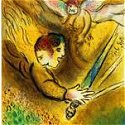
11.21.22 (Cheshvan 27, 5783) "Whatever does not proceed from faith is sin" (Rom. 14:23). Sin is not so much disobedience to an external code of behavior, however, as much as it is abandoning your trust, your identity, and your hope as a beloved child of God. As you believe so you will behave, and as you behave so you believe... Therefore one of the greatest of sins is to forget the truth of who you really are – a beloved and redeemed child of God! The great temptation of sin is rooted in the lie that we are unworthy people, that God does not really loves us (just the way we are), that He is disappointed in us, and so on. "Self-rejection is the greatest enemy of the spiritual life because it contradicts the sacred voice that calls us the "Beloved." Being the Beloved constitutes the core truth of our existence" (Nouwen). Forgetting who you are leads to forgetting who the Lord is, just as forgetting who the Lord is leads to forgetting who you are.... Therefore the Lord constantly tells us to remember and not to forget the call of his heart, the message of his love.
Sin seduces people to destroy themselves, since it first of all seeks to disown, impugn, and reject what is most important for spiritual life. The devil seeks to murder and destroy all that we need to be eternally healed... And though we might want to escape from this conflict (or to pretend that it's not really here), the battle is intractably real and must be fully engaged until our redemption is complete (1 Pet. 5:8-9). Meanwhile, spiritual struggles can be downright ugly. Would any one deny that the cross of Messiah was a sacred space - and yet it was precisely from there, from the place of blood and suffering and pain and terror, that the grace, beauty, and strength of God for us would shine forth.
To effectively combat the devil, let us first of all pray to the LORD God Almighty and ask for His power, wisdom, and grace to deal with the evil one's devices and strategies used against us (Eph. 6:11-18; Rom. 13:12, 1 Thess. 5:8; 2 Cor. 10:4-5). Since we are not to be ignorant of the devil and his devices (2 Cor. 2:11), let us particularly ask God to remind us of who we really are in the Messiah, and to give us the power of the Holy Spirit to genuine walk in the truth of our sacred identity as his beloved. Let us ask God to help us practically apply the victory given to us in the resurrection of Yeshua. With God's help, may we be bold to take our place at His banqueting table, assured that we are indeed His dear children...
Hebrew Lesson
Proverbs 4:23 reading (click):
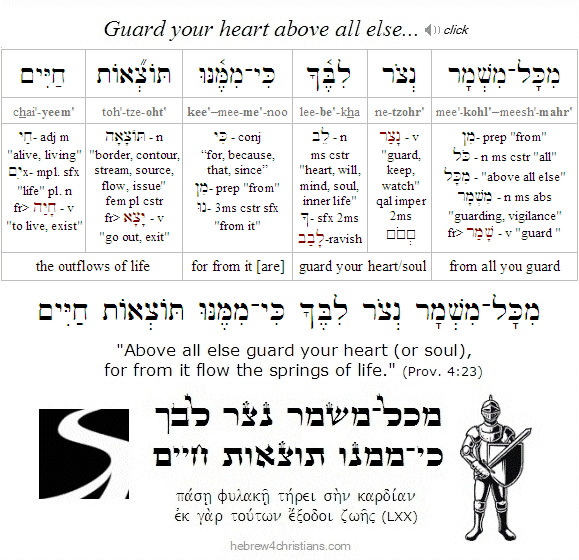 |
The Oath of Blessing...
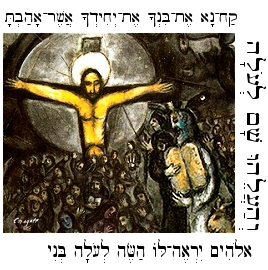
[ The following is related to this week's Torah reading, parashat Toldot... ]
11.21.22 (Cheshvan 27, 5783) In Torah portion Toldot we learn that the oath of blessing that God gave to Abraham was extended (exclusively) to his beloved son Isaac (Gen 26:3-4; Rom. 9:7, and not to Ishmael who was born of Hagar. Recall that it was only after the Akedah (the sacrifice of Isaac) that the LORD God swore the oath (שְׁבוּעָה) that through Abraham would all the families of the earth be blessed: "By myself I have sworn, declares the LORD, because you have done this and have not withheld your son, your only son (ben yachid), I will surely bless you... and in your offspring shall all the nations of the earth be blessed, because you have obeyed my voice" (Gen. 22:16-18; cp. Gal. 3:9,16). The phrase, "by myself have I sworn" (בִּי נִשְׁבַּעְתִּי) is the most solemn oath God could make and is regarded as an inviolable vow (Heb. 6:13-18). The Targum Yonatan reads, "By my Word have I sworn, says the Lord, because you have done this thing, and have not spared your only son... that all the peoples of the earth shall be blessed through the righteousness of your son because you have obeyed My word." It is nothing short of astounding to realize that the very existence of Israel and the Jewish people - and therefore the advent of the Messiah himself - derives from the Abraham's willingness to sacrifice his "only begotten son," an act of faith that constituted the revelation of "deeper Torah" later enshrined in the laws of sacrifice given at Sinai.
That is why the key idea of the Torah centers on the idea of atoning sacrifice, and in particular, the continual sacrifice of the lamb. Indeed atonement is the central theme of the central book of Torah, i.e., Leviticus, where we are called to draw near to God through sacrificial rites, the foremost being the ongoing offering (i.e., korban tamid: קָרְבַּן תָּמִיד) of a defect-free male lamb, together with unleavened bread and wine. The LORD called this "My offering, My bread" (Num. 28:1-8). In other words, the very center of the Torah is the altar that constantly prefigured the Lamb of God who would be offered up to secure our eternal redemption (John 1:29; Heb. 9:11-12). Yeshua is our "lamb offered in the morning and in the evening," and His sacrificial life embodies God's passion for you to receive his love.
The ultimate message of the Akedah is that the sacrifice of the Promised Seed gives life to Israel - and to all who likewise share the faith of Abraham, the father of all who trust in God's promises (Rom. 4:11-22). Israel did not become a nation at Sinai but rather was born out of the sacrifice of the promised seed. This is why Paul made the point that the promise of blessing - received by faith - predated the giving of the law:
For the promise to Abraham and his offspring that he would be heir of the world did not come through the law but through the righteousness of faith. For if it is the adherents of the law who are to be the heirs, faith is null and the promise is void. For the law brings wrath, but where there is no law there is no transgression. That is why it depends on faith, in order that the promise may rest on grace and be guaranteed to all his offspring -- not only to the adherent of the law but also to the one who shares the faith of Abraham, who is the father of us all, as it is written, "I have made you the father of many nations" -- in the presence of the God in whom he believed, who gives life to the dead and calls into existence the things that do not exist. (Rom. 4:13-17)
Just as Abraham was declared righteous by trusting in the promises of God (symbolized by the sacrifice of his son), so are we made partakers of his blessings by trusting in the One who sacrificed His only begotten Son and raised Him from the dead. Amen. May the Name of the LORD our God be exalted forever and ever...
Hebrew Lesson:
Psalm 105:1 Hebrew Reading (click):
Blessed Hunger and Thirst...

11.20.22 (Cheshvan 26, 5783) Our Lord said: "Blessed are those who hunger and thirst for righteousness..." (Matt. 5:6). Yes, blessed are those who suffer such desperate need, who know inner emptiness, who are not made numb to the ache, and who cry from the heart for deliverance. Blessed are those who are in dread over themselves, who fall as one dead before the Divine Presence, who know they are undone, ruined, and dying for life... The great danger, spiritually speaking, is to become complacent, untouched by poverty of heart, to be lulled asleep, lost within a dream, made comatose, living-yet-dead. The gift of faith first reveals our own lostness and then imparts courage to live with ourselves despite ourselves as we seek God's healing and life... Let us press on, dear friends.
Hebrew Lesson
Psalm 42:2 reading (click):
The Month of Dreams...

11.20.22 (Cheshvan 26, 5783) This Wednesday, Nov. 23rd (after nightfall) marks "Rosh Chodesh Kislev" (which occurs for two days this year, on Thanksgiving). On the Biblical calendar the month of Kislev (כִּסְלֵו) is the ninth of the year (counting from Nisan), and it is also one of the "darkest," with the days progressively getting shorter and the nights getting progressively longer. Kislev is perhaps best known for the eight day holiday of Chanukah (חג החנוכה) which begins on the 25th of the month (Sun. Dec. 18th) and runs through the third day of the following month (of Tevet). Since there is always a new moon during the season of Chanukah, it is no wonder that this holiday represents an appropriate time to kindle the lights of faith, and especially to recall the advent of Yeshua the Messiah, the Light of the World (אוֹר הָעוֹלָם).
יְהִי רָצוֹן מִלְּפָנֵיךָ יהוה אֱלהֵינוּ
וֵאלהֵי אֲבוֹתֵינוּ שֶׁתְּחַדֵּשׁ עָלֵינוּ חדֶשׁ טוֹב
בַּאֲדנֵינוּ יֵשׁוּעַ הַמָּשִׁיחַ אָמֵן
ye·hee rah·tzohn meel·fah·ney'·kha Adonai E·loh·hey'·noo
vei·loh·hei a·voh·tey'·noo she·te·cha·deish ah·ley'·noo choh'·desh tohv
ba'a·doh·ney'·noo Ye·shoo'·a ha·mah·shee'·ach ah·mein

"May it be Your will, LORD our God and God of our fathers,
that you renew for us a good month
in our Lord Yeshua the Messiah. Amen."

Download Blessing Card
Chodesh Kislev is sometimes called the "month of dreams" because the weekly Torah portions for this month contain more dreams than any other in the Scriptures. No less than nine dreams (of the ten in the Torah) appear in the four portions of Vayetzei, Vayishlach, Vayeshev, and Miketz - all of which are usually read during the month of Kislev. In the Torah, the primary figure connected with dreams is Jacob's son Joseph, who was nicknamed by his brothers as "that dreamer" and who was later named "Decipherer of Secrets" (Tzofnat Paneach) by Pharaoh (Gen. 41:45). Joseph was able to authentically mediate the spiritual and the physical realms through the Spirit of God within him (Gen. 41:38). Prophetically Joseph represents Yeshua the "disguised Egyptian" who likewise was rejected and hated by his brothers but who later became their savior (for more see "Mashiach ben Yosef").
For more on this subject, see "Chodesh Kislev."
Hebrew Lesson
Psalm 105:19 reading (click):
Parashat Toldot - תולדת
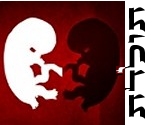 |
11.20.22 (Cheshvan 26, 5783) Last week's Torah portion (i.e., Chayei Sarah) told how Abraham's servant Eliezer (אֱלִיעֶזֶר) sought a bride for Isaac from among Abraham's relatives living in Mesopotamia. In response to his prayer to the LORD, Eliezer was shown that Abraham's nephew's daughter Rebekah (i.e., Rivkah bat-Betu'el: רִבְקָה בַּת־בְּתוּאֵל) was chosen to be one of the four matriarchs of Israel (i.e., arba imahot l'Yisrael: אַרְבַּע אִמָּהוֹת לְיִשְׂרָאֵל).
This week's reading (i.e., parashat Toldot) continues the story by revealing that Isaac and Rebekah had been married for twenty years but were still without an heir to carry on the family line. Finally their prayers were answered and Rebekah conceived, though not without complications. When she inquired of the LORD about her travail, God told her that she was carrying twins that would be heads of two rival nations, but the younger child would in fact become the promised heir of the chosen people.
When the day arrived for Rebekah to give birth, the first child came out "red and covered with hair," so they called his name "Esau" (i.e., esav: עֵשָׂו, "hairy"); and then his twin brother came out with his hand grasping Esau's heel (i.e., akev: עָקֵב), so they named him "Jacob" (i.e., ya'akov: יַעֲקב), from the Hebrew verb (i.e., akav: עָקַב), meaning "to take by the heel; to displace; to supplant."
The Torah then says that Esau grew up to become a crafty hunter (i.e., ish yodea tzayid: אִישׁ יֹדֵעַ צַיִד), "a man of the field" (אִישׁ שָׂדֶה) while Jacob became "a wholesome man" (i.e., ish tam: אִישׁ תָּם) who "dwelt in tents" (יֹשֵׁב אֹהָלִים). Isaac favored Esau (וַיֶּאֱהַב יִצְחָק אֶת־עֵשָׂו); because he had a taste for game (כִּי־צַיִד בְּפִיו), but Rebekah favored Jacob (וְרִבְקָה אֹהֶבֶת אֶת־יַעֲקֹב) because she believed the prophecy given before the children were born...
The portion then gives us a look at the spiritual life of the two boys. According to tradition, on the day of the funeral of their grandfather Abraham, Jacob was cooking lentil soup for Isaac, the traditional mourner's meal. Esau rushed in from a hunting expedition, exhausted and hungry. He then begged Jacob to give him some of "that red stuff" (i.e, ha'dom hazeh), but Jacob answered that he would give him some only if he would sell him his birthright. Esau agreed to the terms and discounted his birthright as being worth only a "bowl of beans" (on account of this incident, Esau was given the nickname of "Red" (i.e., אֱדוֹם "Edom"). In this manner the Torah describes how Esau "despised the birthright" (Gen. 25:34).
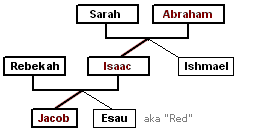 |
Years later, when Isaac was old and blind, Jacob (with his mother Rebekah's help) tricked Isaac into conferring the blessing of the firstborn (בִּרְכַּת בְּכוֹר) upon him, thereby making Jacob the heir of the family, and not Esau. When the ruse was discovered, however, Esau sought to kill his brother, and Jacob was forced to flee his home, never to see his mother again...
Hebrew Lesson:
Gen. 25:19 Hebrew Reading (click):
Torah of Comfort...

11.18.22 (Cheshvan 24, 5783) "No one ever told me that grief felt so much like fear" (C.S. Lewis). We naturally feel sorrow when we experience loss in our lives, though we may experience a sort of consternation, too, since the very ground beneath our feet may seem to fall away, us leaving us feeling alienated and terribly alone. Over time our grief can make us numb and disconnected. We draw inward, afraid that whatever we love will be taken from us... As someone once confided: "Each loss makes a little hole in you; after awhile, they all add up, and there's just a gaping hole where your heart used to be."
We must go through the desert before we can live the promise. Since experiencing loss is part of life in a fallen world, we must first acknowledge our troubles and sorrows. "Don't call me Naomi ("my delight") but Mara ("bitterness"), for the Almighty has dealt very bitterly with me (כִּי־הֵמַר שַׁדַּי לִי מְאֹד). I went out full, but the LORD hath brought me home empty" (Ruth 1:20-21). Once we give voice to our pain (and that might have to be done over and again) the heart can reopen to hope once again. We then can turn to God and learn to live in the moment, trusting him to help us through the troubles of the day (Matt. 6:34).
"Every time there are losses, there are choices to be made. You choose to live your losses as passages to anger, blame, hatred, depression and resentment, or you choose to let these losses be passages to something new, something wider, and deeper" (Henri Nouwen).
There is a spiritual principle that can help us through our grieving and brokenness. When we care for others who have the same distress we ourselves feel, God will bestow the comfort we give and impart it back to us as well: tefillati al-cheki tashuv (תְּפִלָּתִי עַל־חֵיקִי תָשׁוּב) - "may my prayer return upon my own breast" (Psalm 35:13). "Blessed are the merciful, for they shall obtain mercy" (Matt. 5:7). As we give of our heart in compassion to another, so we will receive compassion in our own brokenness. Indeed we often receive far more than we give when we comfort others in their afflictions and help bind up their wounds. Showing kindness to others who are hurting helps them bear their burdens and so fulfills the law of Messiah (Gal. 6:2). Our wounds fill us the sufferings of Messiah and reveal God's heart of mercy: "Blessed be the God and Father of our Lord Yeshua the Messiah, the Father of mercies and God of all comfort, who comforts us in all our tribulations so that we may be able to comfort those experiencing any trouble with the comfort with which we ourselves are comforted by God" (2 Cor. 1:3-4).
"When we honestly ask ourselves which person in our lives mean the most to us, we often find that it is those who, instead of giving advice, solutions, or cures, have chosen rather to share our pain and touch our wounds with a warm and tender hand. The friend who can be silent with us in a moment of despair or confusion, who can stay with us in an hour of grief and bereavement, who can tolerate not knowing, not curing, not healing and face with us the reality of our powerlessness, that is a friend who cares." (Henri Nouwen: Out of Solitude)
It may seem counterintuitive and even absurd to the everyday mind, but our losses help us discover what really matters in life, and that is a great blessing, a gift... "Blessed are they that mourn." The bereavements of our lives, the small disappointments as well as the major heartaches, teach us to let go and yet keep love alive within us. Life is fleeting, fragile, and precious, and we come to know this in the poignancy and heartache of the moment. When we open our eyes each morning and recite modeh ani, "I confess before You," we have opportunity to believe in God's faithfulness (Lam. 3:22-24). "There are two great days in a person's life - the day we are born and the day we discover why" (William Barclay).
Sometimes there are sorrows and inner wounds that never seem to heal, despite our prayers for mercy and consolation. Then it becomes a matter of faith, that despite our present darkness, healing will ultimately come to us, perhaps when we are in heaven. Faith finds courage to go on living in hope, despite all temporal loss, fear, and abandonment. The groan of your heart is sacred, expressing a wound that binds you to the Healer of your life. "Blessed are they that mourn - for they shall be comforted" (Matt. 5:4). We all must walk through the "valley of the shadow of death" to find hope on its other side, but it is only by passing that way can we know the Name of God as the "I-AM-with-you-always."
"There is nothing that can replace the absence of someone dear to us, and one should not even attempt to do so. One must simply hold out and endure it. At first that sounds very hard, but at the same time it is also a great comfort. For to the extent the emptiness truly remains unfilled one remains connected to the other person through it. It is wrong to say that God fills the emptiness. God in no way fills it but much more leaves it precisely unfilled and thus helps us preserve -- even in pain -- the authentic relationship." - Dietrich Bonhoeffer
Hebrew Lesson:
2 Cor. 1:3-4 reading (click):
Note: For more on this topic, see "The Sickness Unto Life..."
Thanksgiving and Sukkot...
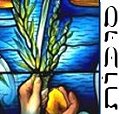
11.18.22 (Cheshvan 24, 5783) The American holiday of Thanksgiving (חַג הַהוֹדָיָה) likely has its roots in the Jewish tradition of giving thanks to God, and some historians believe that the early "Pilgrims" actually derived the idea for the holiday from the Biblical festival of Sukkot (i.e., "the feast of Tabernacles"). Before fleeing to the "New World," the Pilgrims lived for a decade among the Sephardic Jews in Holland, since Holland was considered a safe haven from religious persecution at the time. Since the Pilgrims were devout Calvinists and Puritans, their religious idealism led them to regard themselves as "new Israel," and it is likely that they learned that Sukkot commemorated the people of Israel's deliverance from their religious persecution in ancient Egypt at that time. After they emigrated to the "Promised Land" of America, it is not surprising that these Pilgrims may have chosen the festival of Sukkot as the paradigm for their own celebration. As the Torah commands: "Celebrate the feast so that your generations may know that I made the people of Israel dwell in booths when I brought them out of the land of Egypt: I am the LORD your God" (Lev. 23:39-43). The devout Pilgrims regarded their perilous journey to the new world as a type of "Exodus event" and therefore sought a Biblical holiday to commemorate their safe arrival in a land full of new promise...
It is interesting to note that the Hebrew word for "turkey" is tarnegol hodu (תַּרְנְגוֹל הוֹדו), literally, "Indian chicken," which is often shortened to hodu (הוֹדוּ). It is a happy coincidence that we customarily eat turkey on Thanksgiving, and this reminds us of the "thanks" connection: "Give thanks (hodu) to the Lord for he is good," for His love endures forever."
הודו ליהוה כי־טוב
כי לעולם חסדו
hoh·doo · la·Adonai · kee-tohv
kee · le·oh·lahm · chas·doh

"Give thanks to the LORD for He is good;
for His love endures forever."
(Psalm 136:1)

Hebrew Lesson:
Psalm 136:1 Hebrew Reading:
Note: For more on this subject, see "Thanksgiving and Sukkot."
God's Sovereign Power....

11.18.22 (Cheshvan 24, 5783) Don't allow worldly disinformation and propaganda to define what reality is for you... Though you may feel disheartened and exasperated over the state of the evil political schemes of human beings, remember that the light of our God shines forth in resplendent glory; his power is unrivaled, and his love endures forever... Our God works all things together for good; "indeed, the LORD of all power (יהוה צבאות) has a plan, and who can possibly frustrate it? His hand is ready to strike, and who can possibly stop it?" (Isa. 14:27). Amen, as it is written: "There is no wisdom nor understanding nor counsel that can prevail against the LORD" (Prov. 21:30). So take heart: be strong and of good courage. Do not be afraid even if an army encamps against you; be confident even though war rises in this hour (Psalm 27:3). Walk in the Light of God's Presence and be confident of his blessing. Do not be afraid and do not be dismayed, for the Lord your God is with you wherever you go!
Hebrew Podcast
Proverbs 21:30 reading with commentary (click):
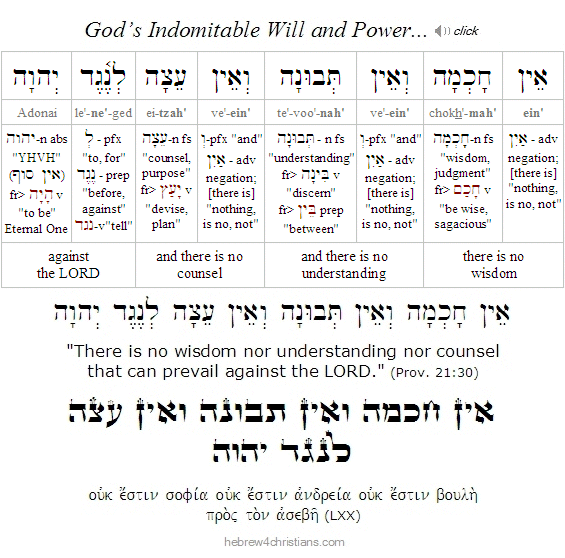 |
The Death of Sarah...
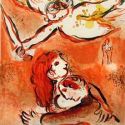
[ The following entry is related to this week's Torah reading, parashat Chayei Sarah... ]
11.18.22 (Cheshvan 24, 5783) Recall that Sarah gave birth to Isaac when she was 91 years old (Gen. 17:17, 21), and she later died when Isaac was 36 years old, at the age 127 (Gen. 23:1). And while the Torah does not explicitly state the cause of her death, we are told about her death following the dramatic episode of the sacrifice of Isaac (Gen. 22), and the midrash Tanchuma therefore links the two together by saying Sarah died from shock after learning about the ordeal of her son at Moriah. It was just too much for her heart to bear: "And a sword will pierce through your own soul also..." (Luke 2:35). Therefore Jewish tradition associates the cries of Sarah with the blasts of the shofar during Rosh Hashanah. The broken notes of the shofar are thought to recall her crying for her son...
Isaac was the first "Jewish baby" born to the world, the promised son, the miracle child and the heir of Abraham. As the firstborn son of God's promise, without him the whole world would fall apart, and there would be no salvation to come... So when Sarah heard that Isaac was offered at Moriah, her soul departed from her and she thought the world was falling apart. She prayed to God: "Let me die for my son; let me die in place of my son..." Sarah's love was so great it brought Isaac back to life from the dead.
Understand that we study Torah and the lives of the patriarchs because it is part of our great yerushah (יְרוּשָׁה), our heritage, in Messiah Yeshua... The Torah tells our story as the people of God; it is the context and framework of the entire Bible. As it says: "Listen to me, you who pursue righteousness, you who seek the LORD (שִׁמְעוּ אֵלַי רֹדְפֵי צֶדֶק מְבַקְשֵׁי יְהוָה): look to the rock from which you were hewn, and to the quarry from which you were dug. Look unto Abraham your father and to Sarah who bore you; for he was but one when I called him, that I might bless him and multiply him" (Isa. 51:1-2).
Hebrew Lesson:
Isaiah 51:2a Hebrew reading (click):
Surrendering to God...
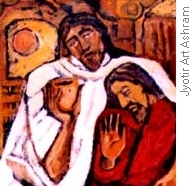
11.17.22 (Cheshvan 23, 5783) "Father, if you are willing, remove this cup from me; nevertheless, not my will, but thine be done" (Luke 22:42). This is the consummate expression of a heart fully surrendered to the care of God, because there is nothing more common than the impulse for self-preservation, and yet here we behold the sacrifice of Yeshua's very soul (מְסִירַת הַנֶפֶשׁ יֵשׁוּע) as he willingly offered himself up to suffer and die an agonizing death upon the cross - all in loving deference to his Father's will.
Surrendering your will to the care of God is the essence of "bittachon" (בִּטָחוֹן), that is, trusting that God is in control of your life and will personally care for you, no matter what. Some people have an evil will that does not tolerate any contradiction or opposition; others attempt to surrender to God but their impatience belies their willingness to do so. The truly good will is simple and forthright, seeking the "beauty of the LORD" (Psalm 27:4). When hindered, the baal bittachon (trusting soul) says from his innmost depths, "I am content with whatever you give to me: Thy will be done."
We sometimes think we know God's will us, yet we find ourselves stymied or blocked in our doing so. In every case, however, we must seek first God's will and submit him (Matt. 6:33). The Lord may thwart even our best intentions to reveal his surpassing wisdom regarding the matter, however. For instance, recall Peter's appeal to the Lord to turn away from the way of the cross (Matt. 16:21-23). Yeshua minced no words, saying to him: "Get behind me, Satan! You are a hindrance to me. For you are not setting your mind on the things of God, but on the things of man." And then he turned to the other disciples present and said to them: "If anyone wants to be my follower, let him disown himself and take up his cross and follow me. For whoever wills to save his life will lose it, but whoever loses his life for my sake will find it."
Because Peter did not realize the redemptive mission of Yeshua as the "Lamb of God" who would suffer, be killed, and ascend from the dead, he impulsively began to rebuke Yeshua by judging that it would be better for Yeshua to avoid such trouble from the leaders of Israel by taking a different approach, perhaps by attempting to "win them over" to the idea that he was Israel's promised Messiah. We are not sure what Peter was thinking, of course, but it is likely that he strongly believed - mistakenly enough - that what he esteemed as good was God's will... Peter needed to be humbled and to trust that God's unfathomable plan was best. He was faced with the decision whether he would crucify his own will or to lose himself through self-deception. Yeshua promised that those who were willing to surrender to him would find salvation and peace as they walked in trust of God's love and care for them. Amen.
Hebrew Lesson
Jeremiah 17:7 reading (click):
Heart that won't let go...

11.17.22 (Cheshvan 23, 5783) Faith perseveres in the way of life... "You who have cleaved to the LORD your God are all alive today" (Deut. 4:4). In Hebrew someone who cleaves is "davek" (דָּבֵק), that is, one who sticks it out and won't let go, like Jacob who held on for dear life as he struggled with the Angel... The Modern Hebrew word for "glue" is devek (דֶבֶק) which comes from the same root, as does the Yiddish word "davka,"a word that means (among other things) purposeful resolve or willful intent.
The related Hebrew word "devakut" (דְּבָקוּת) means to spiritually (and emotionally) bind yourself to God. It is a word of raw communion. It means taking hold of God with all your heart, soul, mind, and strength. It is a stubborn bond that won't let go. Devakut, then, implies being intimately connected with God in an earnest and passionate relationship....
The sages comment that we are able to cleave to God only one day at a time, since our future is conditioned upon this present day and its challenges. As Yeshua said: "Take therefore no thought for tomorrow: for tomorrow shall take thought for the things of itself. Sufficient for the day its own trouble" (Matt. 6:34). One day at a time. The LORD gives us daily bread (לֶחֶם חֻקֵּנוּ) so that we may persevere for this day; he "feeds us with hunger" to teach us to rely on alone him for true life (Deut. 8:3). Our "work" is to need God, to cry out for his touch, to abandon ourselves to his care.
"For he is our God, and the sheep of his hand today -- if you hear his voice" (Psalm 95:7). Today, if you hear his voice, do not harden your heart (Heb. 3:15). "Take care, brothers, lest there be in any of you an evil, unbelieving heart, leading you to fall away from the living God, but encourage one another every day, as long as it is called "today," so that none of you may be hardened by the deceitfulness of sin" (Heb. 3:12-13).
דָּבְקָה נַפְשִׁי אַחֲרֶיךָ
בִּי תָּמְכָה יְמִינֶךָ
dah'·ve·kah · naf·shee · a·cha·rey'·kha
bee' · tahm·khah · ye·mee·ne'·kha

"My soul clings to you;
Your right hand upholds me." (Psalm 63:8)
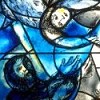
Hebrew Lesson:
Deuteronomy 4:4 reading (click):
Redeeming the Time...
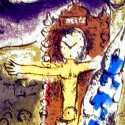
11.16.22 (Cheshvan 22, 5783) In Torah portion Chayei Sarah we read about the death of Abraham, the original patriarch of the Jewish people and great hero of faith:"These are the days of the years of the life of Abraham (יְמֵי שְׁנֵי־חַיֵּי אַבְרָהָם), which he lived..." (Gen. 25:7). It is interesting to notice that this verse mentions Abraham's days (yamim: ימים) but then goes on to state the number of years (shanim: שנים) that he lived. Why, then, does the verse mention the word "days" at all? Moreover, the verse includes the seemingly redundant clause, "which he lived" (אֲשֶׁר־חָי), an addition that appears to be unnecessary to the meaning. Since the sages assumed that there were no unnecessary words revealed in the Torah, however, they discussed why the verse was written this way....
When we reckon a person's life span, we (objectively) refer to their physical longevity in terms of years. This is why we celebrate birthdays, after all, and that's why we refer to someone as being so many years old. Jewish tradition recognizes calendar years, of course (our verse states that Abraham lived 175 years), though the sages understood time primarily in terms of "length of days." When the patriarch Isaac died, for example, the Torah says he was "gathered to his people - זָקֵן וּשְׂבַע יָמִים - "old and full of days" (Gen. 35:29). The sages defined a day (yom: יְוֹם) in terms of the total time of daylight (measured from sunrise to sunset), and defined an hour (sha'ah: שָׁעָה) by dividing that time into 12 equal parts, called a "proportional hour" (sha'ah zemanit: שעה זמנית). Each proportionate hour was then divided into 1080 "parts" (chalakim: חלקים), and each part (chelek: חֵלֶק) was further divided into 76 "moments" (rega'im: רגעים). In other words, the sages measured time by increasingly smaller units (yechidut: יְחִידוּת), and these days, hours, "parts," and moments were used to objectively measure time (interestingly, modern science likewise "divide times" down to the smallest of units, measuring the length of time required for light to travel in a vacuum, i.e., "Planck time." In other words, space and time are known through observing light).
Life is surely more than a quantitative measurement of time, however. What good is a physically long life without a relationship with God? Is it not "vanity of vanities," a "tale told by an idiot, full of sound and fury, signifying nothing," as Shakespeare once said? Time finds its qualitative meaning, its purpose, and its direction only in relationship with God, who is the "beginning, the middle, and the end." Our personal histories likewise have a beginning, middle, and an end that together form a "story" about who we are.... Your life is "going somewhere," and each moment of your day is your means to that end. Each moment leads inexorably to the next, and together these moments form hours, days, and the "days of the years." Teshuvah (repentance) is a conscious choice to turn to God amidst the flux of passing time in order to awaken to the realm of the eternal. Therefore we see the greatest of the tzaddikim (such as Abraham) living out the "days of the years" in conscious awareness of eternity, and of his ultimate destination: "By faith Abraham obeyed when he was called to go out to a place that he was to receive as an inheritance. And he went out, not knowing where he was going. By faith he went to live in the land of promise, as in a foreign land, living in tents with Isaac and Jacob, heirs with him of the same promise. For he was looking forward to the city that has foundations, whose designer and builder is God" (Heb. 11:8-10). Faith affirms that underlying the "surface appearance" of fleeting time (z'man cholef: זמן חולף) is a deeper reality that is ultimately real and abiding (z'man nitzchi: זְמַן נִצְחִי). It "sees what is invisible" (2 Cor. 4:18) and understands (i.e., accepts) that the "present form of this world is passing away," like so many seconds ticked off a clock (1 Cor. 7:31). Time in this world (olam hazeh: עולם הזה) is linear, with a beginning and end in the world to come (olam ha'ba: עולם הבא).
Time is God's gift to us, as well as a test... The story is told about how a man once spied the Vilna Gaon sitting at a table in the evening, weeping over a small piece of paper he had pulled from his pocket. After he wiped away the tears, the Gaon got up and left the room, leaving the paper on the table. The man who oversaw this then went over to look at the piece of paper and saw just seven dots marked on it, nothing else. Overcome by curiosity, the following morning the man asked the Gaon what the paper meant and why it made him cry. The Gaon then explained that each evening he would review how he used his time that day. For every moment he wasted, he would mark a dot on a piece of paper. At the end of the day he would look at the paper and ask God's forgiveness for wasting the time.
The point of the story is that time is a precious gift, and how we choose to live each moment makes an eternal difference in our lives. As Moses prayed to God: "Teach us to number our days aright, so that we attain a heart of wisdom" (Psalm 90:12). We obtain such wisdom (chochmah: חָכמָה) through the study of Torah (talmud torah: תלמוד תורה): "And you shall meditate upon (the Torah) day and night" (Josh. 1:8). As disciples (talmidim: תַּלְמִידִים), we must study the Scriptures to show ourselves approved before God (2 Tim. 2:15). But study alone is not enough. We must practice the truth and walk it out in our daily lives: "Only take care, and keep your soul diligently (שְׁמֹר נַפְשְׁךָ מְאֹד)... Turn not away from your heart all the days of your life" (כֹּל יְמֵי חַיֶּיךָ, Deut. 4:9). Amen. "Above all else guard your heart, for from it are the outflows of life" (תּוֹצְאוֹת חַיִּים, Prov. 4:23).
Hebrew Lesson:
Psalm 90:12 Hebrew reading:
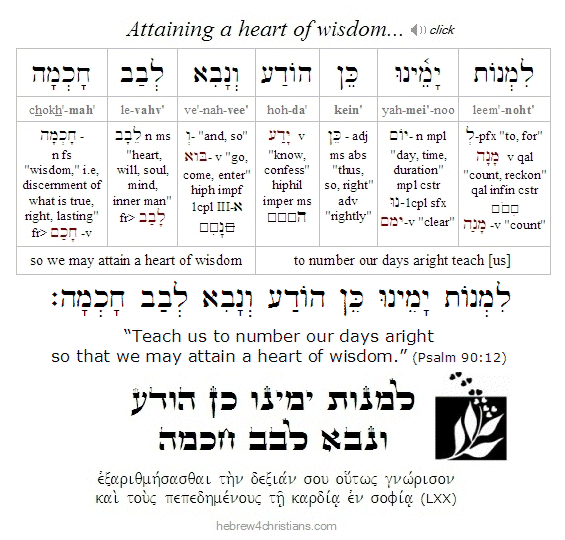 |
As followers of Yeshua, we are commanded to "redeem" (ἐξαγοράζω) the time, because the days are evil (Eph. 5:16; Col. 4:5). The Greek word used here implies exchanging the fleeting moments of the day (z'man cholef: זמן חולף) with the eternal consciousness (z'man nitzchi: זְמַן נִצְחִי) that we will one day stand before the Judgment Seat of Messiah and give account for the "length of our days" (Matt. 12:36-37).
May the LORD help us wake up and refuse to exchange the eternal treasure (otzar nitzchi: אוֹצָר נִצְחִי) of the Kingdom of God for the fleeting vanities of this world (havalim cholefim: הֲבָלִים חוֹלְפִים). As the late Jim Eliot succinctly reminded us, "He is no fool who gives what he cannot keep to gain what he cannot lose." אמן, עזור לנו אלוהים - "Amen, help us O God."
Love's Reason for Being...
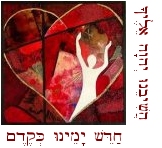
11.16.22 (Cheshvan 22, 5783) During an intense bout of sickness that nearly took her life, Julian of Norwich said that God showed her a "little secret" about an ordinary hazelnut. As she considered the vision of the hazelnut, she wondered, "What may this be?" and God answered her heart's pondering: "It is all that is made..."
Julian then realized that the secret of the thing was not found in what it was, but in how it had its being. "In this little thing I saw three properties. The first is that God made it, the second is that God loves it, and the third, that God keeps it." She then reasoned that if something exists, it is because God loves it into being, and therefore everything that exists is what it is because of the love of God who sustains and upholds it. What makes something real is God's love, for love is the ground and context of all that exists.
This simple yet profound thought applies to our own lives as well. "What is he indeed that is Maker and Lover and Keeper?" We can only know who we really are in God's love for our souls. And we see God's love for us in the passion of the Lord Yeshua who clothed himself in our likeness to touch and to mediate the cry of our hearts before the Father. Amen, Yeshua is the one who brings us into God's heart, "Between God and the soul there is no between."
"I saw that He is to us everything that is good: God is our clothing that wraps, clasps and encloses us so as to never leave us, being to us everything that is good." Amen. God loves us with an everlasting love; his love draws us unto his heart.
Hebrew Lesson
Jeremiah 31:3b reading (click):
Enduring Ourselves...

11.16.22 (Cheshvan 22, 5783) Spirituality is lived now, in this world... "I do not ask that you take them out of the world, but that you keep them from the evil one" (John 17:15). We are "in but not of" the world; we are part yet also not part of it... This is the tension of living in the realm of the "already-not-yet." We are haunted by a sense of incompletion - a yearning for the fulfillment of our salvation, an inner ache that helps focus the heart's affections...
A paradox of the spiritual life is that we must descend to ascend... We enter at the "straight gate" of humility and brokenness. We all sin; we all fall short. First we must accept our own "dark side" -- our own sinful nature -- before we can ever come to know the light... This is the path of confession - acknowledging the truth about who we really are, which is the only way we can learn to "endure ourselves" and eventually let go of our shame. We find ourselves when we give up our defenses and take hold of God's compassion. We all have our sins; now we must find our courage in God's love.
כִּי־פְשָׁעַי אֲנִי אֵדָע
וְחַטָּאתִי נֶגְדִּי תָמִיד
kee'-fe·shah·ai · a·nee · ei·dah
ve·chat·ta·tee · neg·dee · ta·meed

"For I know my transgressions,
and my sin is ever before me." (Psalm 51:3)

Hebrew Lesson:
Psalm 51:3 Hebrew Reading (click):
We must learn to "endure ourselves..." We can't deny who we are; we can't pretend to be what we are not. The root of shame is self-rejection. This is the hidden anguish of heart that leads many of us astray. As Henri Nouwen said, "There are two extremes to avoid: being completely absorbed in your pain and being distracted by so many things that you stay far away from the wound you want to heal." We don't come to the cross to destroy ourselves but to find deliverance and life: our brokenness is a means to this greater end. We "take up the cross daily," which means learning to forgive and endure ourselves... As Tillich reminds us: "The courage to be is the courage to accept oneself as accepted in spite of being unacceptable..." Living in the truth of God's inestimably great love for us, and exercising faith in the reality of His gracious presence, is to walk as his disciple, even if we are currently battling darkness, fear, or feel lost inside ourselves.
In this age, we are part of a seemingly endless journey of falling down and getting back up once again. It is this struggle, this "good fight of faith," that eventually ennobles the heart and establishes character... In light of this, we must refuse to lose heart when things appear to be going badly, and likewise we must remain vigilant when things seems to be going well. The goal of the process is always to be in heartfelt, genuine, and earnest relationship with the LORD. As Madame Guyon once wrote, "You are born into the world like an illegitimate child who has no idea who his father is. But God comes and draws you out of your old life. He cleanses you and gives you back your innocence." Amen.
Finding Life Worth Living...
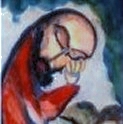
11.15.22 (Cheshvan 21, 5783) The Talmud states that even after the great Flood (הַמַּבּוּל) humanity refused to truly turn back to God (as the present state of this world also attests). In light of the ongoing wickedness of mankind, the early sages Hillel and Shammai engaged in a protracted machlochet l'shem shamayim (מַחְלוֹקֶת לְשֵׁם שָׁמַיִם, "a debate for the sake of heaven") regarding whether it would have been better for humans not to have been created at all... Hillel argued that it was better that humans had been created, whereas Shammai argued the other way. Finally a vote was called for and the decision rendered was this: It would have been better for humans not to have been created than to have been created. However, since we do in fact exist, we must search our past deeds and carefully examine what we are about to do (Eruvin 13b).
In his famous Gifford Lectures regarding the nature of religious belief, the American philosopher William James (1842-1910) described the consciousness of death as "the worm at the core" of all that we hope for in the attempt to find lasting happiness apart from God. He wrote: "Make the human being's sensitiveness a little greater, carry him a little farther over the misery-threshold, and the good quality of the successful moments themselves when they occur is spoiled and vitiated. All natural goods perish. Riches take wings; fame is a breath; love is a cheat; youth and health and pleasure vanish. Can things whose end is always dust and disappointment be the real goods which our souls require? Back of everything is the great specter of universal death, the all-encompassing blackness" (Varieties of Religious Experience).
These are sobering and chilling words, and yet the truth is that death is inevitable for us and therefore it constitutes the central question of our existence in this world. Pleasures, wealth, and worldly ambition do not satisfy us but are like chasing after the wind -- they are "havel havalim" (הֲבֵל הֲבָלִים), the utmost of vanities, as King Solomon said long before the French existentialists ever expressed the idea (Eccl 1:2). We live in a world of constant flux wherein ha'kol over (הכל עובר), "everything passes" and nothing abides. Our lives are as a vapor; our days are troubled and our aspirations fail: "My days are like a shadow that declineth; and I am withered like grass" (Psalm 102:11); "I am fading away like a shadow at the end of the day; I am shaken off like a locust" (Psalm 109:23); "What shall I cry? All flesh is grass, and all the goodliness thereof is as the flower of the field" (Isa. 40:6). "For what is your life? It is even a vapor that appeareth for a little time, and then vanisheth away" (James 4:14).
"What profit hath a man of all his labor which he taketh under the Sun? I looked on all the works that my hands had wrought, and behold, all was vanity and vexation of spirit. For that which befalleth the sons of men befalleth beasts; as the one dieth, so dieth the other; all are of the dust, and all turn to dust again. ... The dead know not anything, neither have they any more a reward; for the memory of them is forgotten. Also their love and their hatred and their envy is now perished; neither have they any more a portion for ever in anything that is done under the Sun. ... Truly the light is sweet, and a pleasant thing it is for the eyes to behold the Sun: but if a man live many years and rejoice in them all, yet let him remember the days of darkness; for they shall be many. All that cometh is vanity." (from Ecclesiastes)
James concludes: "In short, life and its negation are beaten up inextricably together. But if the life be good, the negation of it must be bad. Yet the two are equally essential facts of existence; and all natural happiness thus seems infected with a contradiction. The breath of the sepulcher surrounds it." Such is the ambiguity and despair of the human condition.
Hebrew Lesson:
Ecclesiastes 1:2 Hebrew Reading (click):
In light of such harsh realities of our existence "under the sun," where can we find meaning? Where is hope? If all our dreams eventually turn to dust, where can we find substance, where can we find perpetuity, where can we find life? How can we reconcile our inner hunger for life with the transience and pain associated with our mortal coil? These sorts of questions prepare the heart for the message of the gospel, for the gospel message is always a message given to those who are broken in heart, to those in desperate need of healing.
Does all this imply that despair can be healing or curative? Yes, if it expresses the loss of our idolatrous ideals, visions, and dreams... It is hard to let go of old expectations, to give up cherished fantasies, and to find ourselves in a place of emptiness, but we must go through the desert before we can live the promise. We can only grow spiritually when we let go of our romance with the world, abandoning its vain idols, and awakening to the reality of the Divine Presence. We then can turn to God and learn to live in the moment, trusting him to help us through the temptations of the day. We all must walk through the "valley of the shadow of death" to find hope on its other side, and it is only by passing that way can we know the Name of God as the "I-AM-with-you-always" One.
Death is the central problem of life, and therefore to find a solution we must find something that has more power than death, something that can "untrue" death's lie and restore what was originally intended to be our divine inheritance. This is where the resurrection of Yeshua becomes the center of everything we believe as Christian people. The love of God is stronger than death, the mercy of God triumphs over his justice, and the sacrifice of Yeshua makes us right with all that is eternal, abiding, beautiful, and good.... Because Yeshua lives, we shall live also. The resurrection of Yeshua from the dead vindicates our salvation and secures for us eternal life. We are made alive together with Messiah and now live in an entirely different order of reality, free from the law of sin and death (Rom. 7:4, 8:2). God has "made us alive together with the Messiah" (συνεζῳοποίησεν τῷ χριστῷ) through the resurrection (Eph. 2:5; Col. 2:13). Our union (oneness) with the Messiah means that we are connected with Him in the spirit. "Likewise, my brothers, you also have died to the law through the body of Messiah, so that you may belong to another, to him who has been raised from the dead, in order that we may bear fruit for God" (Rom. 7:4). We are "raised with him through faith in the powerful working of God, who raised him from the dead" (Col. 2:12).
The resurrection foretells of the destiny and future glorification of the believer. "Because I live, you also shall live" (John 14:19). The resurrection ultimately restores us to a condition of eternal righteousness and innocence in olam haba, the world to come. It is therefore the ultimate expression of tikkun olam, the repair of the world, since even the creation "groans" and laments for the completion of salvation (Rom. 8:22). Creation is weeping for our future salvation! The Messiah's resurrection was the "firstfruits" of many that will likewise experience the glorified state (Rom. 8:23, 1 Cor. 15:20). "Beloved, we are God's children now; it does not yet appear what we shall be, but we know that when He appears we shall be like Him, for we shall see him as He is" (1 John 3:2). The goal of salvation was to reconcile the world back to God in love. In the glorious end, יִהְיֶה הָאֱלהִים הַכּל בַּכּל / yihyeh ha-Elohim ha-kol bakol: "God will be all in all" (1 Cor. 15:28).
The resurrection of Yeshua (i.e., techiyat ha-Mashiach: תְּחִיַּת הַמָּשִׁיחַ) demonstrates that God is LORD over all. Only the Master of the Universe can resurrect the dead; only God Almighty can swallow up death in victory, and only Yeshua has conquered the grave (1 Cor. 15:54-55). Indeed, all other world religions were founded by people who are now decomposed in their graves. Yeshua's resurrection demonstrates that He is LORD and His word is truth (Matt. 24:35; Luke 21:33). We can find courage to face hardship and even death because we know that this world is merely a corridor to the world to come. The dead in Messiah will be resurrected, and those who remain and are alive at His coming will be changed and receive new, glorified bodies (1 Thess. 4:13-18). The resurrection guarantees that those who believe in Yeshua will likewise be resurrected to experience eternal life.
Finally, the resurrection of Yeshua means that He is present for you right now. He is not indifferent to your suffering or "too busy" to be bothered by your struggles. On the contrary, He is "sympathetic to our weaknesses" (συμπαθῆσαι ταῖς ἀσθενείαις ἡμῶν) and will help us through the trials (nisayonot) of life (Heb. 4:15). We therefore can come boldly before Him to find grace (χάρις) for our need (Heb. 4:16). Note that the word translated "boldly" in this verse (παρρησίας) means that we can speak freely to God from the center of our hearts -- without fear or shame. Our Savior knows who we are and we do not need to affect an outward show of righteousness in order to obtain His help... The Lord draws near enough to touch us when we draw near to Him (James 4:8). Only a risen and loving Savior can help you through the pain, frailties and temptations of this life; and only living Lord can fill our lives with meaning and purpose so that we are made more than conquerors by means of his great love. Our life in the Lord is never in vain, chaverim....
The most important fact of history, and that which radically transforms everything else - is the resurrection of Yeshua from the dead. Spiritual life means being awake to the risen reality and saving Presence of Yeshua, the One who Overcame and vanquished the power of death. Without Him we are hopeless; with Him we are more than conquerors (1 Cor. 15:14; Rom. 8:37). The resurrection means Yeshua is forever alive, and that today he hears your heart's cry. He is surely able to help you, and nothing can overthrow his invincible will. Our Lord suffered and died for your inner peace and healing, but now death has no hold over him, and he "ever lives to make intercession for you" (Rom. 6:9, Heb. 7:25). He is your compassionate Advocate (παράκλητος, lit. "one called alongside") who gives you heavenly comfort (1 John 2:1). Even more: The very power that raised Yeshua from the dead now dwells in you (Rom. 8:11). The miracle of new life is "Messiah in you - the hope of glory" (Col. 1:27). The Lord will never leave you nor forsake you (Heb 13:5): He "sticks closer than a brother" (Prov. 18:24); He sustains your way, and he will perfect the work of salvation on your behalf (Jude 1:24). In short, there simply is no "gospel" message apart from the resurrection! The resurrection is the victory of God salvation - His everlasting vindication over the powers of darkness - for your life.
Hebrew Lesson:
Psalm 118:17 Hebrew reading (click):
Vanity has an end, chaverim, and this end affects the entire universe. The prophetic future holds hope that salvation will be literally cosmic in its sweep: "For the creation was subjected to vanity (לַהֶבֶל) not willingly, but because of Him who subjected it, in hope that the creation itself will be set free from its bondage to corruption and obtain the freedom of the glory of the children of God" (Rom. 8:20-21). May that day soon come for us, friends! יְהִי שֵׁם יְהוָה מְברָךְ - yehi Shem Adonai mevorakh: "Blessed be the Name of the Lord."
A Bride for the Promised Son...
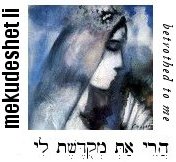
[ The following entry is related to this week's Torah reading, parashat Chayei Sarah... ]
11.15.22 (Cheshvan 21, 5783) Though he is not explicitly named in the account, the "elder servant" commissioned to find a bride for Isaac was undoubtedly Eliezer of Damascus (see Gen. 15:2). Eliezer (אֱלִיעֶזֶר), whose name means "my God will help," is regarded as a consummate example of a godly servant, a picture of the Holy Spirit (רוּחַ הַקּדֶשׁ) sent on a mission to find a bride for the Sacrificed Seed of Abraham (i.e., the Messiah Yeshua). Eliezer dutifully departs on his mission and waits by the "well of water," interceding on behalf of righteousness... He asks for a witness from heaven: "Let the young woman to whom I shall say, 'Please let down your jar that I may drink,' and who shall say, 'Drink, and I will water your camels' -- let her be the one whom you have appointed" (Gen. 24:13-14). Rebekah's response of kindness and generosity (i.e., chesed: חֶסֶד) to a tired wayfarer demonstrated God's choice. Note that the test concerned the inward character of the woman, not her status or beauty or other worldly factors. And since a single camel needs about 25 gallons of water and requires 10 minutes to drink, watering ten camels would require 250 gallons and at least a couple hours of work running back and forth to the well - no small task for anyone! Rebekah possessed Abraham's qualities of gracious hospitality and diligence...
Eliezer's prayer to find a bride for Isaac (the very first recorded prayer of the Torah) did not appeal for a great miracle such as splitting the sea, but instead relied on the providential and "hidden hand" of God that governs the affairs of life (i.e., hashgachah pratit: הַשְׁגָּחָה פְּרָטִית). His prayer at the well relied on God to lead him to a chosen woman who, like his master Abraham, would extend compassion to a person in need (חֶסֶד). The Torah therefore reveals that far from being a coincidence or chance encounter, then, "before he had finished speaking, הִנֵּה רִבְקָה - behold Rebekah..." (Gen. 24:15). "Before they call I will answer; while they are still speaking I will hear" (Isa. 65:24).
Consider for a moment the great character of the woman God chose to be the bride for the Abraham's promised heir... Rebekah was willing to leave her family - all that she knew - based on an "otherworldly" promise. Her response to the invitation was simply: אֵלֵךְ - "I will go" (Gen. 24:58). Her courageous willingness was likewise a characteristic of Abraham who was willing to leave his homeland in search of the greater things of God. Like Abraham, Rebekah chose to be ger ve'toshav (גֵּר־וְתוֹשָׁב) - a "stranger and a sojourner" - who left everything behind in order to become part of God's chosen family...
Hebrew Lesson
Proverbs 31:10 reading (click):
The Life-Giving Fear...

11.15.22 (Cheshvan 21, 5783) In the Torah we read: "And now, Israel, what does the LORD your God ask from you, but to fear the LORD your God, to walk in all his ways, to love him, to serve the LORD your God with all your heart and with all your soul" (Deut. 10:12). Notice that "fear of the LORD," or yirat Adonai (יִרְאַת יהוה), comes first in this list. The sages comment that to fear the LORD means that your fear should be like God's fear. But what could God possibly fear, you ask? Only this: that you will turn away from his love and destroy yourself. To fear God means abhorring that which breaks the relationship He desires with you. That is the wound of God's heart, and that is what God "fears."
Of course there is also the fear of going to hell and suffering God's judgment for sin, but that dreadful outcome is the result of that which God fears, namely, your rejection of his offer of grace and forgiveness given in Yeshua... Nonetheless, believers should also fear sinning against God since that makes a mockery of his love. Why? Because if God so hates sin that he suffered and died for you to be free from its power, what sort of insult is it to continue sinning without experiencing fear and trembling? Consider again the great cost of your salvation (1 Pet. 1:18-19). Yeshua was shamed as a criminal, cruelly beaten, mercilessly flogged, viciously lacerated, and died of asphyxiation upon a cross to intercede for your life and to present his blood as atonement for your sin. He didn't die like this so you could go on sinning with impunity, but to redeem your life from the verdict of the law and to restore your place as child of God. Willfully sinning shows contempt for the sacrifice of Messiah and outrages the spirit of grace: "Someone who rejected the law of Moses was put to death without mercy on the testimony of two or three witnesses. How much worse punishment, do you think, will be deserved by the one who has trampled underfoot the Son of God, and has profaned the blood of the covenant by which he was sanctified, and has outraged the Spirit of grace? For we know the one who said, "Vengeance is mine, I will repay," and again, "The Lord will judge his people." It is a fearful thing to fall into the hands of the living God" (Heb. 10:28-31).
Hebrew Lesson:
Deut 4:24 Hebrew Reading (click):
But be encouraged. It is written that the fear of the LORD is "the beginning of wisdom (רֵאשִׁית חָכְמָה)," but it also the beginning of the experience of God's love... Without the fear of the LORD, you will walk in darkness and be unable to turn away from evil (Psalm 111:10; Prov. 1:7; 9:10; 10:27; 14:27, 15:33; 16:6); you will find yourself alone, in a place of sadness and vexation, of despair and inner pain. The Spirit of God's love plainly declares that "the fear of the LORD leads to life (יִרְאַת יְהוָה לְחַיִּים, lit. "is for life"), indicating that it is a healing passion:
יִרְאַת יְהוָה לְחַיִּים
וְשָׂבֵעַ יָלִין בַּל־יִפָּקֶד רָע
yeer·at · Adonai · le·cha·yeem
ve·sa·vei·'a · ya·leen · bal-yee·pa·ked · ra

"The fear of the LORD is for life,
and whoever has it will rest and not be visited with harm."
(Prov. 19:23)

Hebrew Lesson:
Proverbs 19:23 Hebrew Reading (click):
Some people tend to get this backwards, or they may underestimate the seriousness of the issue. The problem is not that people sometimes sin and therefore risk being sent to hell, but rather that people are incorrigible sinners that presently exist in state of hell... Human nature is incurably sick; the wound of our mortality is indeed fatal (Jer. 17:9; Mark 7:21-23). As Yeshua taught, the way out of bondage to sinful human nature is through the miracle of spiritual rebirth (John 3:3-8; 8:44). When we accept God's love we are delivered from the guilt that justly condemns our souls (Col. 1:13). As it is says "Whoever believes in him is not condemned, but whoever does not believe is condemned already, because he has not believed in the name of the only Son of God" (John 3:18). In other words, unless you truly repent by accepting God's love, you risk an eternally loveless existence... It must be remembered that God does not want any one to perish but for all to be in loving relationship with Him (2 Peter 3:9). "God our Savior desires all people to be saved and to come to the knowledge of the truth" (1 Tim. 2:4). However, "hell is a room locked from the inside," and if you steadfastly refuse to be loved, God Himself will respect your decision...
All this resolves to a sober question about your spiritual identity... Do you believe you are a redeemed child of God? Are you spiritually reborn? Do you accept His love and deliverance, or do you make it conditional, based on your performance? This is not about mere ethics, friends - the world is filled with various kinds of ethical philosophy, after all. No, this is a question about ontology - about who you really are; it's a question about what you are trusting, and it centers on the presence of the miracle within your heart. We are saved by hope (Rom. 8:24).
May you fall before the cross in fear of your sins, but may you be raised up by the reality of God's love for your soul... May you then walk in the awe of God's glorious mercy, "to love him, to serve the LORD your God with all your heart and with all your soul." Amen.
The Vale of Tears...
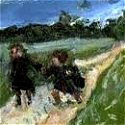
11.15.22 (Cheshvan 21, 5783) The walk of faith refers to trusting in the Presence and love of God for your soul, even though you will suffer and experience various hardships in your life. Yes, we receive comfort from heaven and consolation through the Spirit of God, and yes we are given heavenly wisdom to know the truth that sets us free in Yeshua, however in this life we "see through a glass darkly," which literally means "in a riddle" (ἐν αἰνίγματι). A riddle is an analogy given through some resemblance to the truth, though quite often the correspondences are puzzling and obscure. Hence, "seeing through a glass darkly" means perceiving obscurely or imperfectly, looking "through" something else instead of directly apprehending reality. We see only a reflection of reality, and our knowledge in this life is indirect and imperfect. This is contrasted with the "face to face" (פָּנִים אֶל־פָּנִים) vision and clarity given in the world to come, when our knowledge will be clear and distinct, and the love of God will be fully manifest to us and no longer hidden. Realizing this should make us humble whenever we consider our faith. "Now we know in part, but then shall we know in whole" (1 Cor. 13:12). We often do not have the "answers" for suffering, though "seeing through a glass darkly" means we have the means to trust God despite the present hour.
We must train ourselves to see beyond the realm of appearances, especially regarding matters of the heart. The "outer self" is perishing yet the "inner self" is renewed day by day. Moreover "our momentary affliction is preparing for us an eternal weight of glory beyond all comparison, as we look not to the things that are seen but to the things that are unseen. For the things that are seen are transient, but the things that are unseen are eternal. For we know that if our earthly house, the "tent" we live in, is dismantled, we have a building from God, a house not built by human hands, that is eternal in the heavens" (2 Cor. 4:17-5:1). Amen. Like father Abraham we sojourn in a "land of promise" as "strangers" to this world, looking for a "city that has foundations, whose designer and builder is God" (Heb. 11:9-10). "For here we have no lasting city, but we seek the city that is to come" (Heb. 13:14).
Yeshua is the greatest and most worthy tzaddik of all, yet he terribly suffered throughout his life as the "man of sorrows (אִישׁ מַכְאֹבוֹת) acquainted with grief" (Isa. 53:3). O consider how our beloved Messiah suffered and died while feeling forsaken by his heavenly Father (Matt. 27:46; Psalm 22:1). A modern day faith-healer might have wanted to "save" him from the pain he was undergoing, but that would have been a deal made with the devil (see Matt. 16:21-23). "We walk by faith, not by sight," abiding in the grace of God and believing in his acceptance for us even in the midst of the desert of this world. Do not be fooled by specious appearances. Contrary to those who teach that Yeshua came to give us our "best life now," being healthy or materially prosperous does not indicate spiritual blessing. In the world to come we will be surprised to see people like Lazarus the beggar in the "bosom of Abraham" while others who seemed successful in this world languishing in hell (Luke 16:20-31).
The truth of God can be found, not by means of carnal reasoning, but by special revelation and encounter with the Truth of God. This is sometimes called "argumentum spiritus sancti," or the argument from the Holy Spirit. Kierkegaard wrote in his journals: "In 1 John 5:9 we read: 'If we receive the testimony of men' (this is all the historical proofs and considerations) 'the testimony of God is greater' -- that is, the inward testimony is greater. And then in verse 10: 'He who believes in the son of God has the testimony in himself.' Therefore genuine faith is more than a creed or "doctrine"; it is existence itself, a matter of spirit, wherein new life is expressed in relationship to God through Yeshua the Savior.
Hebrew Lesson:
Isaiah 53:3a Hebrew Reading (click):
Commit your way to the LORD...

11.14.22 (Cheshvan 20, 5783) It is written in our Scriptures: "Commit your way to the LORD, trust also in Him, and he will bring it to pass" (Psalm 37:5). In this verse, the word translated "commit" comes from the Hebrew root galal (גלל), which could be rendered as "roll away" or "heap upon" (the word "gal" means a heap or pile of stones). The LORD spoke this word when He said to Joshua, "This day have I rolled away (galal) the reproach of Egypt from off you" (Josh. 5:9) and named the place "Gilgal" (גִּלְגָּל), a word-play meaning a wheel or "rolling away." In great mercy the LORD "rolls away" the reproach of our sin.
The word galal can also mean to trust or to commit, with the connotation of "rolling one's trouble" away from oneself upon someone else who can help. Thus the Messiah entrusted (galal) His suffering unto the LORD (Psalm 22:8), and we are likewise encouraged to "commit" (galal) our way to his loving will. When we trust in His love, when we "roll away" the burden of our lives to His care, our thoughts will be "established" and we can freely enjoy the confidence that God Himself is directing our way (Prov. 16:9, Psalm 37:23). We can then experience genuine rest and shalom, despite the tumult of the world and its tribulations.
As the Lord Yeshua cried out, "Come unto Me all ye that labor and are heavy laden, and I will give you rest" (Matt. 11:28), so may we come, rolling away our burdens unto Him, and having our way established in His shalom (1 Pet. 5:7; Psalm 55:22). Amen.
Hebrew Lesson
Psalm 37:5 Hebrew reading (click):
Faith and Resurrection...

[ The following entry is related to this week's Torah reading, parashat Chayei Sarah... ]
11.14.22 (Cheshvan 20, 5783) More space is given to the negotiation between Abraham and the Hittites for the Cave of Machpelah, a burial site in Hebron (see Gen. 23:3-16), than many other matters in Torah, since it represented Abraham's faith in the resurrection from the dead. Indeed it was the death of Sarah that moved Abraham to "see and greet from afar" the fulfillment of God's promise, despite the appearances of this world (Heb. 11:13). Thus Abraham said to the sons of Chet: "I am a 'stranger and sojourner' (גֵּר־וְתוֹשָׁב) among you; sell me a burial site..." (Gen. 23:4). Abraham foresaw the City of God, "Zion to come," and by faith "he was looking forward to the city that has foundations, whose designer and builder is God" (Heb. 11:9-10). This the legacy of Abraham as the father of faith (Gal. 3:7).
It is significant that after the great Exodus, the two faithful spies sent to scout the land (Joshua and Caleb) first visited the burial place of the patriarchs in Hebron to renew their conviction that the land could be taken (Num. 13:21-22). The heart of faith affirms the promise of God, even in the face of the dust of death itself; it affirms that underlying the surface appearance of life is a deeper reality that is ultimately real and abiding. It "sees what is invisible" (2 Cor. 4:18) and understands (i.e., accepts) that the "present form of this world is passing away" (1 Cor. 7:31). Faith is the assurance of things hoped for, the conviction of things not seen (Heb. 11:1).
"These (i.e., the patriarchs) all died in faith, not having received the things promised, but having seen them and greeted them from afar, and having acknowledged that they were strangers and exiles (גֵּרִים וְתוֹשָׁבִים) on the earth. For people who speak thus make it clear that they are seeking a homeland (i.e., πατρίδα, "land of the Father"). If they had been thinking of that land from which they had gone out, they would have had opportunity to return. But as it is, they desire better, that is, a heavenly land. Therefore God is not ashamed to be called their God, for he has prepared for them a city" (Heb. 11:13-16).
Hebrew Lesson:
Psalm 39:12 Hebrew reading:
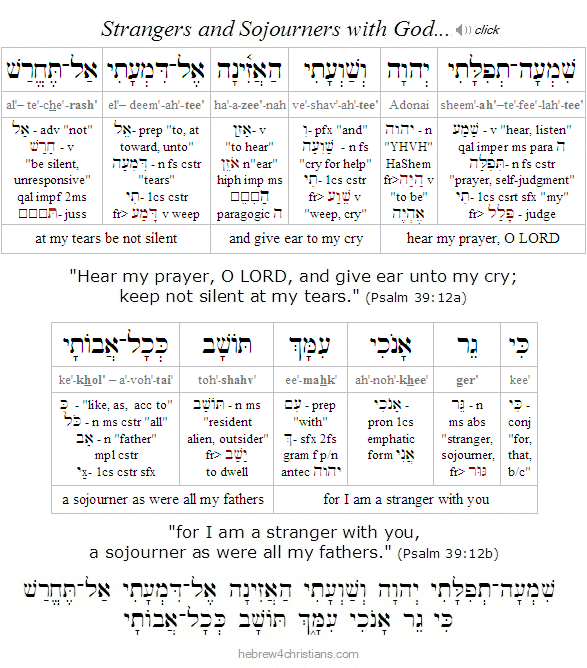 |
Blessed in all things...
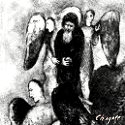
11.14.22 (Cheshvan 20, 5783) In our Torah for this week (i.e., Chayei Sarah) we read that "Abraham was old" (אַבְרָהָם זָקֵן) and had "come into days" (בָּא בַּיָּמִים), which the sages say marked the final stage in his sojourn wherein he realized that all was vanity, and therefore he gave the remainder of his life over to prayer and teshuvah... And this was what was meant that the LORD had blessed Abraham "bakol" (בַּכֹּל) "in all things" (Gen. 24:1). Abraham, in other words, had attained unto the wisdom of God in which he closed his eyes to this world of vanity and shadows and beheld the unchanging truth at the heart of reality.
So in the same verse that describes the great patriarch as "old and come into days" (זָקֵן בָּא בַּיָּמִים), he is also described to have been blessed "bakol" (בַּכּל) - "in everything." Contrary to the ideals of youth-obsessed culture, the Torah regards aging as a process of construction, of upbuilding, of perfection -- and not of decay. The sages say that the elderly "wear the days of their life as a garment," that is, as an accumulated "presence of days" that attends to the soul of the person. Indeed, the Talmud notes that the word zaken ("elder") can be read as "zeh kana," "this one has it." Maturity and wisdom are qualities that should be honored in our culture -- not abhorred or disregarded. As the proverb puts it, עֲטֶרֶת תִּפְאֶרֶת שֵׂיבָה / aseret tiferet sevah: "Gray hair is a crown of glory" (Prov. 16:31). That the LORD blessed Abraham "bakol" means that He revealed his presence to him in all things. This is the meaning of the "Abraham was old, come into days." The days of his life were filled with the wonder of God's presence, and that is why he died with contentment (Gen. 25:8).
Hebrew Lesson:
Gen. 24:1 Hebrew reading:
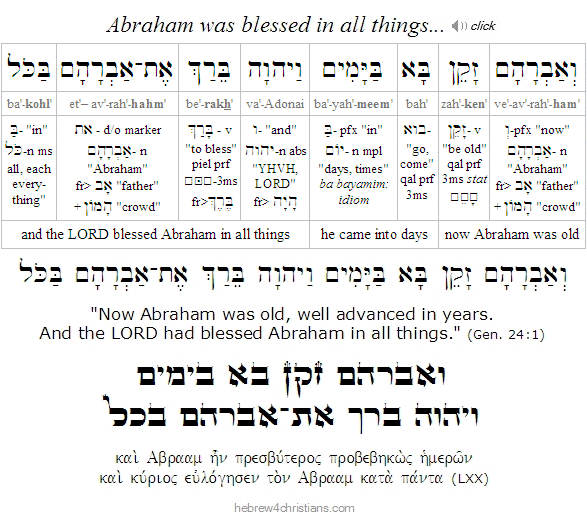 |
Life from Above...

[ How do we get "saved" or are made right with God? Is it by means of religious rituals, or by doing good deeds, or by believing certain things about God, or perhaps all of these? ]
11.14.22 (Cheshvan 20, 5783) Do you really understand how you are "saved" or made right with God? Do you "get" the message of the gospel? I once read from a Christian devotional book that said that in order to receive God's salvation you must do the following: 1) believe in Jesus' substitutionary death and resurrection; 2) turn away from your sins, and 3) ask him to be the Lord and Savior of your life. The author then went on to explain that "this means you have to renounce and turn away from everything in your life that is contrary to what God wants: you must give up your sinful self-centeredness and turn to God."
Now while at first glance this appeal may sound Biblical, it implicitly assumes that your own goodness and self-effort will save you. After all, if you really could turn away from your sins and from "everything in your life that is contrary to what God wants," and if you really could simply "give up your sinful self-centeredness," then there really would be no need for the miracle of spiritual rebirth, no need for the power of God to impart a new nature to you, and therefore no need for the cross of Messiah to save you from the verdict of the moral law.
Contrary to the vain hope that "God helps those who help themselves," we must emphasize that God helps precisely and only those who cannot help themselves... Indeed the teaching of the New Covenant is clear: God will perform a miracle by putting his Torah within your will, writing it on your heart, and recreating you into his child (Jer. 31:33; Ezek. 36:26; John 3:3; 2 Pet. 1:4). All this comes from the power of God alone, however, not by human aspiration or resolution or good works (John 1:12-13; 6:44; Rom. 10:9-12; Titus 3:5). Like father Abraham, we are "justified" (i.e., made right) with God by believing in his power, relying on his Spirit, and trusting in his promise of love (Hab. 2:4; Rom. 4:13-25).
Yeshua did not come to set up a "new religion" but to give life to the dead. Therefore it is no longer "I" who live but Messiah in me, which is to say that we do not possess the miracle but the miracle possesses us... You are made into a new creation (בְּרִיָּה חֲדָשָׁה); your former life is passed and now all things become new (2 Cor. 5:17). As Yeshua said: ᾽Αμὴν ἀμὴν λέγω σοι, ἐὰν μή τις γεννηθῇ ἄνωθεν, οὐ δύναται ἰδεῖν τὴν βασιλείαν τοῦ θεοῦ - "Truly, truly, I say to you, unless one is born again (i.e., ἄνωθεν, "from above") he is unable to see the kingdom of God" (John 3:3). So again you are not saved by "reforming" your character or by becoming a "promise keeper," but trusting in God's power and character to keep His promises. That is the way to receive the blessing. You come to God just as you are - acknowledging the truth of your raw and desperate need for deliverance from the corruption of your sinful condition, pressing past the verdict of the law in your desire for God's compassion (Psalm 85:10; Rom. 4:25). That's the heart of the gospel, after all. All you can do is bring is your brokenness and need to God for healing and then to respond to God's love by receiving it with humility and gratitude. Being made right with God is the gift of accepting that you are accepted despite your unacceptability because of God's great mercy for your life. This is indeed a miracle, for we need God to even know that we need God! As Yeshua said: "Blessed are the poor in spirit, for theirs is the Kingdom of God" (Matt. 5:3).
"This wish to satisfy someone greater than the self, to be found acceptable, to belong at last, is a struggle familiar to many psychotherapy patients. In their lives they waste themselves on wondering how they are doing, on trying to figure out the expectations of others so that they can become someone in the eyes of others. They try to be practical, to be reasonable, to figure it all out in their heads. It is as though if only they could get the words straight in their heads, if only they could find the correct formula, then everything else in their lives would be magically straightened out. They are sure there is a right way to do things, though they have not yet found it. Someone in authority must know... It is as though it were discovered that two and two really did not equal four (but five), then at that moment all over the world every machine would stop operating, all of the lights would go out." (Sheldon B. Kopp)
It is carnal pride to think that we can pledge to be perfect before we can come to the Lord for salvation. Can you imagine a person who has suffered for years as an alcoholic or addict of some kind being told that in order to be made right with God, they must believe that Yeshua died for their sins and that they therefore must turn away from all their sins, be perfect in their resolve, and pledge never to sin or be selfish again? For those of you who have suffered from addiction or struggled with chronic character defects in your lives, you know that empty promises to change mean nothing when it comes to turning away from what holds you in bondage... עָקב הַלֵּב מִכּל וְאָנֻשׁ ה֑וּא מִי יֵדָעֶנּו - "The heart is deceitful above all things and incurably sick: Who can know it?" (Jer. 17:9). God is not impressed with our promises and pledges; he understands that we are bankrupt and powerless; he knows that what we need is nothing less than the miracle of raising a dead person to newness of life.
None of this is meant to impugn the importance of living your faith and making godly choices, of course... "Faith without works is dead," but note that such "works" come from the Spirit of God, as the truth that is worked into us is worked out in our experiences. The "work" of God is to believe in Yeshua (John 6:29) and true faith will "show up" in our lives... We must test the spirits but more importantly test our own -- do you really believe, even when you are tempted to judge yourself or others? There's nothing "easy" about really believing in God (though it is easy enough to say you believe when in fact you don't). The pattern remains: unless a seed "falls to the ground" and dies it abides alone; but if it dies, it brings forth much fruit (John 12:24). We first encounter the risen Lord and connect with the truth, and then we get off our crazy road to Damascus... Our subsequent life of sanctification is a "slow motion" catching up with the miracle and reality of the new birth wherein we "become who we are" in the Messiah (Col. 1:27; 3:1-4). In this connection, however, please remember that all the commandments of the New Covenant are directed to the new nature, not the old "Adamic" nature that is mortified and buried away from the life of the child of God.
Hebrew Lesson:
Psalm 39:7 Hebrew reading:
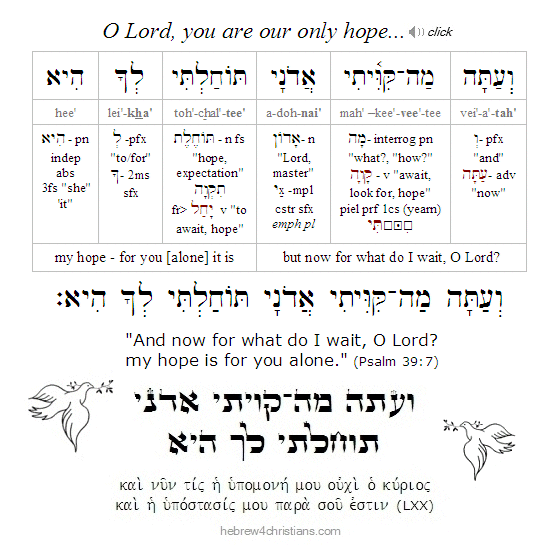 |
Awaken to the Spirit...

11.13.22 (Cheshvan 19, 5783) "You do not know what spirit you are of..." (Luke 9:55). Yeshua's words imply that each of us has the responsibility to know ourselves (γνῶθι σεαυτόν), and to learn to endure (and overcome) the natural motives and focus of our hearts. We discover the truth of our spiritual condition in the midst of our daily frustrations, as we experience conflict, opposition, and the inner groan that arises from pressure and disappointment. Spiritual growth means learning to transcend our negative reactions, to stop cursing our conflicts, and to awaken to the blessings that surround and pervade our way. God's grace enables us to open our eyes so that we may "choose life and live" (Deut. 30:19).
Our daily struggle with sin reveals the contradiction between the ideals of our faith and the spontaneous reactions of our heart.... We live in between the "is" and the "ought," the real and the ideal (though often we deny one or the other). The impulse to despair, to be angry, to complain and curse our experience can be transformed into an opportunity to pray, to ask God for help, and to refocus on what is real. This is the "hidden blessing" (ברכת סוד) of our troubles. When we learn to surrender to God's Presence, we can breathe in his peace and love, despite the grief we encounter over ourselves and others. When we come to the light, and do not deny the truth about our condition, we can honestly ask the LORD for healing (Heb. 4:16). When we seek for the good - and even bless the struggle - we express our trust that God will use our sorrow to help us grow and to bring beauty from our ashes (2 Cor. 7:10). Hashivenu: "Turn us back to you, O LORD, and we shall be turned..."
הֲשִׁיבֵנוּ יְהוָה אֵלֶיךָ וְנָשׁוּבָה
חַדֵּשׁ יָמֵינוּ כְּקֶדֶם
ha·shee·vei'·noo · Adonai · ei·ley'·kha · ve·nah·shoo'·vah
cha·desh · yah·mey'·noo · ke·ke'·dem

"Turn us back to you, O LORD, and we shall be turned;
renew our days as of old."
(Lam. 5:21)
Hebrew Study Card

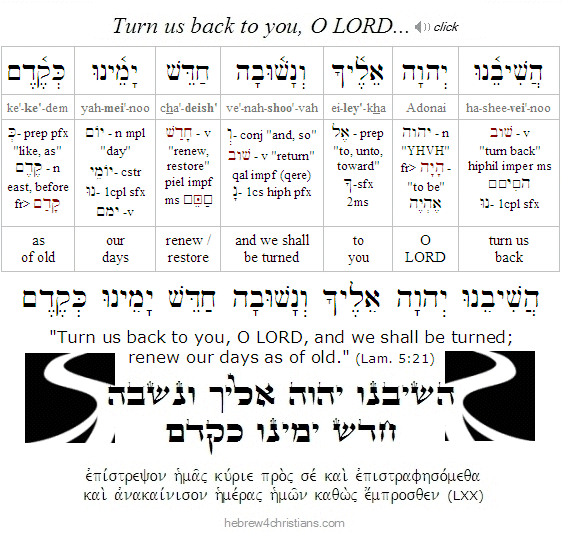
Again, our daily struggle with sin reveals the contradiction between the ideals of our faith and the spontaneous reactions of our heart. If we are able to find the courage, our failures and brokenness may be used by God to distill the intentions of the heart by helping us to be more honest with ourselves. We begin to realize that we are more vulnerable than at first we thought; that our faith is not as strong as we imagined, and that our motives are often mixed and unconscious. Illusions are striped away; idols crumble; deeper levels of selfishness are uncovered; the gap between our words and our deeds is exposed... It is one thing, after all, to intellectually think about faith or to idealize spirituality, but it is quite another to walk out faith in darkness. Yet it is only there, in the rawness of heart, that we discover what we really believe and how our faith makes traction with reality...
Keep the flame within your heart burning, friend... A sage once told a person struggling with his faith: "It is written that all creation was brought into being because of people like you. God saw there would be people who would cling to our holy faith, suffering greatly because confusion and doubt would plague them. God perceived that such would overcome these doubts and troubles of heart and remain strong in their belief. It was because of this that God brought forth all creation." Indeed, it was because of this that Yeshua our LORD suffered and died for you... Amen. Therefore never yield to despair, since that leads to further darkness and fear. Press on and keep fighting the "good fight" of faith (1 Tim. 6:12). Remember that you infinitely matter to heaven; your life has great value; you are significant and you are truly loved by our Heavenly Father. There is a "future and a hope" for you; there is "a white stone, and on that stone will be written a new name that no one can understand except the one who receives it" (Rev. 2:17). May "the trial of your faith, being much more precious than of gold that perishes, though it be tested with fire, be found to result in praise and glory and honor at the revelation to come" (1 Pet. 1:7).
"I am sure of this, that he who began a good work in you will bring it to completion (ἐπιτελέω) at the Day of Yeshua the Messiah" (Phil 1:6). The LORD is able to guard you (φυλάξαι) from stumbling and to present you blameless before the presence of His glory with great joy (Jude 1:24). "The LORD upholds all who are falling and raises up all who are bowed down" (Psalm 145:14). "He will sustain you to the end, guiltless in the Day of our Yeshua the Messiah" (1 Cor. 1:8). He who calls you is forever faithful; He will surely do it (1 Thess. 5:24). Yea, "the Lord is faithful (נֶאֱמָן הוּא): He will establish you and guard you against the evil one" (2 Thess. 3:3). The Spirit says, "Fear not, for I AM with you always."
 |
The Life of Sarah... חיי שרה

11.13.22 (Cheshvan 19, 5783) Our Torah reading for last week (i.e., Vayera) told how God was faithful to Abraham and Sarah by miraculously giving them a son (Isaac) in their old age. Nonetheless, Abraham faced his greatest test of all by being asked to offer up his promised child as a sacrifice on Mount Moriah, the place of the future Temple. On account of his willingness to obey, God promised He would multiply Abraham's offspring as the stars of heaven and that in his seed (singular) all the nations of the earth would be blessed.
This week's Torah portion is called Chayei Sarah (חיי שרה), the "life of Sarah," though it begins (paradoxically) with the account of her death, and tells how the first great matriarch of the Jewish people was buried in the Cave of Machpelah in Hebron, a burial site which Abraham had purchased from Ephron the Hittite (Gen. 23:1-20). Since the account of Sarah's death is given just after the account of the near-sacrifice of Isaac (i.e., the Akedah), some of the sages link the events together, suggesting that the shock of the near loss of her beloved son at the hand of her husband was just too much for her to bear...
Hebrew Lesson:
Genesis 23:1a Hebrew Reading (click):
After Sarah was buried in Hebron, Abraham sought a wife for his son by commissioning his faithful servant Eliezer (whom Abraham had once thought would be his heir), to go among his relatives living in Mesopotamia to seek a bride for Isaac. Eliezer (i.e., אֱלִיעֶזֶר, lit., "My God will help") then set out on the 550 mile journey to Haran (also called the City of Nahor and the place where Abraham's father died), taking ten camels laden with gifts in search of a suitable woman. In answer to his prayer, as soon as Eliezer reached the city of Nahor he encountered Abraham's grand niece Rebekah drawing water at a well, where she graciously provided water for him and for his ten camels, thereby confirming that she was God's choice for Isaac.
Peace and Affliction...

11.11.22 (Cheshvan 17, 5783) When we undergo affliction, we often cannot discern its deeper purpose because the pain pulls us back to the present moment... The hidden blessing of affliction (ברכה סוֹדית) is only perceived later, in hindsight, where we discover a deeper longing for heaven has been instilled within our souls. Affliction helps us become more willing to let go of our attachments to this world; it teaches us to look upward, for the high country of heavenly consolation. The pleasures and expectations of this world distract our hearts from what we most need, and our troubles and afflictions therefore open us to the truth of God.
When we genuinely accept that God defines the truth for our lives, we realize that affliction is sovereignly given to us so that we can learn to abide in Him without constraint. Life is a "school" for the soul. God is the Teacher, we are "disciples" (i.e., תַּלְמִידִים, "learners"), and affliction is our divinely appointed tutor. Many of us are slow to learn, but God is patient with those whom He disciplines. The goal is to never lose sight of what's most important, which is God Himself. If you find yourself in a place of resistance, then you must decide whether or not you will trust the Teacher. The key lies in surrendering to God's will by submitting to His rule over all things. Yielding to God's will is the path of serenity and inner peace.
Hebrew Lesson
Isaiah 26:3 reading (click):
Biblical Hebrew Wordplay...

11.11.22 (Cheshvan 17, 5783) The Hebrew Scriptures are filled with various kinds of wordplay. In addition to some humorous play on words (i.e., puns), you will discover alliteration, acrostics, parables, similes, metaphors, theophorisms, hyperboles, gematria, and other literary devices present in the Hebrew text. Some scholars even suggest that the first two words of the Torah (i.e., בְּרֵאשִׁית בָּרָא / bereshit bara) were intentionally spelled using the same initial three letters (בּ.ר.א) for the sake of "alliteration" (i.e., repetition of sound). At any rate, examples of wordplay often appear on the surface-level of the texts. For example, "Adam" (אָדָם) is a play on the word adamah (אֲדָמָה, "ground"); Chavah (חַוָּה, "Eve") is a play on the word chai (חַי, "life"); Kayin (קַיִן, "Cain") is a play on the verb kanah (קָנָה, "to get"), and so on (see Gen. 2:7, 3:20, 4:1). Even the name "Jesus" (i.e., Yeshua: יֵשׁוּעַ) plays on the word for deliverance or salvation (i.e., yeshuah: יְשׁוּעָה). Many other examples could be cited.
Of particular relevance to this week's Torah portion (Vayera) is the name Yitzchak (יִצְחָק, "Isaac"), which plays on the verb tzachak (צָחַק, "to laugh"). Some have said that tzachak is "onomatopoeic," that is, it imitates the sound of laughter itself. Appropriately enough, the root appears a number of times in the story of Isaac, though often with different connotations. The simple stem (kal) of tzachak conveys the idea of laughter, whether in joy or incredulity, though the stronger stem (piel) suggests more intense expressions, for example rejoicing, playing, and making love -- or (negatively) mocking, scorning, and deriding. In other words, the motive for laughter is only contextually understood. After all, there's a big difference between laughing at someone and laughing with them.
At any rate, God Himself named Isaac in response to Abram's laughter over the prospect of having a child in his old age. Here's some of the "back story." God originally called Abram to leave Ur of Mesopotamia for the land of Canaan (Gen. 12:1). When he arrived there, God appeared to him and promised that his descendants would inherit the land (Gen. 12:7). Abram was 75 years old at this time. Abram wandered through the land waiting for God's promise to be fulfilled. Some time later (but before the birth of Ishmael), God came to him in a vision and reaffirmed his promise that he would have a son "from his own loins" (Gen. 15:1-5). Abram "believed in the LORD, and He credited it to him as righteousness" (Gen. 15:6). The LORD then made the "covenant of the pieces" to seal the agreement to give the land of Canaan to Abram's descendants (Gen. 15:7-20). Ten more years passed, however, and Abram and Sarai were still childless. In a lapse of faith, Sarai urged Abram to sleep with her Egyptian maidservant, Hagar, in order to produce the family heir. Ishmael was born when Abram was 86 years old (Gen. 16:16).
Another thirteen years passed before God appeared to Abram to renew his earlier promise that he would become a "father of a multitude" (Gen. 15; 17:7). Abram was now 99 years old. To symbolize Abram's changed status, God changed his name from Avram ("exalted father" [from אָב, "father," + רָם, "exalted"]) to Avraham ("father of a multitude" [from אָב, "father" + המוֹן, "crowd"]). (Note that some scholars regard Avraham's name to mean "father of mercy" (from אָב, "father" + רחם, "womb"). Likewise God changed Sarah's name from Sarai (שָׂרַי, "princess") to Sarah (שָׂרָה) -- the exchanged Hey (ה) for the Yod (י) was given to indicate that the Divine Presence was to replace of the "hand" of Sarah's design. (Indeed, the root of Sarah's name (i.e., שׂר, "prince") later reappears when her grandson Jacob was renamed "Israel." The wordplay occurs in the phrase "for you have striven (sarita) as a prince (sar) with God and with men and have prevailed" (Gen 32:28)). God reaffirmed his promise to make Abram into a great nation and then gave him the commandment of brit millah (בְּרִית מִילָה, ritual circumcision) as a token or "sign" of the agreement. (There's another play on words here: Abraham's male descendants who refuse to "cut off" their foreskins would be "cut off" from the terms of the covenant).
Getting back to the wordplay on Isaac's name, when the LORD repeated his promise that Abraham would sire a son in his old age, he "threw himself on his face and laughed (וַיִּצְחָק) as he said to himself, "Can a child be born to a man a hundred years old, or can Sarah bear a child at ninety?" (Gen. 17:17). When Abraham attempted to recommend Ishmael as his heir, God said "No, but Sarah your wife shall bear you a son, and you shall call his name Yitzchak (יִצְחָק, "he laughs").... (Gen. 17:19). After this vision of the LORD, Abraham promptly circumcised himself along with his son Ishmael (Gen. 17:23-26).
Rashi says it was the third day after Abraham's circumcision when he was visited by the Angel of the LORD (מַלְאַךְ יהוה) accompanied with the two other angels. When Sarah overheard the Angel of the LORD say, "I will certainly return to you next year, and your wife Sarah shall have a son" (Gen. 18:10), she laughed (וַתִּצְחַק) within herself (lit, "at her insides") and thought, "Now that I am withered, am I to have enjoyment, my husband being so old?" (Gen. 18:12). The LORD (יהוה) then asked, "Why did Sarah laugh (צָחֲקָה)? Sarah denied it (לא צָחַקְתִּי, "I didn't laugh"), but the Angel of the LORD said, "No, but you did laugh" (לא כִּי צָחָקְתְּ).
Jewish tradition maintains that Abraham laughed in joy at the prospect of becoming a father, whereas Sarah (initially) shook her head in disbelief. Sarah underwent teshuvah, however, even before her conception (see Heb. 11:11), and after the miraculous birth of her son exclaimed in heartfelt joy: "God has made laughter (צְחק) for me; everyone who hears will laugh for me (יִצְחַק־לִי)" (Gen. 21:6).
After Isaac was weaned, however, Abraham held a celebration, but Sarah saw Ishmael mocking (מְצַחֵק, i.e., the piel participle of צָחַק, "to laugh") her son and demanded that he be sent away. This grieved Abraham greatly, but God reassured him that Ishmael would nevertheless become a great nation with numerous descendants (Gen. 21:11-13). The promise of being Abraham's heir belonged to Isaac alone, who was the miraculously given son that would bring laughter to the hearts of all those who believe...
A further example of wordplay on the name "Isaac" occurs when the Torah records how he fled to the Philistine city of Gerar to escape a famine in the land. Like his father Abraham, Isaac lied by telling people that his wife Rebekah was his "sister." The Torah records that his deception was detected when Abimelech saw him "playing" with Rebekah: יִצְחָק מְצַחֵק אֵת רִבְקָה אִשְׁתּוֹ / "Isaac was 'sporting' with his wife Rebekah" (Gen. 26:8). The verb translated "sporting" is the intensive (piel) form of tzachak (צָחַק, "to laugh"), and clearly suggests the idea of caressing and fondling -- i.e., making love.
Hebrew wordplay was also applied to Isaac's sons. When the twins were born, the first came out hairy and was named Esau (עֵשָׂו), perhaps from the word esev (עֵשֶׂב), "grass" or "weed" of the field), whereas the second came out with his hand on his brother's heel, and was named Ya'akov (יַעֲקב, "grappler," from the word עָקֵב, "heel"). Later, when Esau learned that Jacob had taken away his blessing, he exclaimed, "Is he not rightly named "heel holder" (i.e., יַעֲקב)? For he has taken me by the heel (יַּעְקְבֵנִי) these two times. He took away my birthright, and behold, now he has taken away my blessing" (Gen. 27:36).
Hebrew Lesson
Isaiah 7:9b reading (click):
Prayer and Humility...
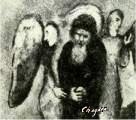
[ The following entry is related to this week's Torah reading, parashat Vayera.... ]
11.10.22 (Cheshvan 16, 5783) "Abraham answered and said, "Behold, I have undertaken to speak to the Lord, I who am dust and ashes" (i.e., anokhi afar va'efer: וְאָנֹכִי עָפָר וָאֵפֶר, Gen. 18:27). This teaches that we cannot draw near to God apart from profound humility, since God's truth is revealed to the meek and lowly of heart but remains hidden from the proud (James 4:6). As it is written: "For this is what the high and lifted up One says, the One who abides forever, whose Name is Holy (קָדוֹשׁ): "I dwell in a high and holy place, but also with the broken and lowly of spirit, to revive the spirit of the lowly (i.e., ruach shefalim: רוּחַ שְׁפָלִים), and to revive the heart of the crushed" (i.e., lev nid'ka'im: לֵב נִדְכָּאִים) [Isa. 57:15]. Here we learn that God gives life (revives) to those who are "lowly in spirit" (שְׁפַל־רוּחַ), that is, to those who understand their own nothingness and complete dependence on Him for life...
Indeed, the "heart of the crushed" (לֵב נִדכֶּה) refers to being crushed "to the dust" -- the same word (dakka: דַּכָּא) is used to describe how Yeshua was "crushed for our iniquities" (see Isa. 53:10). William James called this deep work of the spiritual life "Zerrissenheit," a term that can be translated as "torn-to-pieces-hood," or a state of being utterly broken and in disarray... From the point of view of our dependence on God for salvation, "dakka" refers to humility and contrition we express in light of God's unmerited favor and love for our souls. We humbly identify with the death of Messiah offered on our behalf; we find healing and acceptance in the Presence of the One who was torn to pieces and made dust for our merit. Humility (i.e., anavah: עֲנָוָה) is essential to awareness of God in the truth. Shuvah Yisrael!
Hebrew Lesson
Psalm 34:18 reading (click):
Lament and Forgiveness...

[ "Faith sees best in the dark," which is to say that it closes its eyes to this world and its thinking to apprehend the truth of eternity. As it says: "We walk by faith, not by sight" (2 Cor. 5:7). ]
11.10.22 (Cheshvan 16, 5783) We suffer, and life hurts. Often we are afraid. And if suffering is part of God's overarching plan for creation, if it is part of the "divine idea," then how do we learn to emotionally accept it without becoming bitter? We earnestly desire the love and blessing of God, but we are shaken when terrible things happen. We are told not to be afraid, that we are not alone, but we often do feel afraid and alone in our suffering...
First we must find faith that God's decision to create us is for our blessedness rather than for evil, or minimally that it is better for us to have been created than never to have been born (Jer. 29:11). In that sense trusting God represents an affirmation of our life and its value. Whether this is the "best of all possible worlds" is an abstract question for speculative theology, but where we live, in the raw and messy struggles of life, in the midst of our joys and elations, but also in our darkness and pain, we need faith to believe that our existence has some meaning and purpose, that our lives carry some significance, and that not everything is hevel havalim, "vanity of vanities." Asking whether it would have been better had you never been born is not a trivial question, then, and indeed the ancient Hebrew prophets Job, Solomon, Jeremiah, and Jonah each wrestled with it in the course of their lives (Eccl. 4:1-3; Job 3:1-3; 10:19; Jer. 20:14; Jonah 4:3).
The sages asked whether we can ever be justifiably angry at God, and they answer that surely we can, because otherwise we could never love Him "bekhol levavkha," with all our heart (Deut. 6:5). Indeed, how can we claim to love God if we withhold the truth, lie to ourselves, and attempt to hide who we really are from Him? If you are angry at God, he already knows, so why the pretense? Being angry with God is part of being a real person in a real relationship with Him, and allowing yourself to express the truth of your heart to him is a sign of trust... Forgiving God means letting go of your grudges over matters infinitely beyond your control. We need God to even know that we need God...
Rightly (and sympathetically) understood, when we "forgive God" we are confessing our own ignorance about what is happening to us while allowing our hearts to give voice to its pain. At bottom, suffering is a type of grieving, a confession of the darkness of loss. On the other hand, we can find healing through the grieving process. Over time we learn that by "forgiving God" we are able to forgive ourselves, and we are then released from the pain that withholds us from love and blessing in our lives.
Frederick Buechner reminds the heart of faith: "The worst isn't the last thing about the world. It's the next to the last thing. The last thing is the best. It's the power from on high that comes down into the world, that wells up from the rock-bottom worst of the world like a hidden spring. Can you believe it? The last, best thing is the laughing deep in the hearts of the saints, sometimes our hearts even. Yes. You are terribly loved and forgiven. Yes. You are healed. All is well." For more on this topic see the article: "Angry at God..."
Hebrew Lesson:
Psalm 62:8 Hebrew reading:
God's Sovereign Love...

11.10.22 (Cheshvan 16, 5783) The Scriptures teach that in Messiah "we have obtained an inheritance, having been predestined (προορισθέντες) according to the purpose of the One who works all things according to the counsel of his will" (Eph. 1:11), which is to say that salvation is a gift from God (יְשׁוּעָתָה לַיהוָה) and not the result of our own efforts (Eph. 2:8-9; 2 Tim. 1:9; Titus 3:5). The LORD said to Moses, "I will be gracious to whom I will be gracious, and I will show mercy to whom I will show mercy" (Exod. 33:19), a phrase Paul quoted from Torah when he said: "So then it (i.e., salvation) depends not on human will or exertion, but on God, who has mercy" (Rom. 9:16, John 1:13). In light of these things, examine your heart. Does this offend you? Does it bother you to think that you are essentially helpless to draw near to God by your own best efforts? "It is the Spirit that gives life; the flesh profits nothing" (John 6:63). Our Lord plainly said that no one can come to Him - and therefore to the truth of reality – apart from divine intervention: "No one is able to come to me unless he is "dragged away" (ἑλκύσῃ) by the Father" (John 6:44; Matt. 16:17).
How could it be any other way? Could we make a "stairway to heaven" to find God? No, God's love reaches out to us, seizes us, takes us captive, and then leads us to the Savior. The LORD chooses each one who are his; they are called the "elect" (ἐκλεκτός), and their faith is always a response (i.e., "teshuvah") to God's intervention. Now this may seem offensive because it seems to suggest that God chooses some people but not others, but that misses the point. You are given the real choice to believe in Yeshua to find life, and you are promised that whoever believes in Messiah will never be put to shame (Rom. 9:33; John 6:37; John 5:24, etc.). "Whoever will believe" means just that, and all who are invited may indeed come (2 Pet. 3:9; 1 Tim. 2:4; Ezek. 18:23). Therefore the Spirit of God cries out: "Seek the LORD while he may be found; call upon him while he is near; let the wicked forsake his way, and the unrighteous man his thoughts; let him return to the LORD, that he may have compassion on him, and to our God, for he will abundantly pardon" (Isa. 55:6-7).
Our great Savior calls out to all who are willing to hear, "Come to me, all who labor and are heavy laden, and I will give you rest. Take my yoke upon you, and learn from me, for I am gentle and lowly in heart, and you will find rest for your souls. For my yoke is easy, and my burden is light" (Matt. 10:28-30). Though it is a mystery, we are warned to "work out" (κατεργάζεσθε) our own salvation with fear and trembling, for it is God who "works in you" (ὁ ἐνεργῶν ἐν ὑμῖν) both "to will and to work" (τὸ θέλειν καὶ τὸ ἐνεργεῖν) his good pleasure" (Phil. 2:12-13).
Hebrew Lesson:
Exod. 33:19b Hebrew reading:
The gospel is "the power of God for salvation" (δύναμις γὰρ θεοῦ ἐστιν εἰς σωτηρίαν) to everyone who believes, to the Jew first and also to the Greek" (Rom. 1:16). It is a miracle of being in a right relationship with God. We are pursued by his love, and he haunts us until we surrender to his will... During the High Holidays we read from the Book of Jonah, which is appropriate because like Jonah, we first must be "swallowed up" in the consciousness of our own helplessness before we realize we are undone, and that we are without remedy apart from God's gracious intervention and deliverance. We start there - in the "belly of the fish" - and later we are resurrected to go forth by God's mercy and grace. As we look to Yeshua, as we lean on him, God reveals more of himself to us. He gives us the grace and strength we need; he is always enough...
The Limits of Science...

11.10.22 (Cheshvan 16, 5783) Part of what "renewing your mind" means is learning to question the assumptions of worldly culture and resisting the temptation to flow with "preconscious" acceptance of habitual ways of seeing and thinking. Take the enterprise of "science," for example, and the frequent appeals made by its advocates that modern science should be regarded as the voice of authority about what is real... Just a moment of reflection, however, will indicate that the scientific enterprise is a faith system that inescapably believes many metaphysical (i.e., non-scientific) axioms, including assumptions about time (i.e., that the future will "resemble" the past), about motion (i.e., that natural processes are "uniform"), about space (that there is an external world that is knowable to the human mind); about the capability of the mind to define and represent things (e.g., that measurement "makes traction" or "corresponds" with this external world and can be used to predict outcomes); about values (i.e., that it is "better" to know rather than not to know; or that the scientific method is an "good way" to develop inductive inferences, or that a given theory is "elegant," etc.). Note that not one of these various axioms are based on the scientific merhod itself (which is based on evidence and repeatable empirical measurement), but they are brought to science as assumptions used to frame or organize a particular "paradigm." In other words, science is a system of faith about what constitutes "reality," and like any other faith system, it needs to undergo testing to see if its inferences and claims provide the best explanation for what is real. For instance, does the naturalistic view of reality espoused by evolutionary cosmologists best explain the meaning of life? Does it account, for instance, for the origin of the electromagnetic pulse of the individual human heart? For the aesthetic wonder of the beauty? For poetry, or the longing of heart for love? for friendship? truth? for eternal life?
There are limits of scientific knowledge and its apprehension of reality (as clearly explained by Immanuel Kant). Do phenomenal cause and effect inferences have anything to say to us today? Of course *good* science is a humble endeavor because it realizes its conclusions are tentative and subject to falsification. Good science that is based on verifiable research that has undergone the rigors of peer-reviewed testing is an avenue of knowledge about things, though of course it is not infallible. Moreover, not all that is claimed to be "good science" deserves the title. Some science is "politicized" and other "science" is employed for purposes of manipulation and marketing. Other science is wildly speculative and undeserving of the name "science" itself. For example consider that the theory of macro evolution that claims (without any empirical evidence whatsoever) the universe simply exploded into being out of absolutely nothing for no logical reason whatsoever... It should be obvious that if we define science as "the observation, identification, description, experimental investigation, and theoretical explanation of phenomena," macro evolutionary theory does not qualify as science, since it is not based on the direct observation of how the universe originated, etc., though the observation of expected results if it were true can be admitted, so long as it is understood that such evidence is inductive and therefore not demonstrable by logic (that is, if p then q, q, therefore p is not a valid form of reasoning). And as for the "noumenal" realm of reality, silence cannot comment. "Whereof one cannot speak, thereof one must be silent."
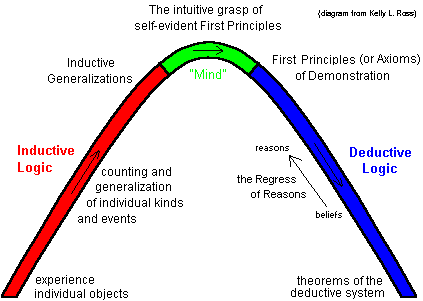 |
Many people ascribe to "science" god-like powers it simply does not have, just as are many people are unaware that science is grounded in philosophical assumptions that transcend the realm of scientific knowledge altogether. It is wise, therefore, when presented with a scientific claim that something is true, to respectfully ask for the logical reasons and the warrant (i.e., datasets, methodologies, etc.) for believing the claim is justified. Remember that relying on self-professed testimonial is not sufficient warrant since such testimony may be biased, as for example when pharmaceutical companies claim the efficacy of a particular medication or vaccine. As a matter of fact, genuine scientific consensus is rare, and we should remember that scientific knowledge is an ongoing process that ever-approximates what is true. For example, it was not long ago that science thought the earth was flat, that leeches and bloodletting were prescribed to cure illnesses; that phrenology and lobotomies were used to "cure" mental illness, and so on. Be wise and test truth claims, chaverim. If there are peer-reviewed studies that independently confirm the probable truth of a given hypothesis, then that is to be respected and taken into consideration, but unthinking acceptance of statements made by unqualified authorities (such as politicians, mass media broadcasters, or pharmaceutical CEOs, etc.) about the efficacy or interpretation of scientific data is not.
"Of all tyrannies, a tyranny sincerely exercised for the good of its victims may be the most oppressive. It would be better to live under robber barons than under omnipotent moral busybodies. The robber baron's cruelty may sometimes sleep, his cupidity may at some point be satiated; but those who torment us for our own good will torment us without end for they do so with the approval of their own conscience." (C.S. Lewis: God in the Dock)
Hebrew Lesson:
Proverbs 14:15 Hebrew reading:
The Sins of Sodom...

11.10.22 (Cheshvan 16, 5783) From our Torah this week (Vayera) we read: "And the LORD said, 'The outcry of Sodom and Gomorrah is indeed great, and their sin is exceedingly grave...'" (Gen. 18:20). But what was the grave sin of Sodom and Gomorrah? Why did God destroy the two cities? Was it because the people there refused to show hospitality to the angelic visitors (as claimed by some), or was it because of some ongoing sin of the people?
Though the sin of Sodom undoubtedly included practices of sexual perversion (called "strange flesh" (σαρκὸς ἑτέρας) in the Book of Jude), such behavior was symptomatic of a nihilistic culture that glorified violence, despised moral authority, denied spiritual truth, and practiced the exploitation of others. Throughout the Scriptures "Sodom" symbolically represents gross immorality, depravity, and inevitable judgment from heaven. For example, the prophet Ezekiel later wrote of Judah: "Behold, this was the guilt of your sister Sodom: she and her daughters had arrogance, abundant food, and careless ease, but she did not help the poor and needy. Thus they were haughty and committed abomination (תּוֹעֵבָה) before me; therefore I removed them when I saw it" (Ezek. 16:49-50). The New Testament refers to the fate of Sodom as "a fearful example of the everlasting fire of retribution" (Jude 1:7) -- the destructive result of spiritual anarchy, lawlessness, perversion, and the violence of indifference (2 Pet. 2:6-10).
There is real hope for those who seek to escape from the wrath to come by turning to God and trusting in his healing power of salvation, though it is only a "remnant" that will genuinely seek such deliverance (Matt. 7:14). Speaking of the final salvation of Israel, the Apostle Paul quotes Isaiah: "If the LORD of Hosts hadn't left us a few survivors, we'd be as desolate as Sodom, doomed just like Gomorrah" (Isa 1:9; Rom. 9:29).
In this connection it should be noted that the word "sodomy" involves any form of violence, perversion, exploitation, or lawless expression of sexuality regardless of gender... In general, it is more helpful to think of it as a code word for egregious sin, "in-your-face" spite toward God, and defiant immorality that celebrates spiritual anarchy, moral nihilism, and death... Adultery, fornication, sexual perversions, viewing pornography (i.e., the lust of the eyes), covetousness, gluttony, arrogance (idolatry), unbridled anger (rage), sloth, worshiping the values and ideologies of this world (i.e., political activism, godless scientism, the world's value system), and so on, all may be called "sodomy." Whenever we consider such things, it is better to look at how we are healed rather than what makes us sick.... The answer in every case to the trauma of the sinful heart is to turn to God and ask for deliverance in the name of Yeshua.
Hebrew Lesson
Jeremiah 7:14 Reading (click):
The world and its "group-think" always calls for the abolition of individual conscience. Like the people of ancient Sodom that repudiated God's moral authority so that they would be "free" to their indulge their selfish desires and "autonomy," so the world system today repudiates a person of real conviction and conscience. Indeed, the only thing regarded as "intolerable" in the devil's world is the objection that people have the supposed "liberty" to sin in whatever way they please. This godlessness is anathema to one who truly fears God, of course, since tolerating sin in a world ripe for judgment is a cowardly form of "collaboration" with the enemy (James 4:4). "Woe to those who call evil good and good evil, who put darkness for light and light for darkness, who put bitter for sweet and sweet for bitter! Woe to those who are wise in their own eyes, and who are shrewd in their own sight!" (Isa. 5:20-21).
The "original sin," that is, eating from the Tree of Knowledge of good and evil, meant that man sought to transcend God's will to determine what is valuable, true, beautiful, and so on. Man became autonomous, "the measure of all things." Such was the "logical" method of the German idealism of Kant and Hegel, which led to way for Karl Marx, Friedrich Nietzsche, and Adolf Hitler (and some present day politicians) to unleash their nightmares upon the earth. Understand that the deep untruth that lies behind cynical "postmodernism" expresses little more than the godless desire to control the world... Today, more than ever before, the world is like "Sodom," and therefore ripe for judgment from heaven.
And the judgment of God indeed came upon the moral anarchy of that realm... After the angels rescued Lot (and his immediate family), we read "then the LORD rained on Sodom and Gomorrah sulfur and fire from the LORD out of heaven. And he overthrew those cities, and all the valley, and all the inhabitants of the cities, and whatever grew on the ground" (Gen. 19:24-25). The sages note the word translated "overthrew" is vayahafokh (וַיַּהֲפךְ), which means "overturned," suggesting that besides the fire and brimstone that rained down from the sky, an enormous earthquake engulfed the plain, forming a crater filled with salt that became known as the "Dead Sea" (ים המלח).
For more on this see, "The Sins of Sodom: Further thoughts on parashat Vayera."
Akedat Yitzchak:
The Sacrificed Seed...

[ The following entry is related to this week's Torah reading, parashat Vayera.... ]
11.09.22 (Cheshvan 15, 5783) From our Torah portion this week we read: "And Abraham took the wood of the burnt offering and laid it on Isaac his son. And he took in his hand the fire and the knife. So they went both of them together" (Gen. 22:6). Isaac was about 37 years old at this time and needed to understand what was being asked of him: "And Isaac said to his father Abraham, "My father!" And he said, "Here am I, my son." And he said, "Behold, the fire and the wood, but where is the lamb for a burnt offering?" (Gen. 22:7).
This is the first word of dialog recorded over the three day journey... It is hard to imagine Isaac's pathos during this exchange. Abraham replied, "God will provide for himself the lamb for a burnt offering, my son." So they went both of them together (Gen. 22:8). Notice that the Hebrew could be read: "God will provide for himself the lamb for the burnt offering -- my son!" (ירְאֶה־לּוֹ הַשֶּׂה לְעלָה בְּנִי) - making it plain that Isaac would be offered upon the altar. The Torah then repeats the phrase, "and they both walked on together," indicating that Isaac had accepted his sacrificial death in obedience to his father's will...
"And when they came to the place of which God had told him, Abraham built the altar there and laid the wood in order and bound Isaac his son (וַיַּעֲקד אֶת־יִצְחָק בְּנוֹ) and laid him on the altar, on top of the wood" (Gen. 22:9). According to the Talmud, Isaac asked his father to make the knots on his hands and feet tighter - not out of fear that he would change his mind and begin to resist - but in order to encourage his father to offer the sacrifice properly (Bereshit Rabbah 56:8). Like the Suffering Servant who would come after him, Isaac "set his face like a flint" to fulfill God's will (Isa. 50:7).
Hebrew Lesson:
Genesis 22:8a reading (click):
Isaac kept his eyes directed toward heaven as he lay tightly bound and motionless upon the altar. He awaited the final blow and wanted it to fall with trust and obedience within his heart. It was to be a shared sacrifice between the beloved son and his father...
Finally "Abraham stretched out (שׁלח) his hand and took the knife to slaughter (i.e., לִשְׁחט, from shechitah) his son" (Gen. 22:10). The Talmud says that when Abraham "stretched out" his hand, he briefly looked at the knife to determine if it was ritually fit, and this delay was the precise moment when the Angel of the LORD (i.e., malakh Adonai: מַלְאַךְ יהוה) called out to him from heaven saying, "Abraham, Abraham!" (Gen. 22:11). (Note the repetition of the name "Abraham" during this second call.) According to midrash midrashim, when Abraham put his knife to his son's neck, Isaac's soul departed from him, but it returned when the Angel of the LORD said, "Do not lay your hand on the boy or do anything to him, for now I know that you fear God, seeing you have not withheld your son, your only son, from me" (Gen. 22:12). Abraham then immediately released Isaac and recited the blessing, "Blessed are You, LORD, who revives the dead" (בָּרוּךְ אַתָּה יהוה מְחַיֶּה הַמֵּתִים).
"I believe in You, O Holy One, though at times there no longer seems any reason for believing..." Here is Abraham, who counted the stars in hope, who trusted God for an heir, a promised son - and from this son another, and from that another, and another, until he envisioned his descendants "as the dust of earth" (Gen. 13:16; 15:5-6), and yet here is Abraham lifting up his knife to sacrifice his son, his beloved child, his promise, his future, his sacred dream. Remember that Abraham did not know the end of the story before it began, and therefore his faith attested: "Though he slay me, I will trust in him."
Some people tend to "explain away" the passion of Abraham and Isaac by quoting the New Testament verse: "He [Abraham] considered that God was able even to raise him [Isaac] from the dead, from which, figuratively speaking, he did receive him back" (Heb. 11:19) -- as if this would make the sacrificial act any easier! Again we must bear in mind that neither Abraham nor Isaac knew "the end of the story" before they chose to obey God. As I've mentioned before, simply "knowing about" God is not the same thing as personally trusting Him with your life... This is the distinction between emunah (אֱמוּנָה) and bittachon (בִּטָּחוֹן). Simply knowing about God can lead to a sense of "distance," to theological abstractions, to dogmas and creedal formulas. Rabbi Bechaya put the distinction this way: "Everyone who trusts has faith, but not everyone with faith trusts." Bittachon is an intuitive awareness of the personal love of God for your life, coupled with complete trust that He cares for you (Rom. 8:28). It is an expectation that the love of God is for you, too, despite the test.
Read the Full Article here:
The Way of the LORD...
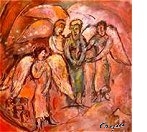
11.09.22 (Cheshvan 15, 5783) From our Torah portion this week (i.e., parashat Vayera) we note that after delivering the announcement of the coming heir to both Abraham and Sarah, the three angels set out to finish their mission (Gen. 18:1-16). Abraham escorted them on their way. The chief Angel (i.e., the Angel of the LORD) then rhetorically asked his two angelic companions, "Should I hide from Abraham what I am about to do (i.e., go to Sodom), seeing that Abraham shall surely become a great and mighty nation, and all the nations of the earth shall be blessed in him? For I know him (כִּי יְדַעְתִּיו), that he will command his children and his household after him, and they shall keep the way of the LORD (דֶּרֶךְ יהוה), to do charity and justice (לַעֲשׂוֹת צְדָקָה וּמִשְׁפָּט); that the LORD may bring upon Abraham that which he has spoken of him" (Gen. 18:17-19). Notice here that the LORD commends Abraham because he would instruct his family in the way of the LORD, namely, to do tzedakah (i.e., charity, righteous giving, acts of righteousness) and to promote justice in the earth...
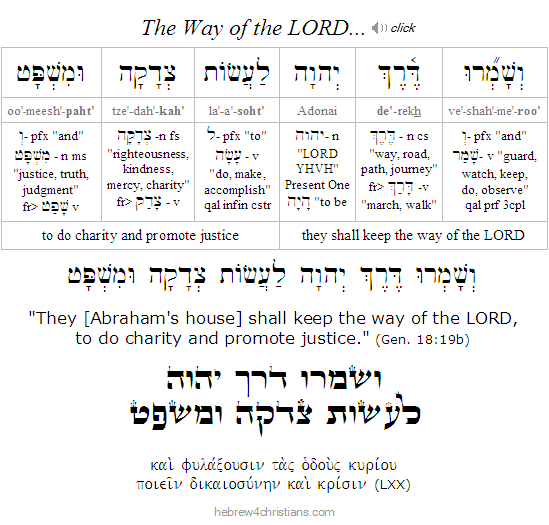 |
When we recite the Shema, we repeat the admonition to follow Abraham's example: "these words that I command you today shall be on your heart, and you shall teach them diligently to your children (וְשִׁנַּנְתָּם לְבָנֶיךָ), and shall talk of them when you sit in your house, and when you walk by the way, and when you lie down, and when you rise..." (Deut. 6:5-7). We know however, that though Abraham had several sons, we call upon the the God of Isaac (Gen. 28:13), and likewise, though Isaac had two sons, Jacob and Esau, but we call upon the God of Jacob (Exod. 3:6). We are responsible to instruct our children to keep the way of the LORD, though we must entrust the spiritual results to God's hands....
Hebrew Lesson
Hosea 6:6 reading (click):
God's Way of Deliverance...

11.09.22 (Cheshvan 15, 5783) From our Torah portion this week (i.e., Vayera) we read, "Escape for your life. Do not look back..." (Gen. 19:17). You must turn away from what once defined you and never look back... This includes not only turning away from your former sins, but turning away from the guilt and shame of your sins...
Living in the past, wallowing in your sin and regretting your mistakes, can cause you to feel worthless and even hopeless. If you feel compelled to revisit your former life, then be sure to do so before the foot of the cross, in light and presence of God's redemptive love for you. You can't change the past, but you can leave it behind by turning it over to God for healing. Teshuvah (repentance) means accepting who you are in light of God's love and salvation for your soul. "Brothers and sisters, I do not consider myself to have attained this, though I am single-minded: I forget what is behind me and reach out for the things that are ahead ... heeding the upward call of God in Yeshua our Messiah" (Phil. 3:13-14). May you "find yourself in Him, not having a righteousness of your own that comes from the law, but that which comes through faith in Messiah, the righteousness from God that depends on faith" (Phil. 3:9).
God's way of deliverance is entirely different than man's way. Man tries to suppress the flesh, to cover it up, to justify its failings, or to enlist its power in the battle against sin (i.e., religion), but God's way is to remove the flesh from the equation. The goal is not to make us stronger and stronger, but rather weaker and weaker, until the flesh is "crucified" and only the sufficiency of the Messiah remains. Then we can truly say, "I have been crucified with Messiah. It is no longer I who live, but the Messiah who lives in me. And the life I now live in the flesh I live by faith in the Son of God, who loved me and gave himself for me" (Gal 2:20).
The word "Hebrew" (עִבְרִי) means one who has "crossed over" (עָבַר) to the other side, as our father Abraham did (Gen. 14:13). It is on the other side of the cross that we experience the very power that created the universe "out of nothing" (i.e., yesh me'ayin: יֵשׁ מֵאַיִן) and that raised Yeshua the Messiah from the dead.
Hebrew Lesson:
Psalm 51:10 Hebrew Reading (click):
The Angel of the LORD...

[ The following entry is related to this week's Torah reading, parashat Lekh-Lekha.... ]
11.08.22 (Cheshvan 14, 5783) In Hebrew, an "angel" is called malakh (מַלְאַךְ), a word that basically means "messenger" or representative (from the root לאך, meaning "to send"). God created many angels, of course (Psalm 68:17, 103:20), but there there is one malakh who stands out from all the rest of the malakhim (angels) as a King stands above his subjects. This "King of Angels" is called Malakh Adonai (מַלְאַךְ יהוה), or "the Angel of the Lord." Unlike the other angels that function as emissaries of God, Malakh Adonai is the supreme representation or Message of God Himself. His Word/Voice is "one" with the Person of God, just as the Spirit of God is "one" with the Person of God. Since the glory and power of God's infinite Being is incomprehensible to finite creatures, the Angel of the LORD is a form of God's condescension in a visible or audible manner so that an angel or a human being can apprehend His message....
This unique King of the Angels (מלך המלאכים), or "Angel of the LORD," is named in about 50 verses of the Tanakh (i.e., "Old Testament"), though he is alluded to in various other places as well (e.g., Gen. 18:1-ff; Gen. 48:16, Exod. 23:20-23, etc.). He is first mentioned in Genesis 16:7-13 where He is clearly called God. After he spoke with Hagar in the desert, she called him "the LORD" (יהוה) and identified Him as El-Roi (אֵל ראִי) -- the "God who sees me" (Gen. 16:13). He later appeared to Abraham in the grove at Mamre (Gen. 18:1-ff) to reaffirm the promise of a coming heir, and later still, during the most terrifying moment of the sacrifice of Isaac, he cried out to stop Abraham from bringing down the knife on his son (Gen. 22:11, see also Gen. 22:15-ff). And note especially that it was the "Angel of the LORD" who appeared to Moses in the "burning bush" and identified himself as YHVH, the "God of Abraham, Isaac, and Jacob" (see Exod. 3:2-ff).
Other examples from the Tanakh should be noted. The Angel of the LORD helped Gideon deliver Israel from Midian (Judges 6:11-13); he prophesied regarding the birth of Samson (Judges 13); he led Elijah to Mt. Horeb (1 Kings 19); he commanded David to build an altar which later became part of the Holy Temple (1 Chron. 21:18), and he is mentioned in Psalm 34:7 ("The Angel of the LORD camps around those who fear him") and in Psalm 35:6-7. In light of all this, it is clear that that Malakh Adonai is nothing less than a manifestation of the LORD Himself. Indeed, the prophet Isaiah calls him the "Angel of His Face" (מַלְאָךְ פָּנָיו, Isa. 63:9). And since Yeshua is the "radiance of the glory of God and the exact imprint of his nature, who upholds the universe by the word of his power" (Heb. 1:3), it is clear that He is the Angel of God's face -- the "message of God" -- that was "sent" (לאך) in human flesh (John 1:1,14). Yeshua is the King of Angels -- He is the Angel of the LORD! Indeed, Yeshua is none other than Melekh Ha-kavod (מֶלֶךְ הַכָּבוֹד) the King of God's Glory (Psalm 24) and Adonai Tzeva'ot (יהוה צְבָאוֹת), the LORD of the heavenly host.
Hebrew Lesson
Psalm 34:7 Hebrew reading (click):
Faith's Good Seeing...
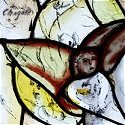
11.08.22 (Cheshvan 14, 5783) It is not your job to worry about all the problems in the world, nor is it your role to "fix" the troubles that abound everywhere. The upward call of God in Messiah is grounded in the present moment, the "eternal now," whence you are invited to "walk before God and be made whole" (הִתְהַלֵּךְ לְפָנַי וֶהְיֵה תָמִים, Gen. 17:1). This implies, among other things, that you must let evil flow past you and ascend by faith above the world and its profane ways. After all, it is God's business to turn darkness to light, to make crooked things straight, to redeem and heal the world and so on...
The eye of emunah (faith) discerns gam zu l'tovah (גַּם זוּ לְטוֹבָה), "this too is for good," which is an idea taken directly from the New Testament: "all things work together for good" (i.e., πάντα συνεργεῖ εἰς ἀγαθόν, Rom. 8:28). Notice that the affirmation is not gam zu tovah - "this is the good," but rather gam zu l'tovah - "this, too, is for good." Emunah "sees what is invisible" (2 Cor. 4:18) and understands that the "present form of this world is passing away" for purposes that are good (1 Cor. 7:31). It affirms that underlying the surface appearance of life (chayei sha'ah) is a deeper reality (chayei olam) that is ultimately real, abiding, and ultimately designed for God's redemptive love to be fully expressed. In this world we must "see through" a mirror (i.e., indirectly) to begin to see the dawn of our eternal home; but one day we will behold God panim el panim (פָּנִים אֶל־פָּנִים), "face to face" (1 Cor. 13:12).
The best way to engage in "tikkun olam" is to spread the hope and truth of the gospel to this world.... We do not look for utopia on earth apart from the Divine Presence.
Hebrew Lesson:
Prov. 11:25 Hebrew reading:
Meeting at Moriah...

[ The following entry is related to this week's Torah reading, parashat Lekh-Lekha.... ]
11.08.22 (Cheshvan 14, 5783) The phrase "lekh-lekha" (לֶךְ־לְךָ) is used in two places in the Torah: first, when God asked Abraham to leave everything behind to go (lekh-lekha) to a land where he would become a great nation that would ultimately bless the world (Gen. 12:1-3); and second, when God later asked Abraham to go (lekh-lekha) to the land of Moriah to offer up his beloved son as a burnt offering sacrifice (Gen. 22:2). There is a connection.
In the first case note that after Abraham left his homeland God led him to land of Canaan, directly to a "teaching tree" (אֵלוֹן מוֹרֶה) in Shechem (see Gen. 12:6). Some have said this "teaching tree" symbolizes the wisdom of Torah, the tree of life (עֵץ־הַחַיִּים) that brings happiness to those who take hold of it (Prov. 3:18), though it also symbolizes the cross of Yeshua, as we shall see.
In the second case note that "Moriah" (מֹּרִיָּה) means either the "Awe of the LORD" (i.e., מוֹרָא + יָהּ), the "Vision of the LORD" (i.e., רָאָה + יָהּ), or the "Teaching of the LORD" (i.e., מוֹרֶה + יָהּ) regarding the cross, or "the tree of atonement" (עֵץ־הַכַּפָּרָה), given in Yeshua our Messiah (the site of the Temple in Jerusalem was also called Moriah; see 2 Chron. 3:1). The Akedah, or the offering of Isaac, exemplified the meaning of sacrificial love, and indeed the word "love" (i.e., ahavah: אַהֲבָה) is first used in the Torah in this connection (Gen. 22:2). The offering of the lamb that God provided in exchange of Isaac (Gen. 22:13) pictures Yeshua the Passover Lamb of God (שֵׂה הָאֱלֹהִים) who was offered by the Father for the healing and deliverance of the world. And just as Isaac pictured the surrender of the son to the will of his father, so Abraham's willingness to give up his beloved son (בְּנוֹ יְחִידוֹ) reveals the passion of the Father's heart to give up everything for the sake of our salvation (John 3:16). So "lekh-lekha" - go for yourself - and receive the love of God given in Yeshua!
Hebrew Lesson:
Genesis 22:2 Hebrew Reading (click):
Clear Thinking Spirituality...
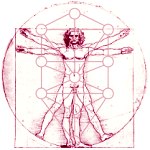
[ "As a man thinks in his heart so is he" not only embraces the whole of a man's being, but is so comprehensive as to reach out to every condition and circumstance of his life. A man is literally what he thinks, his character being the complete sum of all his thoughts." - James Allen ]
11.08.22 (Cheshvan 14, 5783) All our thinking is grounded in basic assumptions about what we think is real or true, though often we are unconscious about how they affect our reasoning and frame our understanding of things. Many of our foundational beliefs were uncritically accepted by us when we were children through cultural osmosis, though some beliefs are common to all cultures, for example the moral axiom that murder is wrong, the aesthetic axiom that order is better than chaos, the metaphysical axiom that there is an external world, the epistemological axiom that knowledge is possible, the logical axiom that nothing can both be and not be at the same time in and in the same respect, and so on.
The first step to thinking clearly is to identify our own assumptions and how they "filter" or interpret what we believe is true or real. Some have likened what we know in terms of a "treelike" structure of meaning. The fundamental assumptions provide the the ground that upholds the structure or the tree. Others have likened the interconnections between our ideas as a sort of "web of belief," and the practice of thinking about our thinking can help us better understand the connections between the whole and its parts.
 |
The importance of clearly defining our terms cannot be overestimated, for unless we are clear about what we are talking about, we likely will be muddled in our thinking. The classical way to define something is by means of identifying what general class of being it belongs to and then describing its distinctive characteristics that mark it off as a subset of that general class. This is the "genus [differentia] - species" approach of definition. A standard example is the definition of a "lake" (species) as a "body of water" (genus) that is "large (i.e., having more than one acre of water surface area) that is landlocked" (difference). Another example is a "triangle" (species) is a "plane figure" (genus) that has "three straight bounding sides" (difference). On the other hand, to define an "elephant" as "a large animal with big ears" would be insufficient because its differences are incomplete and not unique to that species (a kangaroo, for example is also a large animal with big ears). The basic requirement of a sound definition is that the list of differentiating characteristics be semantically equivalent to the term being defined. "The person who says he knows what he thinks but cannot express it usually does not know what he thinks" (Mortimer Adler).
Using this approach to define what a human being is, we first think of what class it belongs to (genus) and then enumerate its distinctive characteristics. If we understand the human being to belong to the collective class of beings called "animals" (or mammals), we then must qualify the generalization to demarcate what makes a human being different from all other animals, and thereby we identify various distinctive qualities such as self-conscious awareness, the presence of intelligence, the ability to use symbolic languages, the awareness of intuitions of logic, morality, beauty, spirituality, and so on. A paradigmatic human being, then, is essentially a self-conscious thinking and spiritual being. On the other hand, to define a human being as "an individual of the species of primate mammal that walks on two feet and is evolutionarily related to the great apes" is a flawed definition since not all humans walk on two feet, and the metaphysical speculation that human beings deterministically "evolved" from lower life forms is not based on empirical evidence and sound logical inference.
"Why is there something rather than nothing" is a question, among many others, that science cannot answer. Scientific knowledge assumes the validity of measurement, the regularity of time, the idea that the future will "resemble" the past, and so on, but it does not concern itself with the root cause of being itself, for that is a metaphysical concern. After all, science is based on inductive reasoning, that is, reasoning that involves drawing a general conclusion from a set of specific observations. Inductive reasoning is limited by the scope and integrity of its data collection and assumes that, in David Hume's words, "instances of which we have had no experience will resemble those of which we have had experience." Science must assume the "uniformity of nature," or the faith that the future will resemble the past, in order to hypothesize "laws of nature."
The Jewish-Christian definition of a human being derives from the theological axiom that a personal God created all that exists and that he especially created mankind in his own image and likeness. The very first principle of the Torah is that the LORD (יהוה), the personal and speaking Supreme Being, created and continues to sustain everything in existence, and that he made the human being in his own image (צֶלֶם) and likeness (דְּמוּת), by imparting the "breath of life" (נִשְׁמַת חַיִּים) that animates the "neshamah," or soul. The image of God has to do with our intrinsic spirituality, our inherent dignity and value, our ability to discern good from evil, our ability to think, to value, and to love. The truth of God as our personal Creator is absolutely basic and existentially all-encompassing. It is both the foundation and the cornerstone of any structure of knowledge whatsoever...
Another axiom of thought is that death, pain, and evil exist and therefore the human condition is problematic. Though God created us to be "mirrors" of the divine, because of our sin the mirror has been shattered, and the image of God within us has been radically disfigured. Our sin has led to the condition of "spiritual death," that is, separation from God who is the Source of life. The gospel is the story of how God heals us from our lethal and estranged estate through the mediation of Yeshua, the Savior who willingly "entered into" our lost condition and tasted death for every human being upon the cross. His resurrection from the dead vindicates his healing for us and marks a new beginning for lost humanity. As we turn to God in teshuvah (repentance) we are being restored to God as the source of eternal life.
Hebrew Lesson
Proverbs 23:7a reading (click):
In the Book of Proverbs we read, "As a person thinks (or judges) in his heart, so is he" (Prov. 23:7), and this is similar to the principle of reciprocity taught by Yeshua, for instance: "as you measure so shall be measured back again to you," and ""according to your faith let it be for you" (Matt. 9:29, Luke 6:38). How we think within our hearts determines the direction and destiny of our lives. Yeshua taught that as we forgive others, so we will be forgiven; as we judge others, so we will be judged; and as we give, so we will be given.€ť Since our thinking is essential to our spiritual formation, we have a duty not to abuse our minds by deceiving ourselves and to think elevated and worthy thoughts (Col 3:1-2; James 1:26; Phil. 4:8). "For God, who commanded the light to shine out of darkness, has shined in our hearts, to give the light of the knowledge of the glory of God in the face of Yeshua the Messiah" (2 Cor. 4:6). Amen. Take every thought captive to the love of God for you, chaverim (2 Cor. 10:5).
 |
|























